YEAR BOOK

of The Holiness Union: A Report of the Annual Convention Held at Atlanta, GA., October 24-29, 1906
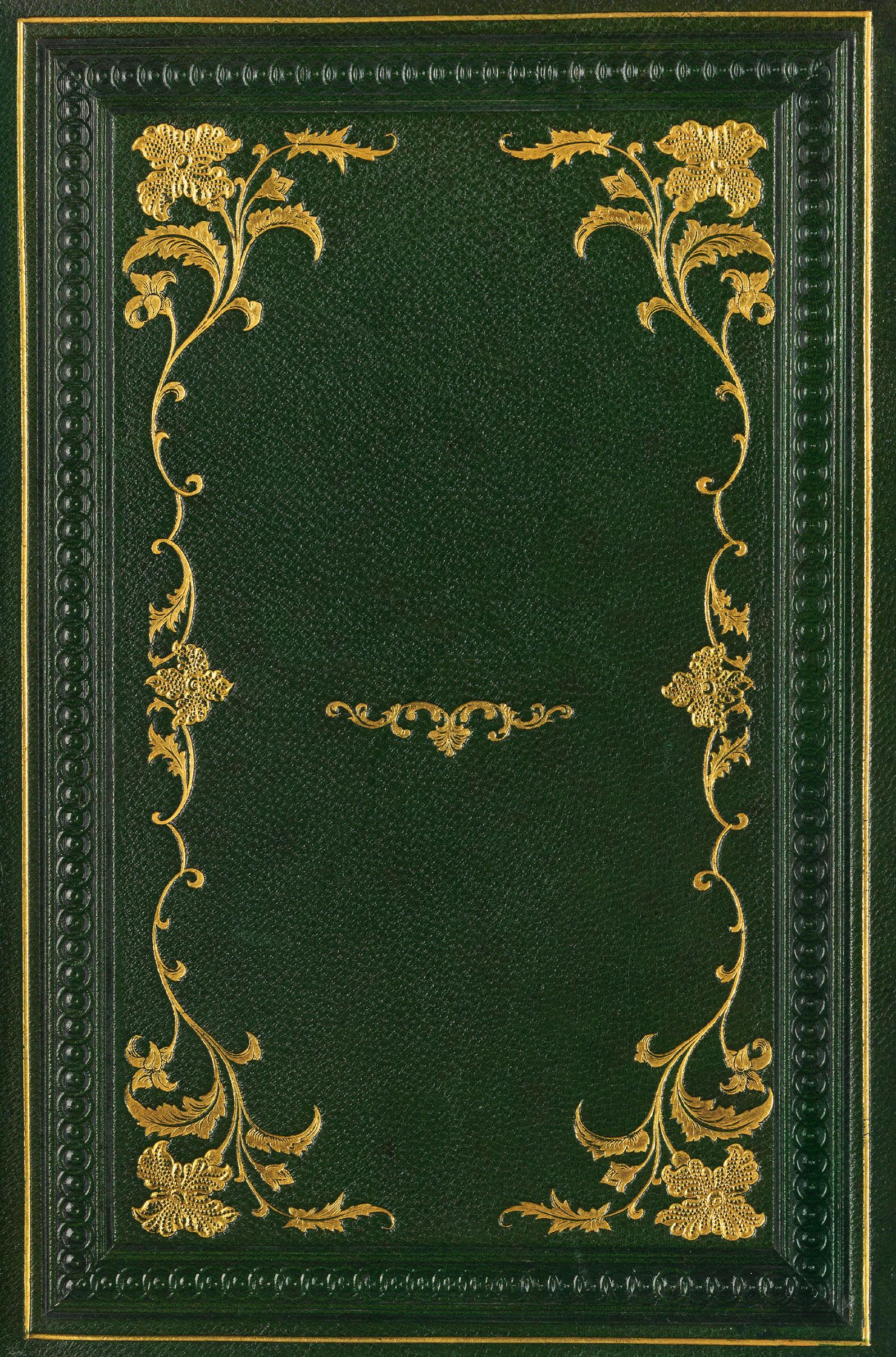


of The Holiness Union: A Report of the Annual Convention Held at Atlanta, GA., October 24-29, 1906

9781648171499
Year book of the Holiness Union : a report of the annual convention held at Atlanta, GA., October 24-29, 1906
Compiled by H.W. Bromley. Published in the U.S.A. by First Fruits Press, ©2023. Digital version at https://place.asburyseminary.edu/firstfruitsheritagematerial/214/
First Fruits Press is a digital imprint of the Asbury Theological Seminary, B.L. Fisher Library. Asbury Theological Seminary is the legal owner of the material previously published by the Pentecostal Publishing Co. and reserves the right to release new editions of this material as well as new material produced by Asbury Theological Seminary. Its publications are available for noncommercial and educational uses, such as research, teaching and private study First Fruits Press has licensed the digital version of this work under the Creative Commons Attribution Noncommercial 3.0 United States License. To view a copy of this license, visit http://creativecommons.org/licenses/by-nc/3.0/us/
For all other uses, contact:
First Fruits Press
B.L. Fisher Library
Asbury Theological Seminary
204 N. Lexington Ave. Wilmore, KY 40390

http://place.asburyseminary.edu/firstfruits
Year book of the Holiness Union : a report of the annual convention held at Atlanta, GA., October 24-29, 1906 [electronic resource]/ compiled by H.W. Bromley. –Wilmore, Kentucky : First Fruits Press, [2023].
1 online resource (116 p. : port.) : digital.
ISBN: 9781648171482 (paperback)
ISBN: 9781648171499 (uPDF)
ISBN: 9781648173004 (Mobi)
OCLC: 1356972979
204 North Lexington Avenue
Wilmore, Kentucky 40390
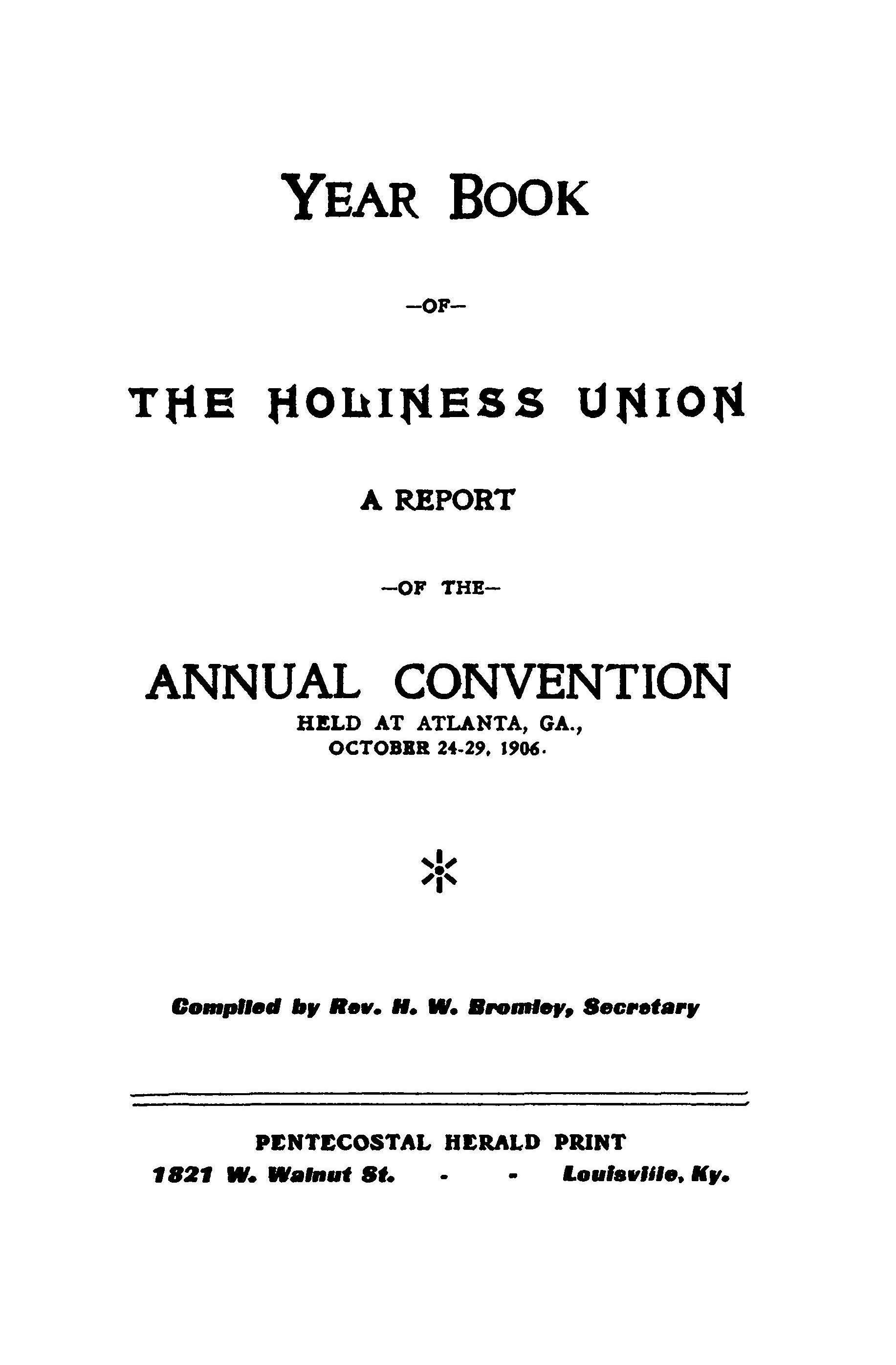
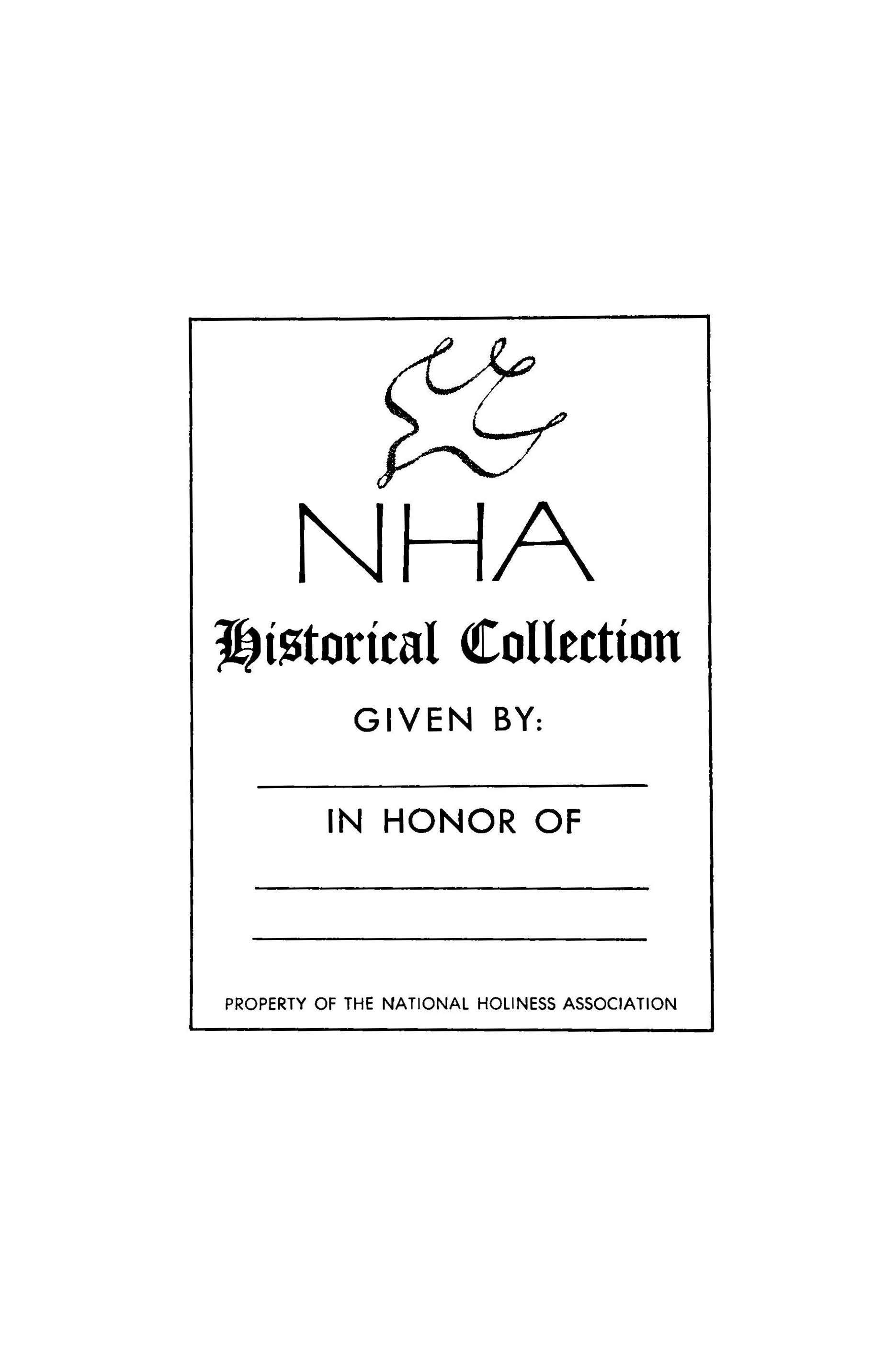
BY: IN HONOR OF
PROPERTYOF THE NATIONAL HOLINESS ASSOCIATION
L. L. Pickett.
For One Year.
H. C. Morrison.
(Term Expiring 1907.)
For Two Years.
(Terms Expiring 1908.)
For Three Years.
C. M. Keith.
J. S. Sanders.
John Paul.
W. P. B. Kinard.
(Terms Expiring 1907.)
For Four Years.
(Terms Expiring 1908.) * * * * OFFICERS.
L. P. Brown.
L. P. Brown ............................. President
L. L. Pickett .................. First Vice-President
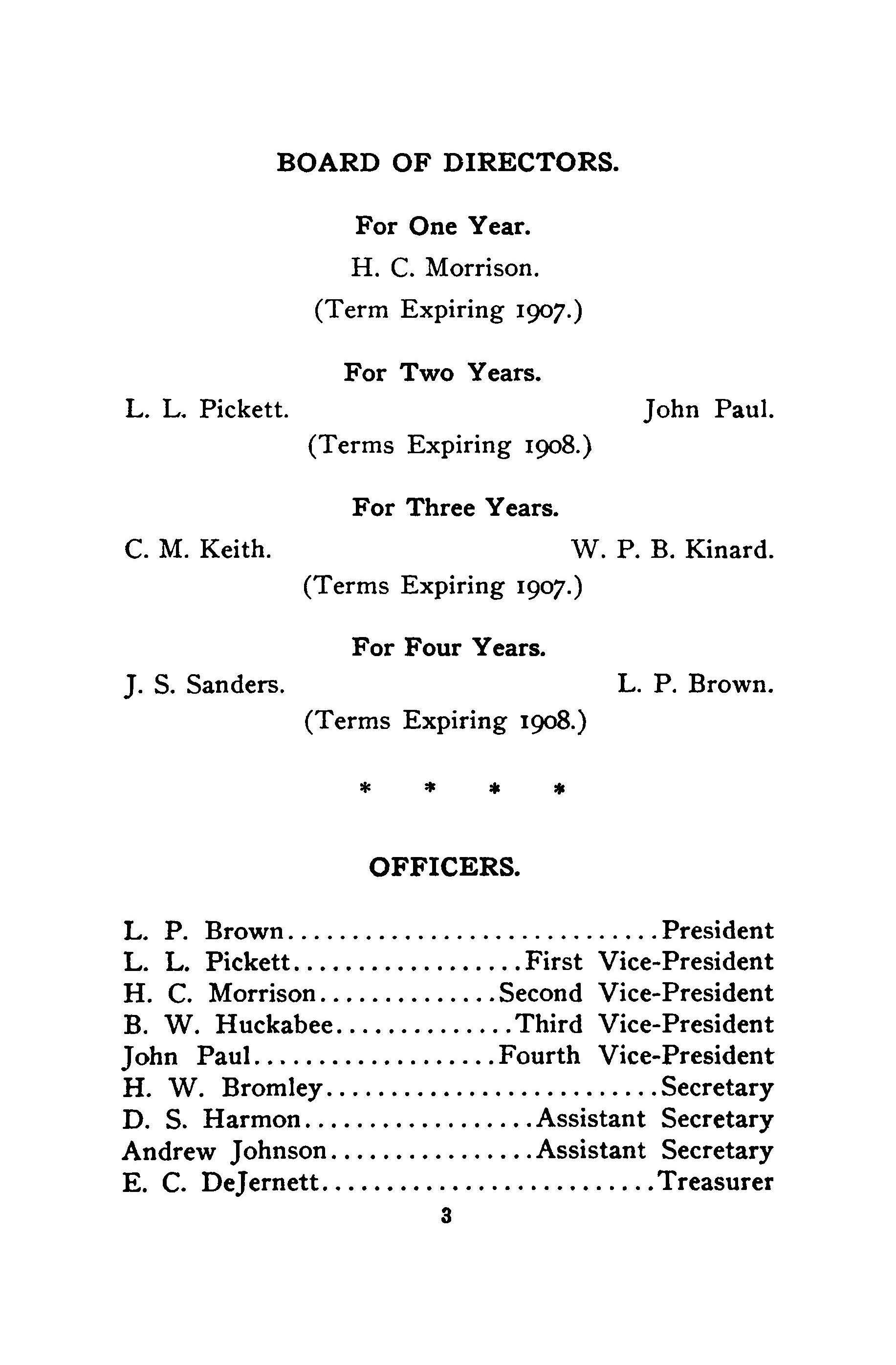
H. C. Morrison .............. Second Vice-President
B. W. Huckabee .............. Third Vice-President
John Paul. .................. Fourth Vice-President
H. W. Bromley .......................... Secretary
D. S. Harmon .................. Assistant Secretary
Andrew Johnson ................ Assistant Secretary
E. C. DeJ ernett .......................... Treasurer
L. P. Brown.
H. C. Morrison.
John Paul.
L. L. Pickett.
B. W. Huckabee.
H. W. Bromley.
E. C. DeJernett.
BOARD OF MISSIONS.
L. P. Brown, Ch'm. & Treas. B. F. Haynes, Sec'y.
H. C. Morrison.
M. A. Beeson.
W. P. B. Kinard.
C. M. Dunaway.
J. S. Sanders.
COMMITTEE ON MEMBERSHIP.
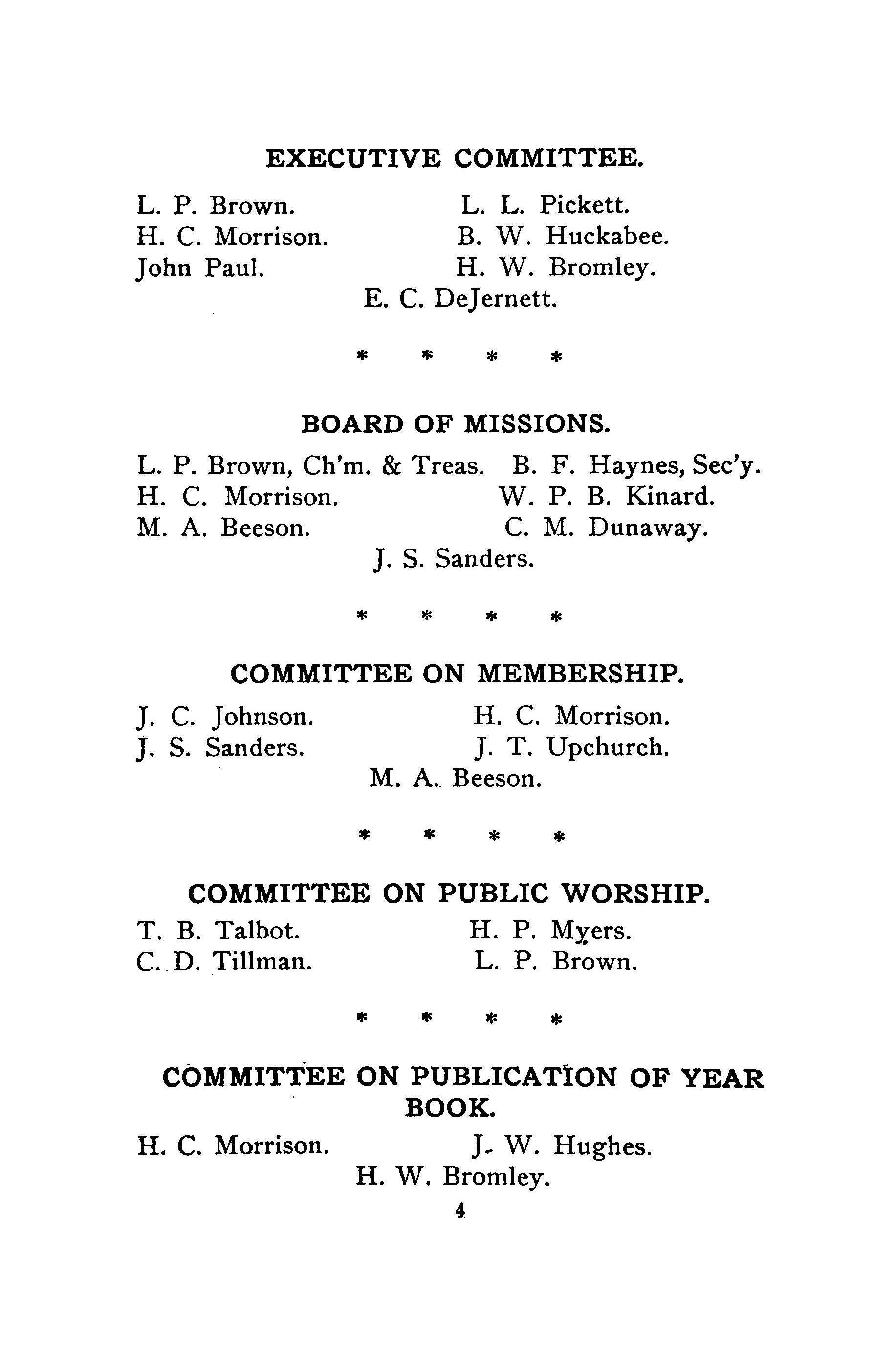
J. C. Johnson.
J. S. Sanders.
H. C. Morrison.
J. T. Upchurch.
M.A .. Beeson.
COMMITTEE ON PUBLIC WORSHIP.
T. B. Talbot.
C .. D. Tillman.
H.P. Mxers.
L. P. Brown.
COMMITTEE ON PUBLICATION OF YEAR BOOK.
H. C. Morrison.
J- W. Hughes.
H. W. Bromley.
COMMITTEE ON FINANCE.
A. T. Nelson.
H. W. Bromley. J. W. Beeson.
COMMITTEE ON TEMPERANCE.
B. W. Huckabee. J. W. Hughes. R. A. Breeland.
PROGRAMME COMMITTEE.
H. C. Morrison.
B. F. Haynes. J. W. Beeson.
COMMITTEE ON ORGANIZING STATE AND COUNTY UNIONS.

B. W. Huckab.ee. John Paul. J. S. Sanders. * * *
COMMITTEE ON RESOLUTIONS.
The Third Annual Convention of The Holiness Union, which met in Atlanta, Ga., October 24-29, 1906, was an eminently successful meeting. Rev. Len G. Broughton, D. D., and his congregation kindly gave us the use of their large Tabernacle Church.

The attendance was large, the Christian fellowship beautiful, and the presence of the Holy Ghost, in saving and sanctifying power, was very manifest. The business of the Convention was dispatched without contention, or debate; a number of excellent papers were read before the body, which will be found in this "Year Book," and much time was given to prayer, praise. preaching and earnest work at the altar, leading souls into the blessed experience of "entire sanctification."
The committee appointed to bring out this little volume find it impossible to put the soul, the joy, the holy enthusiasm of the Convention on paper. To realize the blessedness of such an occasion one must be present, and participating. First and last, thousands of people attended the meetings at the Tabernacle; many ministers of Atlanta and surrounding country, were present, and many churches in the city were opened to us, thus the word of full salvation in the blood of our glorified Christ was preached to a great multitude of people.
It is the purpose and prayer of the holiness people to come together once a year, with one accord in one place, that we may preserve harmony in doctrine, 6
union of heart and purpose, but above all that we may be filled again and again with the Holy Ghost, and bring before the people of some great city each year in a most impressive way the great doctrine of full salvation.
We send out this little booklet, hoping it may prove a blessing to the many who could not attend this Convention, but whose faith and prayers were with us. The Holiness Movement is in its infancy; God has set before it an open door which no man can shut, let us gird ourselves afresh for the spreading abroad of the good news of a free and full salvation for all men from all sin. One of the most interesting f ea tu res of the Convention was the deep interest manifested in foreign mission work. The reports brought in by those who have been abroad were most encouraging; a large collection was taken for the extension of the work, and a score of spirit-filled young people offered themselves for the spreading of the full-salvation gospel over the seas.
With new courage for our work, with an increased faith in our all-conquering Christ, and an enlarged love for all who love Him, and for all whom He loves, we bid all Christians God-speed, and press forward in the glorious Holiness Movement.
Rev. H. C. Morrison, Rev. J. W. Hughes, Rev. H. W. Bromley.
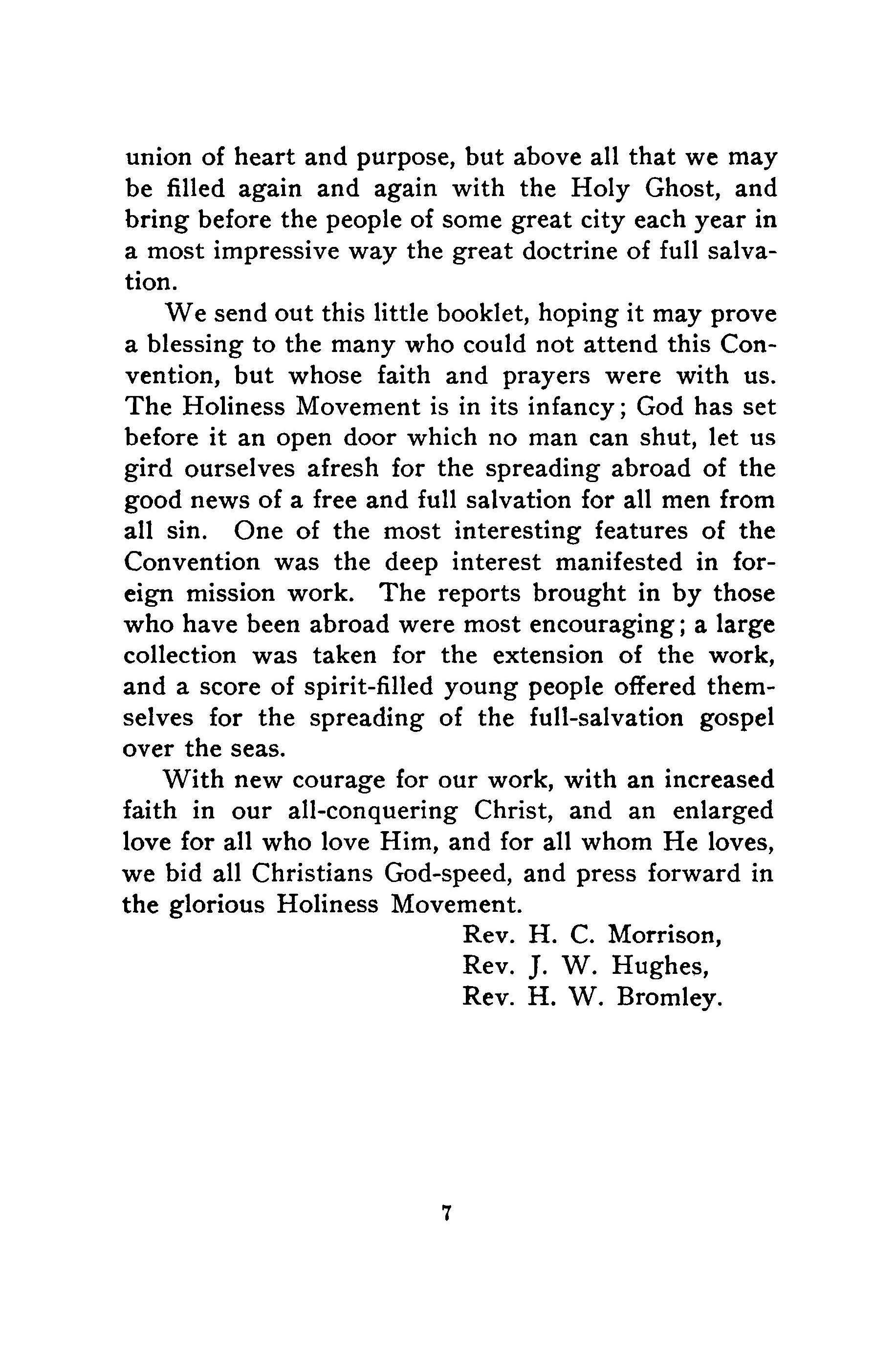
The next great Convention of the Holiness Union will be at Louisville, Ky., October 23-27, 1907.
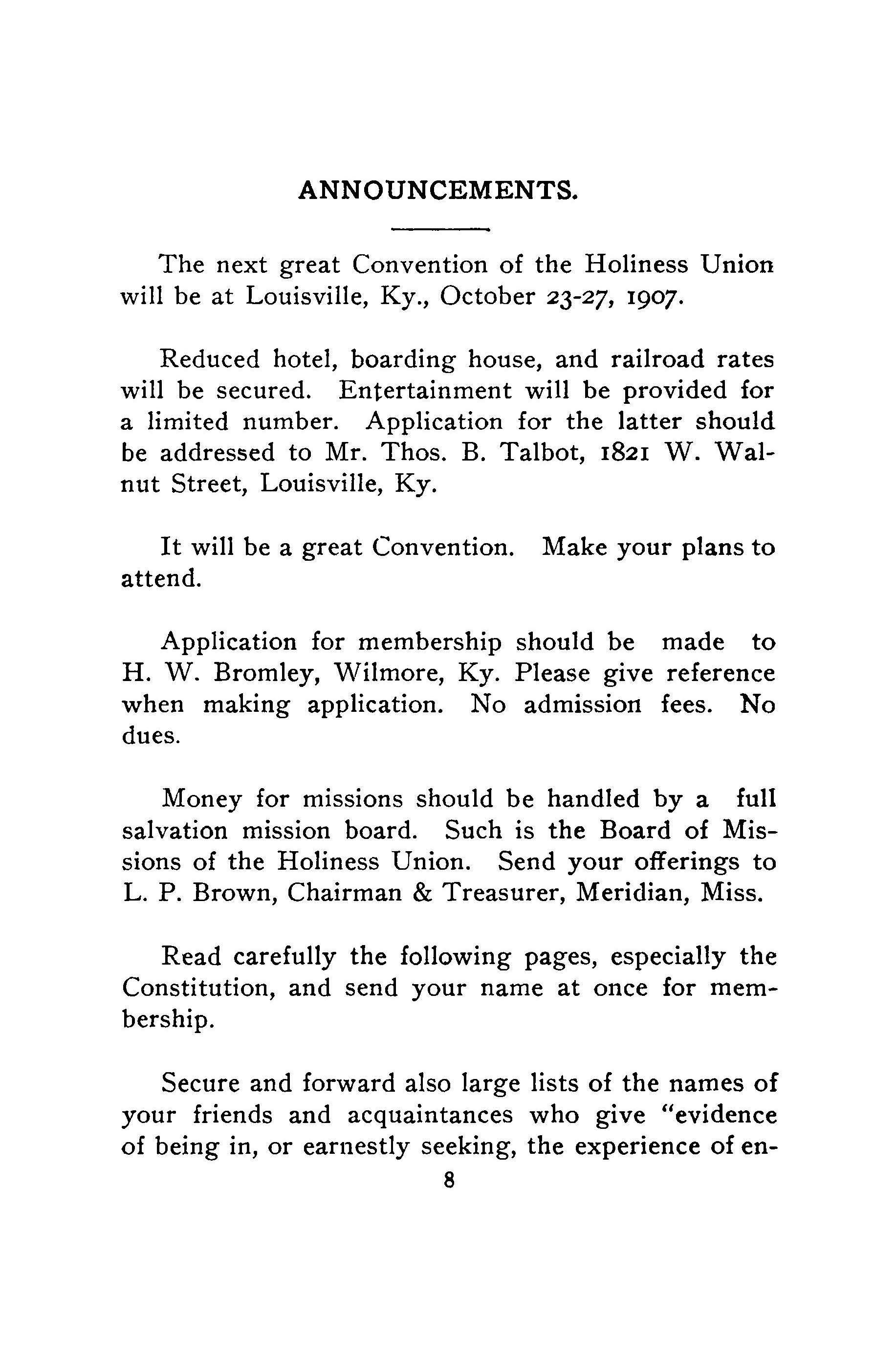
Reduced hotel, boarding house, and railroad rates will be secured. Entertainment will be provided for a limited number. Application for the latter should be addressed to Mr. Thos. B. Talbot, 1821 W. Walnut Street, Louisville, Ky.
It will be a great Convention. Make your plans to attend.
Application for membership should be made to H. W. Bromley, Wilmore, Ky. Please give reference when making application. No admission fees. No dues.
Money for m1ss1ons should be handled by a full salvation mission board. Such is the Board of Missions of the Holiness Union. Send your offerings to L. P. Brown, Chairman & Treasurer, Meridian, Miss.
Read carefully the following pages, especially the Constitution, and send your name at once for membership.
Secure and forward also large lists of the names of your friends and acquaintances who give "evidence of being in, or earnestly seeking, the experience of en-
tire sanctification," and who desire admission into this great Holiness Association.
There should be auxiliary Unions in every State, city, town, and county in the South. They will be the means of strength for the sanctified and of salvation and sanctification to others.
If you want a local union organized in your community, write Rev. John Paul, 1821 W. Walunt St., Louisville, Ky., at once. He is one of the committee whose business is to respond to such calls.

I. Divine Worship.
2. Reading of Minutes.
3. Call, and Perfection of Roll, and Reception of Members.
4. Appointment of Committees.
5. Unfinished business.
6. Receiving Communications Greetings.
7. Reports of Committees.
8. New Business.
and Fraternal

CONSTITUTION. Preamble.
The Holiness Union is an interdenominational organization not claiming to be a church, or to take the place of existing holiness organizations, but seeking to bring all holiness people into closest sympathy and union.
Article L-N ame.
The name of this Association shall be The Holiness Union.
Article IL-Purpose.
The purpose of this organization shall be to bring together and unify all holiness people, to spread a full gospel, and to teach the whole Bible.
We accept the Bible as our rule of faith and practice.
We belive in God, the Father Almighty, maker of heaven and earth; in Jesus Christ, His only Son, our Lord, who was conceived by the Holy Ghost, born of the Virgin Mary, suffered under Pontius Pilate, was crucified, dead and buried; that the third day He rose again from the dead; that He ascended into heaven and sitteth at the right hand of God, the Father Al10
mighty; from thence He shall come to judge the quick and the dead. We believe in the Holy Ghost, the Church of our Lord Jesus Christ, the communion of saints, forgiveness of sins, resurrection of the body, and the life everlasting.
We believe in conviction, wrought by the Holy Ghost; in repentance, evidenced by godly sorrow, forsaking sin, and, so far as possible, making restitution; in justification by faith, and its concomitants, regeneration and the witness of the Spirit; in holiness or entire sanctification; that it is an instantaneous work of cleansing, obtained by faith, subsequent to regeneration, accomplished by the Holy Ghost.
We believe in the immortality of the soul, the eternal punishment of the finally impenitent, and the eternal reward of the finally faithful.

Sec. I. This Union shall be composed of individuals, bands, unions, county, district, and State associations, holiness churches, and members of any denomination, who, as individuals, hold to and promulgate the statement of doctrine adopted by this Union, and who shall make application for membership, and are received by a majority vote of the members of the Union present, they giving evidence of being in, or earnestly seeking, the experience of entire sanctification. When one ceases to give evidence of being in, or earnestly seeking, the experience of sanctification, such a person is no longer a member of this organization.
Sec. 2. The auxiliary and other ogranizations, and individuals above mentioned, shall have the privilege
of becomiI).g members of the Union any time during the interim between annual sessions, by submitting their names to the Secretary, satisfactory reference to be furnished, in case the application is made by an individual. These additions must be confirmed by a majority vote of the next annual session of the Union.
Sec. 3. The secretaries of the above named organizations shall be requested to forward to the Secretary of this Union, at their earliest convenience after their annual sessions, the number of members, with the names and addresses of all officers and delegates. Individual members shall report in person or by letter at each annual meeting.

The President, Vice-President, Secretary and Treasurer shall be elected annually by ballot.
The terms of office of the Directors shall be four years; one to be elected for one year, two for two years, two for three years, and two for four years, by ballot, upon the nomination of the Executive Committee.
The President shall have general oversight of the work, and preside in all business meetings. The VicePresidents shall preside in the absence of the President, and assist in the work when necessary.
The Secretary shall have charge of all records, shall record the proceedings of all business meetings, and attend to the correspondence of the Union.
The Treasurer shall have charge of all money belonging to the Union. He shall keep a plain book account of all amounts received, from whatever source, and for whatever purpose paid out. All money shall
be subject to the order of the Union. He shall make a written report at each regular meeting of the Union.
The Directors shall hold in trust all property of the Union, except money, subject to the order of the Union.

The President, the Vice-Presidents, the Secretary and Treasurer of the Union shall constitute its Executive Committee, who shall have power to call special meetings of the Union, and transact other necessary business in the interim of the meetings.
The annual meeting of this Union shall convene at 9 a. m., on Wednesday before the fourth Sunday in October of each year.
This constitution may be amended upon a twothirds vote of all members of the Union present in any of its annual meetings.
The Third Annual Convention of the Holiness Union met in Atlanta, Ga., October 24, 1900. The sessions and services were held in the Tabernacle church, Rev. Len G. Broughton, pastor.
The first devotional service was held at 8 o'clock. It was largely attended. The power of the Holy Ghost was remarkably manifested. The true Spirit of Pentecost was upon the people. They wept, praised God, and embraced one another with joy.
The business session was called to order at 9 o'clock with L. P. Brown, of Mississippi, President, in the chair.
The following Committees were appointed:
COMMITTEE ON CREDENTIALS.
J. C. Johnson.
J. S. Sanders.
H. C. Morrison.
J. T. Upchurch.
M. A. Beeson.
COMMITTEE ON PUBLIC WORSHIP.
T. B. Talbot.
C. D. Tillman.
H. P. Myers.
L. P. Brown.
COMMITTEE ON RESOLUTIONS.
B. F. Haynes.
J. W. Beeson. E. C. De] ernett.
COMMITTEE ON TEMPERANCE.
B.

Rev. H. C. Morrison made the following timely remarks with reference to the advantages of membership in the Union:
I. The bringing together of a large number of holiness people in some center of population once a year for a gracious revival of religion; thus bringing the doctrine and experience of holiness before the churches and community.
2. It keeps us in close fellowship one with another.
3. It will preserve unity in clear teaching on the essential doctrines of regeneration and entire sanctification.
4. It saves our people from being drawn off by irresponsible parties into an ephemeral organization.
5. It combines our efforts in missionary evangelism.
The minutes of the last session at Meridian, Miss., were read and approved.
After reading the programme of the day, and the singing of "Jesus, Lover of My Soul," the President delivered his annual address, in which he stressed the importance of Bible methods, and dependence on the leading of the Holy Spirit.
The Doxology was sung, which was expressive of the high tide of spiritual fervor, after which, J. S. Sanders, of Louisiana, read a paper on "The Necessity of Union in Holiness Work."
This was followed by well chosen remarks by W.W. McCord, of Georgia.
Following this was a sermon by that unique character of the religious world, Rev. Bud Robinson, of Texas. The sermon was full of sparkling thought and divine unction.

The people laughed and shouted for joy. The long altar was well filled and a number were graciously saved.
Session of vVednesday afternoon, October 24, 19()6.
After the praise service, the Business Session was opened with prayer by E. C. DeJernett, of Texas, after which a paper was read by J. C. Johnson, of Kentucky, on "Some Present Needs of the Holiness Movement."
This was followed with remarks by L. L. Pickett and H. C. Morrison.
J. W. Hughes, President of Kingswood College, Harned, Ky., then read a paper on "Some Hindrances to the Holiness Movement."
A paper on "Holiness and the Race Problem" was next read by W. P. B. Kinard, of South Carolina.
B. F. Haynes, President of Asbury College, Wilmore, Ky., followed with appropriate remarks. H. C. Morrison offered the following resolution which was adopted:
Resolved, That we hereby declare that in the future, as in the past, it will be the pleasure of the members of this Union to preach holiness to our colored people as often as the opportunity may offer.
Remarks on the same line were made by E. C. DeJernett, B. W. Huckabee and L. P. Brown.
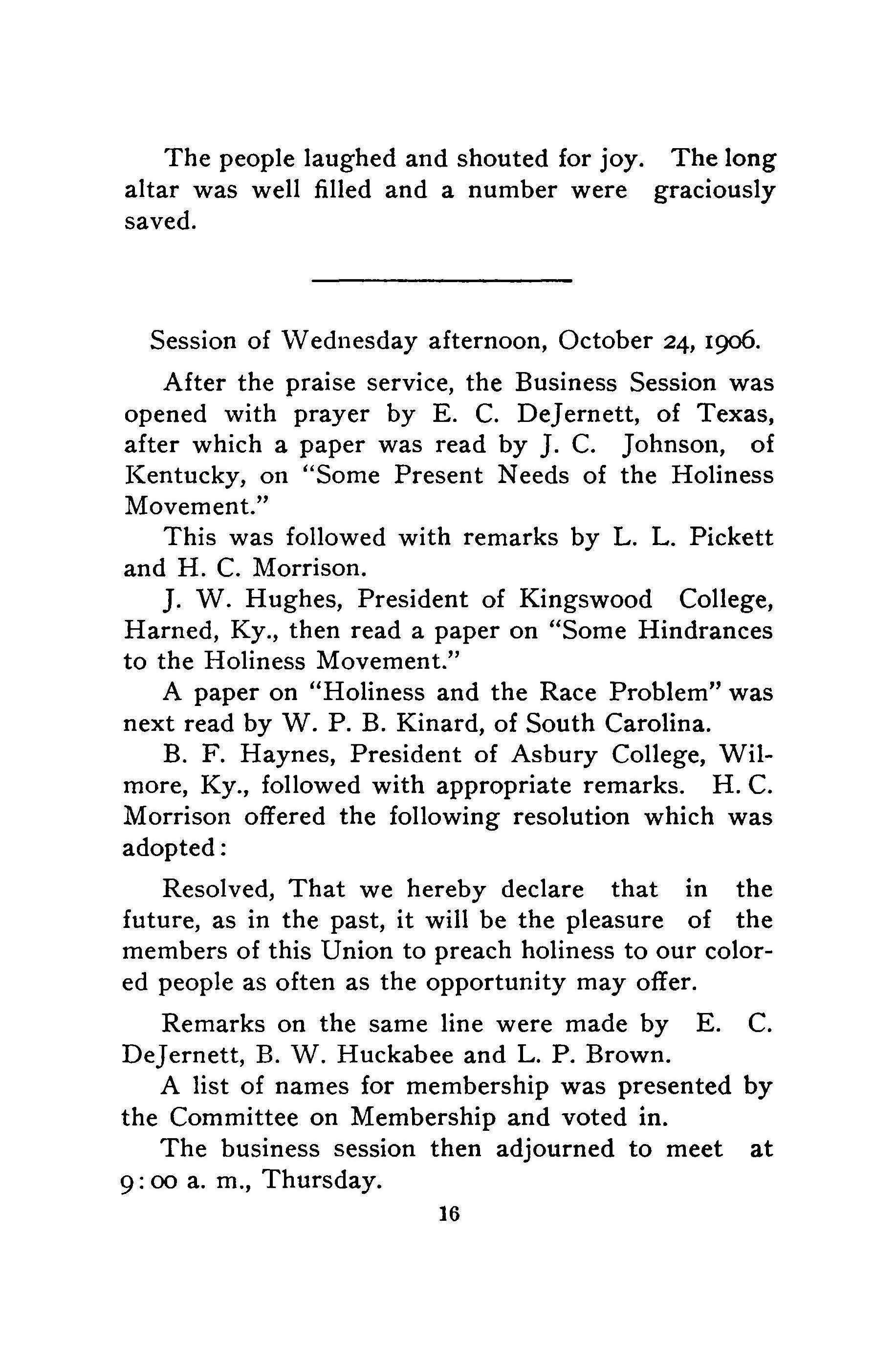
A list of names for membership was presented by the Committee on Membership and voted in.
The business session then adjourned to meet at 9: oo a. m., Thursday.
After a number of street services, a large audience gathered in the Broughton Tabernacle to whom Rev. H. C. Morrison preached a strong sermon from the text: "For other foundation can no man lay than that is laid, which is Je!;us Crist." (r Cor. 3: rr.) Brother Morrison discussed the fundamental principles on ·which rests the great doctrine of entire sanctification, showing that the holiness people have an indestructible foundation for their faith, experience, and teaching, and that this doctrine is practically in accord with all the evangelical churches.
At the close of the sermon perhaps not less than one hundred and fifty people stood for prayer. The altar was more than filled and a wonderful salvation time followed.

The 8 o'clock praise and testimony service was truly characteristic of an old-time revival. The business session opened at 9: oo a. m., with the President in the chair.
The minutes of the preceding session were read, corrected, and adopted. A paper on "Holiness in I ts Relation to Service for Others," was read by E. C. DeJ ernett, of Texas. The discussion was led by Andrew Johnson, of Kentucky.
B. F. Haynes then read an excellent paper on "Christian Socialism."
H. C. Morrison followed with an earnest address. The testimony service completed the programme, the business session merging into the preaching hour.
Rev. W. H. Huff, of Iowa, brought the message, which was fervent, thoughtful, and unctious. A blessed altar service followed.
Session of Thursday afternoon, October 25, 19o6.
The afternoon praise service was an appropriate forerunner of the business session, which convened at 2: 30.
The Convention was led in prayer by J. B. Kendall, of Kentucky.
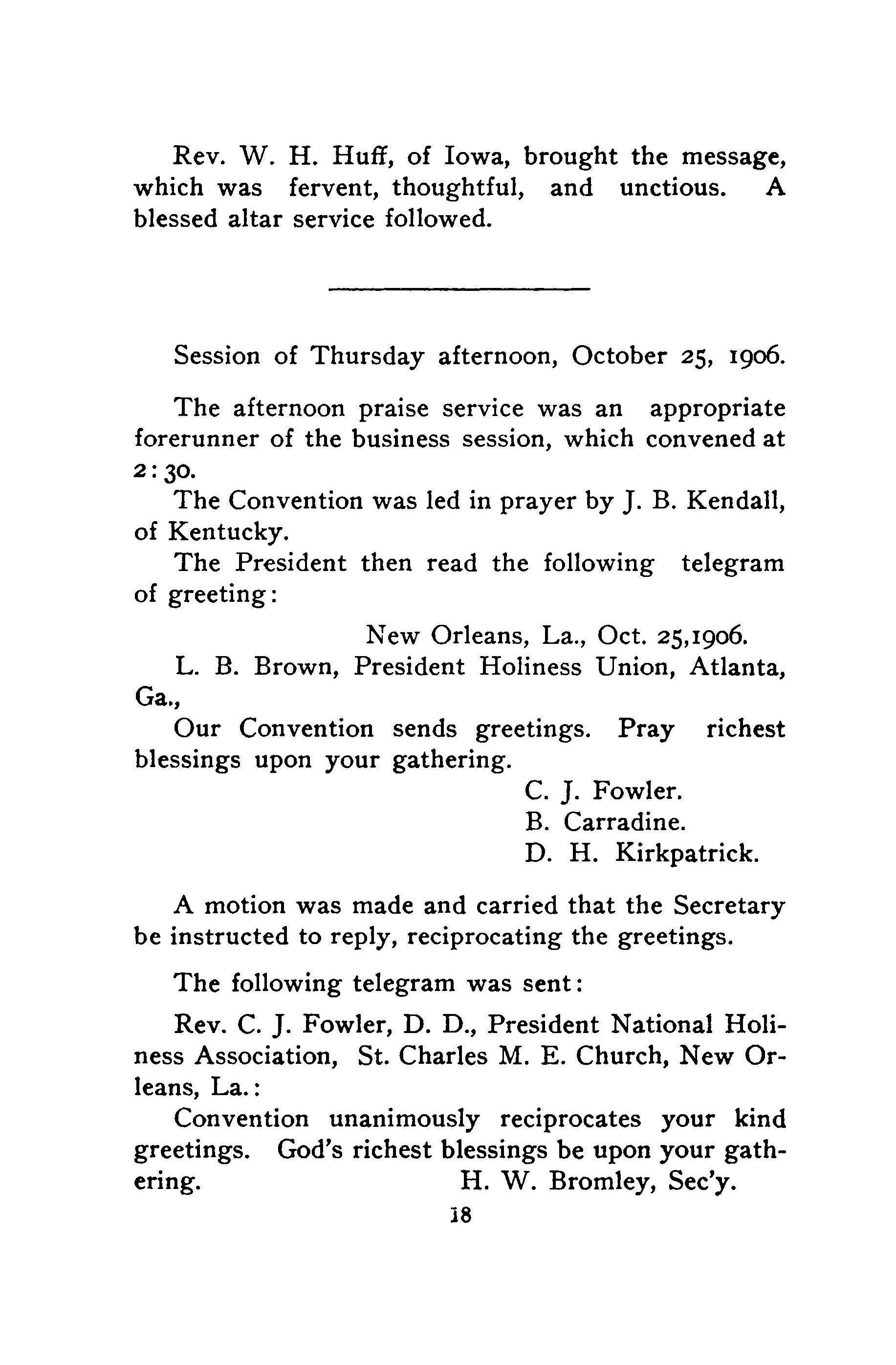
The President then read the following telegram of greeting :
New Orleans, La., Oct. 25,1906.
L. B. Brown, President Holiness Union, Atlanta, Ga.,
Our Convention sends greetings. Pray richest blessings upon your gathering.
C. J. Fowler.
B. Carradine.
D. H. Kirkpatrick.
A motion was made and carried that the Secretary be instructed to reply, reciprocating the greetings.
The following telegram was sent:
Rev. C. J. Fowler, D. D., President National Holiness Association, St. Charles M. E. Church, New Orleans, La.:
Convention unanimously reciprocates your kind greetings. God's richest blessings be upon your gathering. H. W. Bromley, Sec'y.
The minutes of the morning session were read and approved.
J. T. Upchurch, of Texas, then delivered an address on "Rescue Work."
A paper on "The Spread on Holiness Literature and Its Results," was read by L. L. Pickett, of Kentucky.
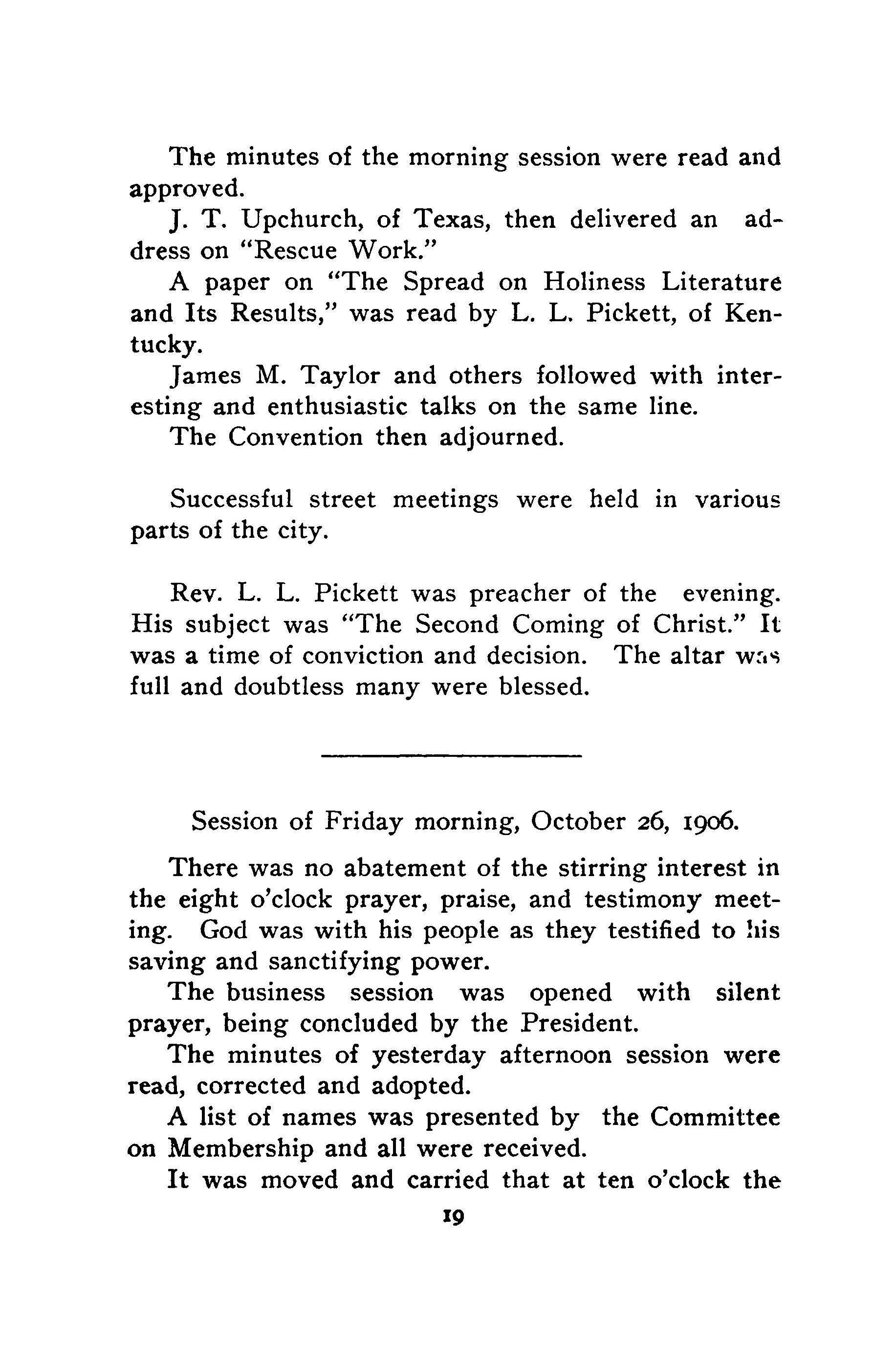
James M. Taylor and others followed with interesting and enthusiastic talks on the same line. The Convention then adjourned.
Successful street meetings were held m various parts of the city.
Rev. L. L. Pickett was preacher of the evening. His subject was "The Second Coming of Christ." It was a time of conviction and decision. The altar w:-.-, full and doubtless many were blessed.
Session of Friday morning, October 26, 1go6.
There was no abatement of the stirring interest in the eight o'clock prayer, praise, and testimony meeting. God was with his people as they testified to his saving and sanctifying power.
The business session was opened with silent prayer, being concluded by the President.
The minutes of yesterday afternoon session were read, corrected and adopted.
A list of names was presented by the Committee on Membership and all were received.
It was moved and carried that at ten o'clock the 19
Convention proceed to the election of officers for the ensuing year.
Upon motion, J. W. Hughes, H. C. Morrison, and H. W. Bromley were appointed a Committee for the publication of the year book.

J. W. Beeson, Chairman of the Finance Committee, moved that the yearly allowance of the Secretary be fixed at one hundred dollars. The Secretary presented a statement of his expenses during the past year.
At the suggestion of the Chairman of the Committee, a collection was taken to defray these expenses. Convention then proceeded to the election of officers.
The ballot for President was first taken.The results of the vote were read, and L. P. Brown announced as elected, receiving one hundred and fortyfive votes out of one hundred and sixty-six registered.
A motion was made and carried that the Secretary cast the ballot for the Vice-Presidents as follows:
L. L. Pickett, First Vice-Pres.
H. C. Morrison, Second Vice-Pres.
B. W. Huckabee, Third Vice-Pres.
John Paul, Fourth Vice-Pres.
The President was instructed to cast the ballot for H. W. Bromley as Secretary, which was done. By permission the Secretary appointed B. S. Harmon and Andrew Johnson his Assistants.
On motion the Secretary was instructed to cast the ballot for the three directors whose terms expired this year. The following were elected:
H. C. Morrison, (Term expiring 1907).
L. L. Pickett, (Term expiring 19o8).
John Paul, (Term expiring 19()8).
The business session merged in to the preaching hour. Rev. B. W. Huckabee, of Texas, brought an earnest message of salvation to the sinner, sanctification to the believer, and encouragement to those in experience of full salvation.
An excellent altar service followed in which a good number were blest.
Session of Friday afternoon, October 26, 1go6.
After a splendid praise service, the President called the Convention to order.
The minutes of the morning session were read and adopted.
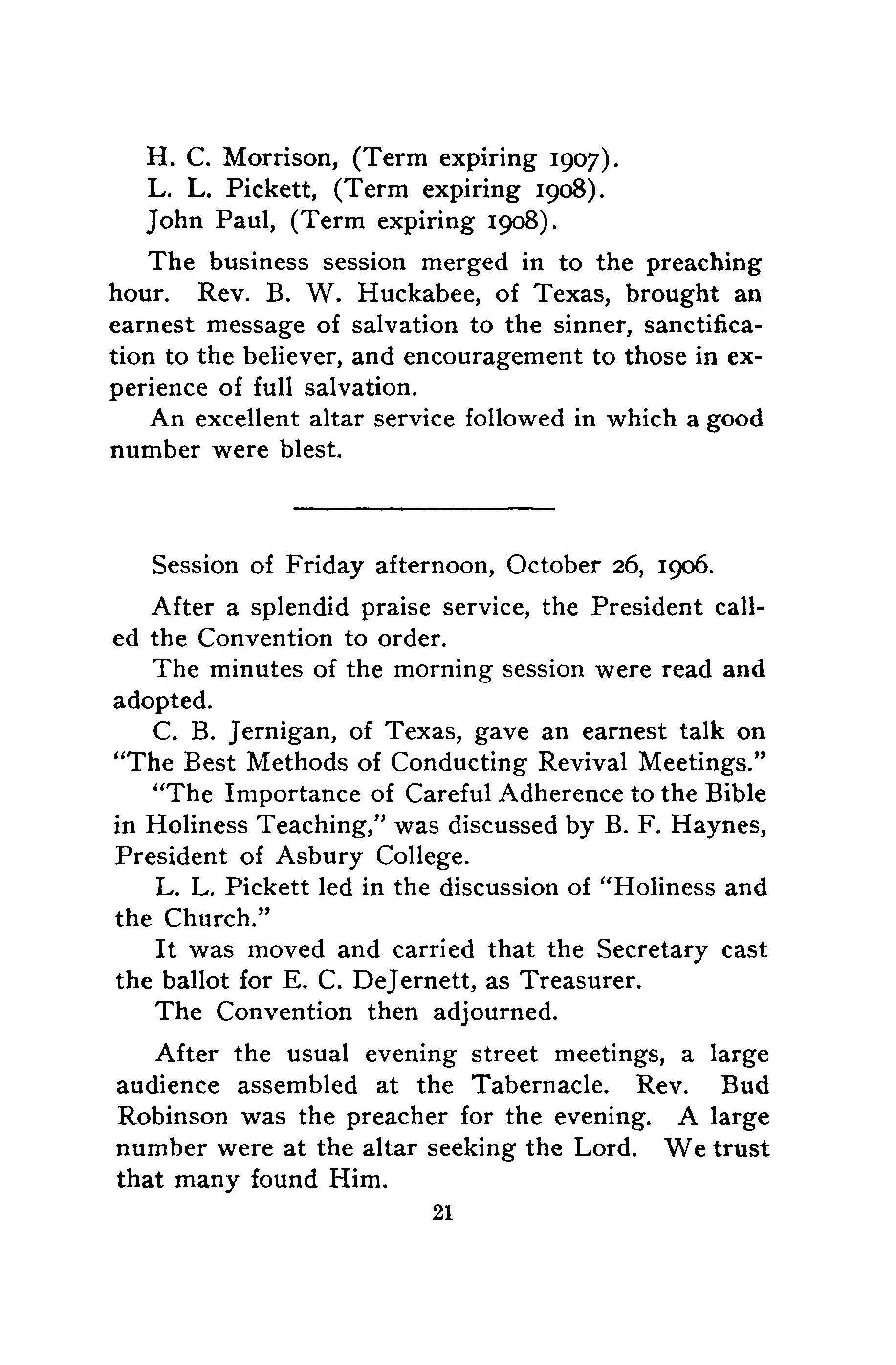
C. B. Jernigan, of Texas, gave an earnest talk on "The Best Methods of Conducting Revival Meetings."
"The Importance of Careful Adherence to the Bible in Holiness Teaching," was discussed by B. F. Haynes, President of Asbury College.
L. L. Pickett led in the discussion of "Holiness and the Church."
It was moved and carried that the Secretary cast the ballot for E. C. De] ernett, as Treasurer. The Convention then adjourned.
After the usual evening street meetings, a large audience assembled at the Tabernacle. Rev. Bud Robinson was the preacher for the evening. A large number were at the altar seeking the Lord. We trust that many found Him.
Session of Saturday morning, October 27, 19o6.
Another good praise service was held preceding the business session.
The President called the Convention to order about 9: oo a. m. The minutes of the preceding session were read and approved.

The Committee of Membership reported a large list of applications. Upon motion they were all received.
J. W. Beeson, H. C. Morrison, and B. F. Haynes were appointed on the Programme Committee for the coming year.
The programme of the day was then begun.
H. P. Myers, of Georgia, rendered a paper on "Holiness and the Slums."
This was followed by the singing of "Rescue the Perishing.''
Then J. T. Upchurch read a paper on "Holiness and Rescue Work."
A few moments were occupied by L. J. Ehrlich, a converted Jew, on "Jewish Missions."
The following report of Committee on Temperance was read:
It is a source of gratification to note the splendid progress which is being made along the line of temperance endeavor and achievement; and we may justly congratulate ourselves upon the fact that our people throughout the whole earth are to a man lined up on the side of temperance, especially as it is applied to the liquor traffic.
Some one has said that the liquor traffic is the embodiment of all vice, and utterly devoid of all virtuesomething about which not one good thing can be said, and the evil of which no language can exaggerate. It tnercilessly devours the honor of our manhood and the virtue of our womanhood. It casts a shadow of deepest gloom and sorow over the home, quenches the holy fires of love and tenderness there ; and renders the father (and sometimes the mother) such a slave to its demands that he would drink the devlish draught though it were pale with the tears of his starving child, or red with the blood of his broken-hearted wife. It lays its blighting hand upon every legitimate commercial interest and hurts or destroys all righteous or honorable business enterprise. It is today the most prolific source of graft and corruption in the political realm, having no sense of honor or honesty, and no regard for the welfare of the country nor the rights of men. It stands at the head of those great merciless combines of unholy wealth and greed which grind the face of the poor and threaten the future of our country a thousand times more than the race problem, and is at the same time the richest, most powerful, and most ag· gressive of them all.
In its relation to our national life the liquor traffic is a red-handed anarchist, having no regard for law or majorities. The oft-repeated cry, "prohibition does not prohibit," never comes from the friends and promoters of temperance, but from the friends and promotors of this nefarious traffic and is prophetic of their determination that it shall not prohibit. The promoters of this traffic always make their party affiliation and their relation to their country subservient to their business, and in defiance to law, if need be, go on
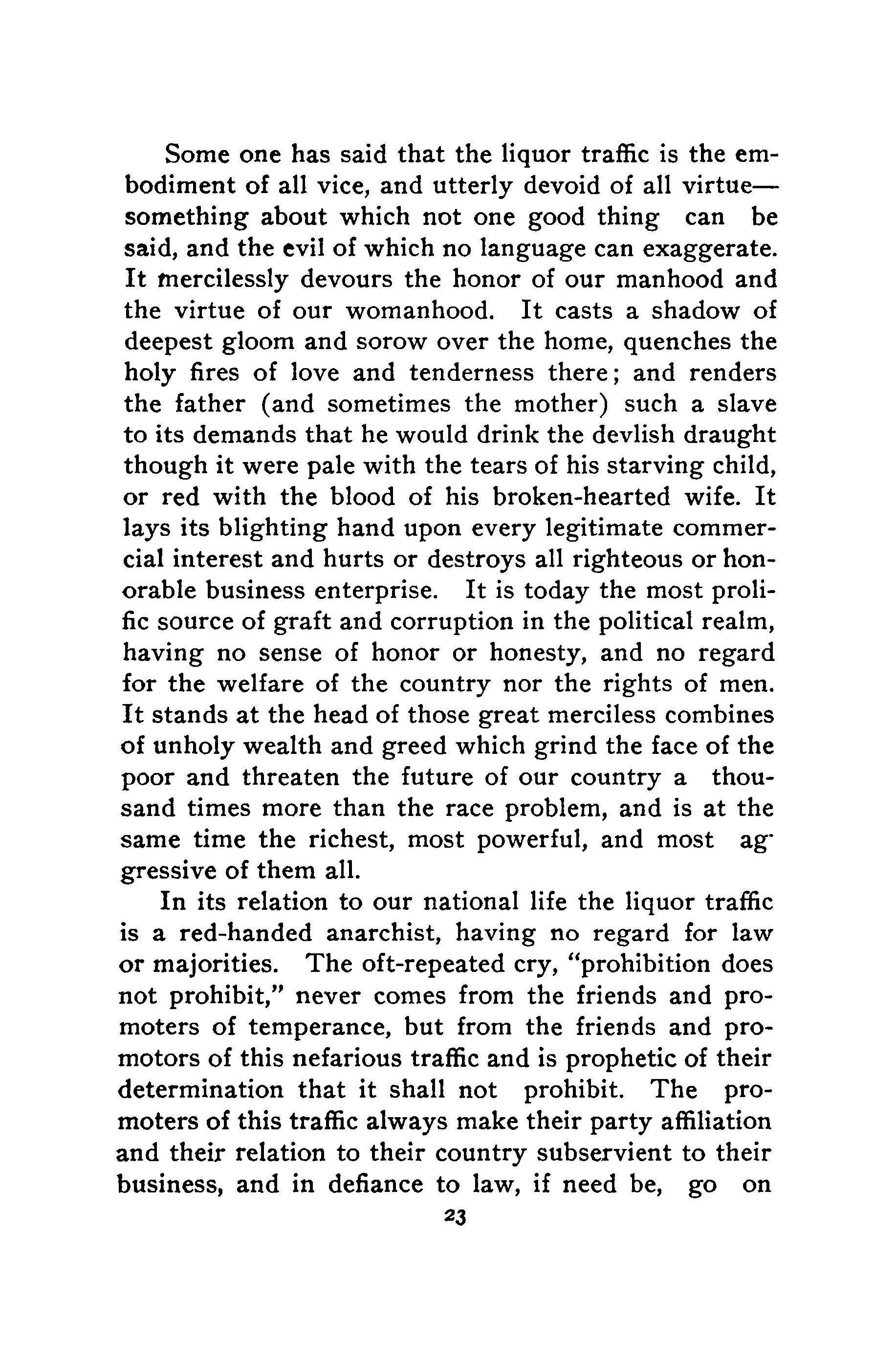
breaking hearts, destroying life. and damning souls with remorseless persistence.
In its relation to society it is an enemy with a capacity of incalculable harm. It is the largest factor in the creation and maintainance of the slum districts of all our great cities. And its places of business are the breeding places of race riots and mob violence. When will our people learn that as long as we fill and debauch the ignorant and vicious blacks with the white man's mean whiskey, we will thereby feed the fires of unholy passion and subject our womanhood to insult and death. The race problem will never be solved until the liquor traffic is abolished.
We have said that we rejoice to witness and participate in the splendid battle now being waged all over this nation and throughout the civilized world; but, let us not forget that there are yet frontiers to be guarded and unsubdued regions to be conquered. The tobacco traffic has in these later years gained large and menacing proportions. It plays first second to the liquor traffic, and, as to its general effects upon society in relation to the ruin wrought, it is but little short of it. We note with gladness that the Holiness Movement has taken high ground upon this question and our ministers and people everywhere are free from this filthy habit. Let the agitation go on.
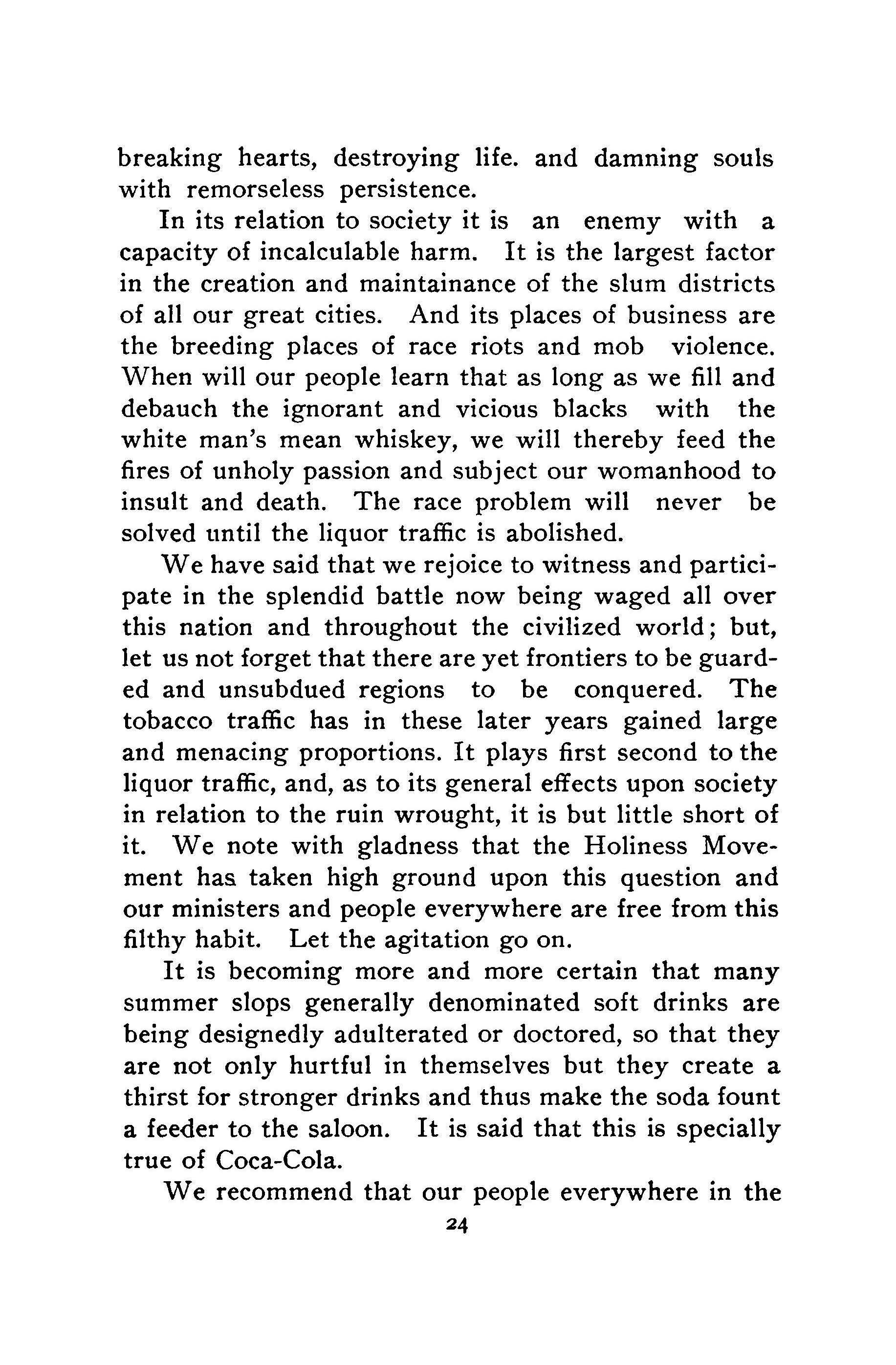
It is becoming more and more certain that many summer slops generally denominated soft drinks are being designedly adulterated or doctored, so that they are not only hurtful in themselves but they create a thirst for stronger drinks and thus make the soda fount a feeder to the saloon. It is said that this is specially true of Coca-Cola.
We recommend that our people everywhere in the 24
largest and most comprehensive sense adorn the great doctrine of temperance in their lives, being patterns of sobriety and self-control, and that we everywhere assist by tongue, pen and ballot in driving this traffic from the land.
We would not, as a Union pledge ourselves to any political party, but would keep ourselves free to adjust ourselves to any condition or movement which would drive the rum traffic from the earth. Respectfully submitted, B. W. Huckabee, For the Committee.
The following resolution was presented and referred to the Committee on Resolutions:
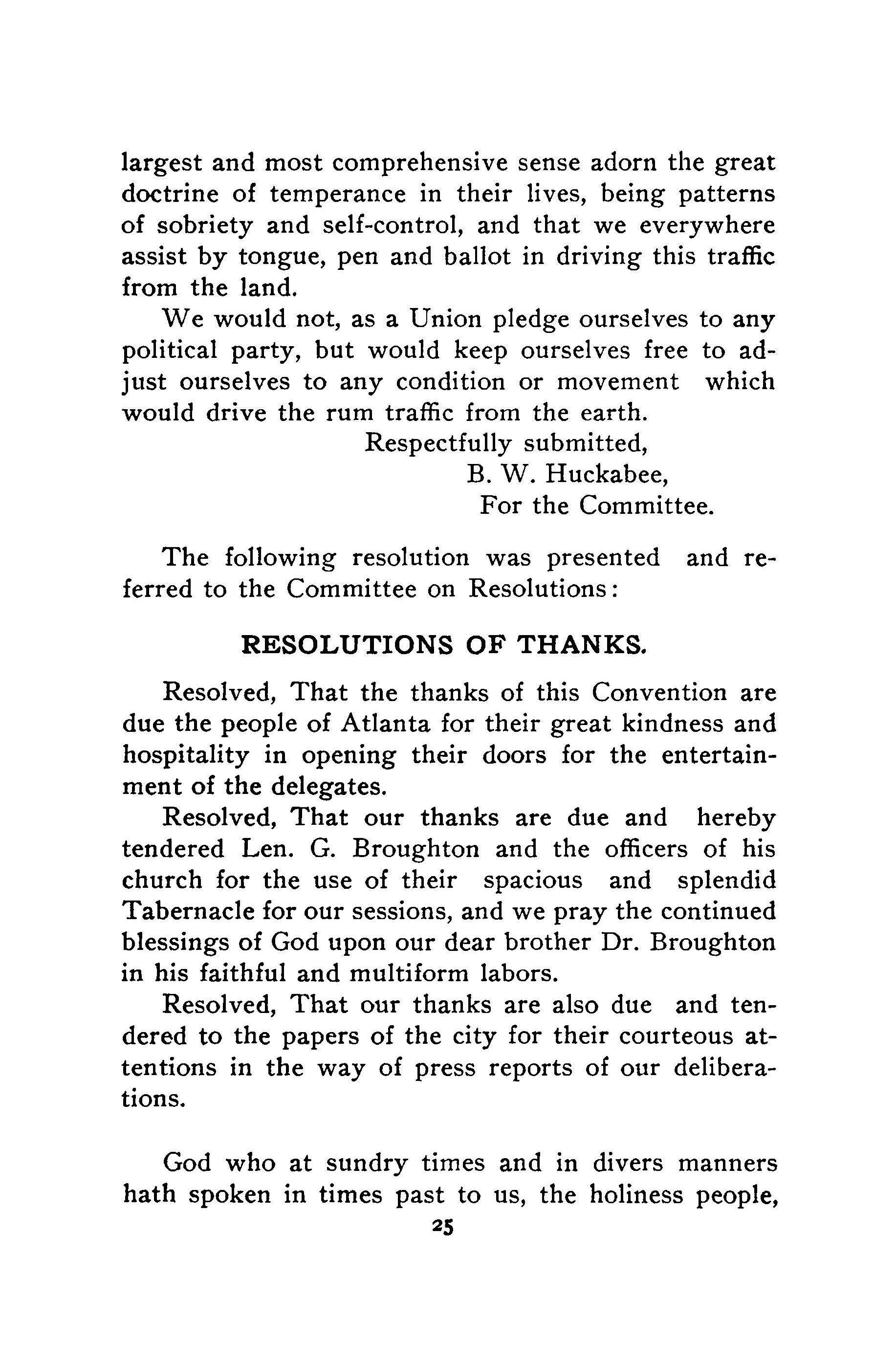
Resolved, That the thanks of this Convention are due the people of Atlanta for their great kindness and hospitality in opening their doors for the entertainment of the delegates.
Resolved, That our thanks are due and hereby tendered Len. G. Broughton and the officers of his church for the use of their spacious and splendid Tabernacle for our sessions, and we pray the continued blessings of God upon our dear brother Dr. Broughton in his faithful and multiform labors.
Resolved, That our thanks are also due and tendered to the papers of the city for their courteous attentions in the way of press reports of our deliberations.
God who at sundry times and in divers manners hath spoken in times past to us, the holiness people, 25
concerning the evangelization of heathenism hath in these last days not only spoken to us by direct command but also by unprecedented opportunities. We are beginning to feel the responsibility and to see the opportunity. This has been evidenced by the organization of our Board of Missions at Meridian. We thank God for its organization and now we pray for a larger and more extended operation. Can it be put into successful operation? We think it can from the fact that our Holiness Movement now numbers its hundreds of thousands both in men and money. When we are reminded that these are consecrated men and women, and consequently they have consecrated purses, the problem remaining to be solved is how shall the needs of the Board be presented to them. No missionary society has ever been successfully operated without some one to take the field at home as Secretary.
Therefore, be it resolved that the said Board appoint a man, or men, as they may deem fit, whose sole duty it shall be to visit camp meetings, revivals, and public gatherings of every kind and present: the needs of the foreign work, take an offering and call for volunteers for the field, the said Secretary to be supported from the funds that he may raise, and that this Secretary be one who has the missionary work laid definitely upon his heart,
W. P. Gillies. E. Stanley Jones.Session of Saturday afternoon, October 27, 1906.
The afternoon session was opened with prayer by W. T. Stokes.
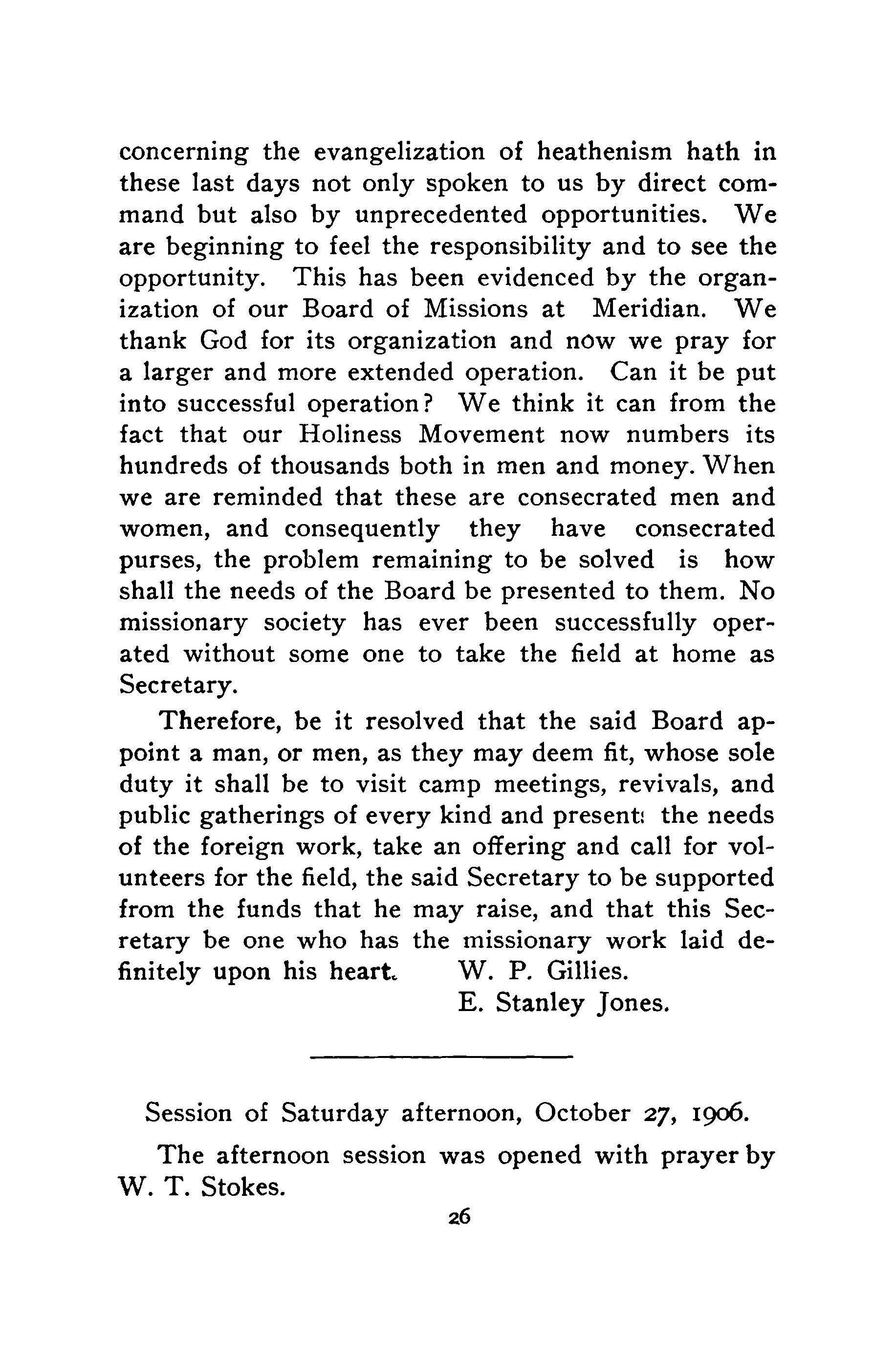
It was moved and carried that a Field Representative for the missionary work be elected.
A paper on missions to the colored people was read by E. C. DeJernett.
Addresses were then delivered by C. M. Butler, of Gautamaula; S. W. Edwards, of Cuba; Miss Hattie Lange Horne, Missionary (member of Baptist Tabernacle) ; Ed and John Roberts, Round-the-world missionaries.

The Convention adjourned.
Saturday Evening Session, October 27, 1906.
A short session was held preceding the preaching hour. The minutes of the morning and afternoon sessions were read and approved.
Announcements were made and a collection taken by one of the local Committees.
After a solo rendered by H. C. Maitland, of Kentucky, the following report of the Treasurer of the Committee on Missions was read and adopted.
To Holiness UnionI beg leave to report as follows:
Total collections to date ......... .
Sundry payments to S. W. Edwards, Cardenas, Cuba .............. .
Sundry payments to B. Lees Sarmart, Oroomiah, Persia ....... .
At the request of Brother Morrison, Ed Roberts, of Texa~, gave a stirring address on the Mission fields as he and his companions saw them on their recent trip around the world.
Brother Morrison then preached an earnest and effective sermon on Romans I: 15, at the conclusion of which an opportunity was given to contribute to the cause of Missions. About $3,500 was given or subscribed.
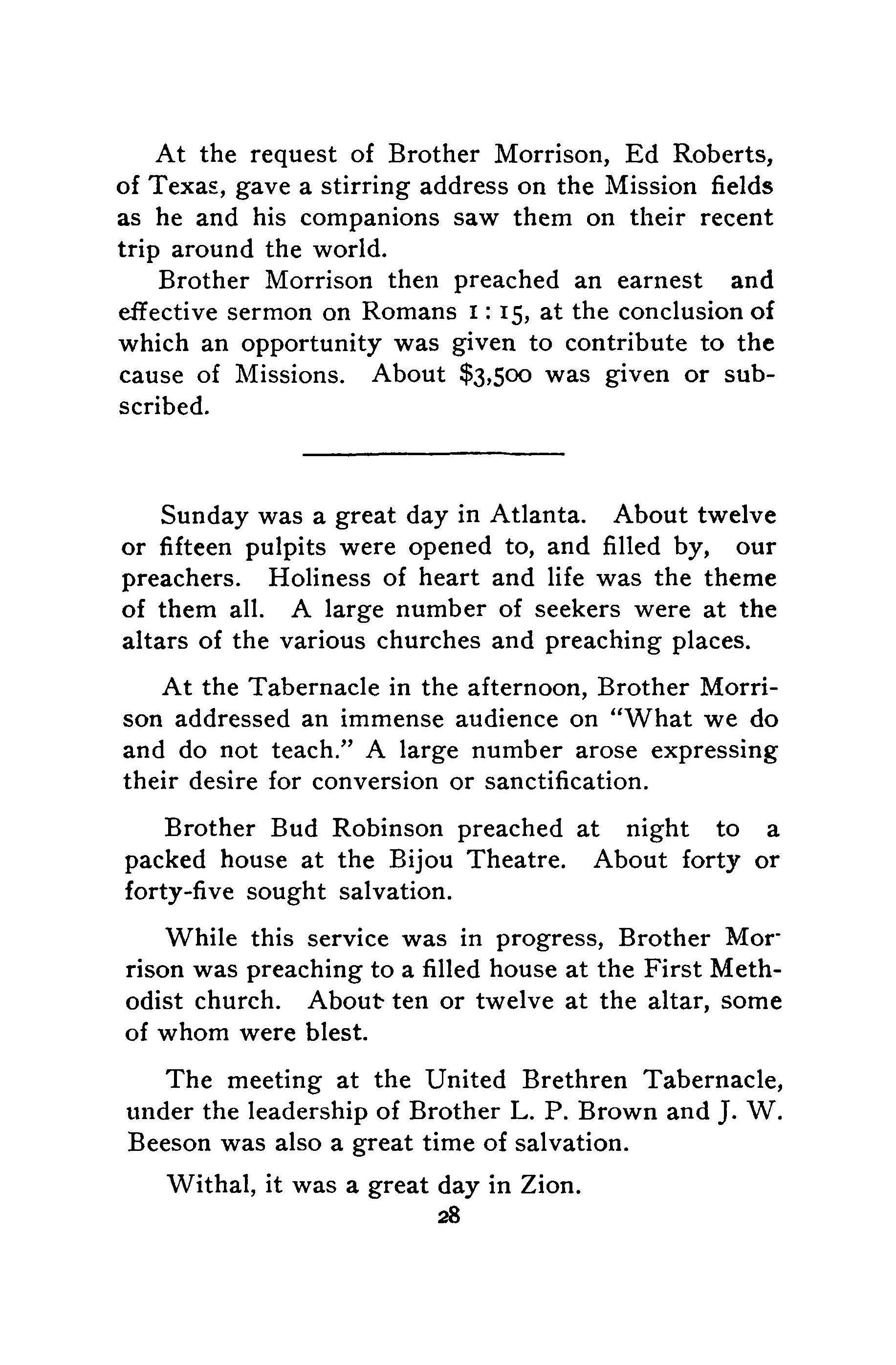
Sunday was a great day in Atlanta. About twelve or fifteen pulpits were opened to, and filled by, our preachers. Holiness of heart and life was the theme of them all. A large number of seekers were at the altars of the various churches and preaching places.
At the Tabernacle in the afternoon, Brother Morrison addressed an immense audience on "What we do and do not teach." A large number arose expressing their desire for conversion or sanctification.
Brother Bud Robinson preached at night to a packed house at the Bijou Theatre. About forty or forty-five sought salvation.
While this service was in progress, Brother Mor· rison was preaching to a filled house at the First Methodist church. About- ten or twelve at the altar, some of whom were blest.
The meeting at the United Brethren Tabernacle, under the leadership of Brother L. P. Brown and J. W. Beeson was also a great time of salvation.
Withal, it was a great day in Zion.

We do not mean preaching in its broadest sense, but limit it to the pulpit, and those called to it. It covers the presentation of the law as well as the gospel. It magnifies the justice as well as the mercy of the Almighty. It is nothing short of the whole counsel of God.
Preaching is not a profession. No man should take upon himself the work of the ministry without a positive call from God. Then he should feel honored, and recognize it as the greatest work ever given to man.
He becomes a co-laborer with God; he is to help God work out his great purposes in this world.
The object to be obtained is the salvation of men, which, in its deepest significance, is not only regeneration and sanctification, but preservation as well. He is to employ means that God has provided. The Bible contains an up-to-date plan that will apply to all ages. This plan he must follow.
The make-up of a man has much to do with his preaching. He should have an intelligent conception of his duty, and then go about it in an intelligent way. He should live close to God and close to the people. He is an ambassador from God to the latter. Tact is a rare but essential property. Adaptability must be carefully studied. And "if any man lack wisdom, let him ask of God."
His personal appearance is highly effective for or against his ministry. Dirt, dandruff, and dust should be kept off the shoes, coat, and hat. Never join the no-tie brigade. Dress neatly and cleanly. Avoid oddity.
The following traits ought to be in every preacher's character:
Piety and humility.
Courage and patience. Earnestness and tenderness.
Love and faith.
Bible-study and prayer.
In the pulpit, he must be at home. It is his place of business. When there he must be at ease. Put dignity to it, but avoid preacherfiedness. Be a preacher, but do not get in the preachers' usual ruts.
The position should be erect, the gestures in harmony with thought, the eyes on the congregation, and the voice neither keyed too high nor too low. A loud voice will not make up for poor thought or lack of power.

The preacher is to be and do his best. And his personal health is no small item connected with it. Fresh air, sunshine, good food, sufficient sleep, plenty of water, and a large supply of cheerfulness are health producers. Nervous troubles, common among preachers, can be avoided by moderation, and the proper amount of sleep. Bad services can oftentimes be averted by nourishing food and proper mastication. The preacher should know well the common laws of health, and the value of a few simple remedies.
Aim high. Remember your best is small enough. Know your capabilities as well as your inabilities, and improve on both. Study successful preachers, their 30
make-up and methods, their blunders and successes. Mold your own powers accordingly, retaining your own personality.
Make men in general one of your principal studies. When in the pulpit, learn to size up your crowd. Get in their realm, and then bring them into your realm. Read books,-the best books published. Remember that God will bless the man that will help himself. Preachers do not happen,-they are called, equipped, and developed. You should have, if possible, regular hours of study, preferably in the morning. And you should not read, but, study! Much depends upon the proper arrangement of truth. That brings us naturally to the message or sermon, the foundation of which is the Word of God. The preacher should have the best education and training possible. Knowledge, especially of the Scriptures, and wisdom, its application, are essential to the best results.
The object is to convince the intellect, stir the desire, and move the will.
A sermon consists of :
I. A Truth to be Presented.
2. A Text for its Basis.

3. An Otttline for its Best Presentation.
4. Scriptures Proving The Interpretation.
5. Illustrations with which to Make It Plain.
6. A Persuasiveness in the Whole That will Move Souls Toward God.
The sermon falls into three natural divisions:
1. The Introduction, which should be short, sound, and solid.
2. The Body of the Message, which should be carefully climaxed.
3. The Conclusion, or Exhortation, which should naturally grow out of that special sermon.
Keep well in mind that you are preaching to four distinct classes :
I. The Sinner.
2. The Backslider.
3. The Converted.
4. The Sanctified. You have six distinct things to do:
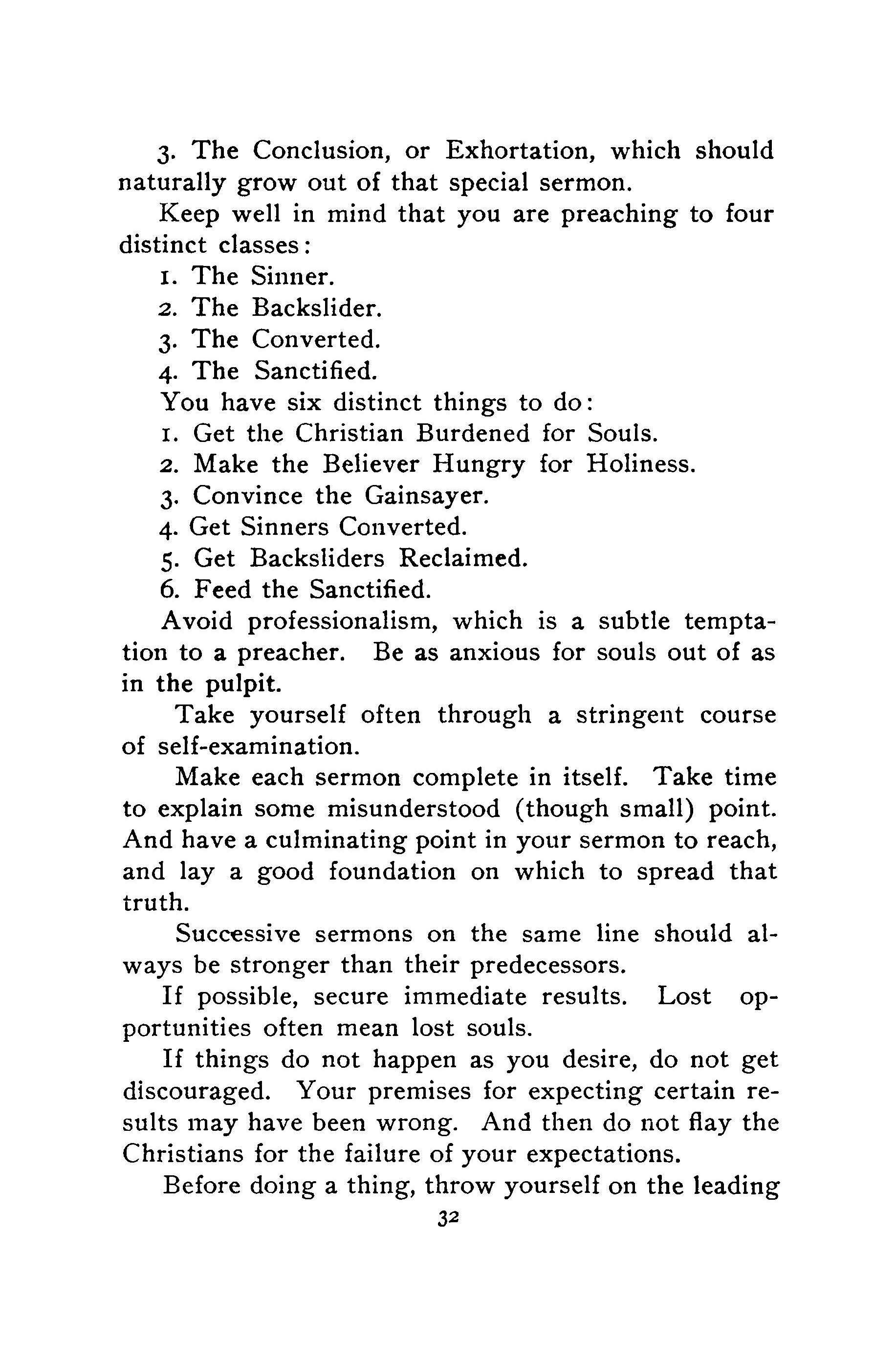
r. Get the Christian Burdened for Souls.
2. Make the Believer Hungry for Holiness.
3. Convince the Gainsayer.
4. Get Sinners Converted.
5. Get Backsliders Reclaimed.
6. Feed the Sanctified.
Avoid professionalism, which is a subtle temptation to a preacher. Be as anxious for souls out of as in the pulpit.
Take yourself often through a stringent course of self-examination.
Make each sermon complete in itself. Take time to explain some misunderstood (though small) point. And have a culminating point in your sermon to reach, and lay a good foundation on which to spread that truth.
Successive sermons on the same line should always be stronger than their predecessors.
If possible, secure immediate results. Lost opportunities often mean lost souls.
If things do not happen as you desire, do not get discouraged. Your premises for expecting certain results may have been wrong. And then do not flay the Christians for the failure of your expectations.
Before doing a thing, throw yourself on the leading
of the Spirit. Just before preaching, reaffirm that dependence. Then do not worry, but trust God.
Draw your net for the greatest number. God will take care of the elite. If you should fish for them alone, you might miss them anyway.
Determine to learn by preaching, the lost art of exhortation.
When you get through, quit; and never quit the second time in the same sermon.

Address of L. P. Brown, President.
Dear Brethren:-
U pon the threshold of young manhood, it was my privilege to be with and hear that man who was called the Socrates of his age-Dr. Munsey; he lived one hundred years too soon. Someone had criticised his mother's Bible. With the Book in hand and tears coursing down his cheek, he said-as I rememberabout as follows: "This Bible is no feeble child begging at the gate of Vanity Fair, but it is a lofty giant, the world's only book; his mother, love; his father, God." Its oldest writer-Job-said, "I esteemed the words of His mouth more than my necessary food." Jeremiah-the home prophet-six hundred years before Christ, wrote, "Thy words were found and I did eat them, and Thy word was unto me the joy and rejoicing of mine heart." God said to Ezekiel-the great foreign missionary-five hundred and ninetyfive years B. C., "Son of Man, eat this roll and go speak
unto the house of Israel ; then I did eat it and it was in my mouth as honey for sweetness." Christ said (John 5 :39) "Search the Scriptures; for in them ye think ye have eternal life; and they are they which testify of Me."
More than four thousand years had been checked in this old world's history; man had been permitted to try every form of government-Monarchy, Aristocracy and Democracy; civilization had reached its acme; demoralization knew no limit to its depth; centralization was enthroned; a single language belted the globe; one power ruled almost the known world; Caesar's government was limited, it seemed, only by the sun in its course-a cord with a given starting point and after a circuit of ten thousand miles would not have found the end of that one power's domain-and yet when Paul would grasp as a sure means of reaching and overcoming for God such a power, he said (Romans 15 :4) "For whatsoever things were written aforetime were written for our learning, that we through patience and comfort of the scriptures might have hope."
I have sometimes, as a layman-with the open Bible before me-thought that for sublimity of boldness, simplicity of fatih, and consecrated modesty, there was no more helpful lesson found in all the Bible than the five daughters of Zelophehad-the five wise virgins of the Old Testament. A wonderful Egyptian and Wilderness history behind them; Canaan with its God-given delights, and at the same time demands that would tax mind and soul just ahead of them; that army of 2¾ million souls on the march for the Plain of Moab ;-the five virgins step forth in the fear of God. Moses-the man who felt
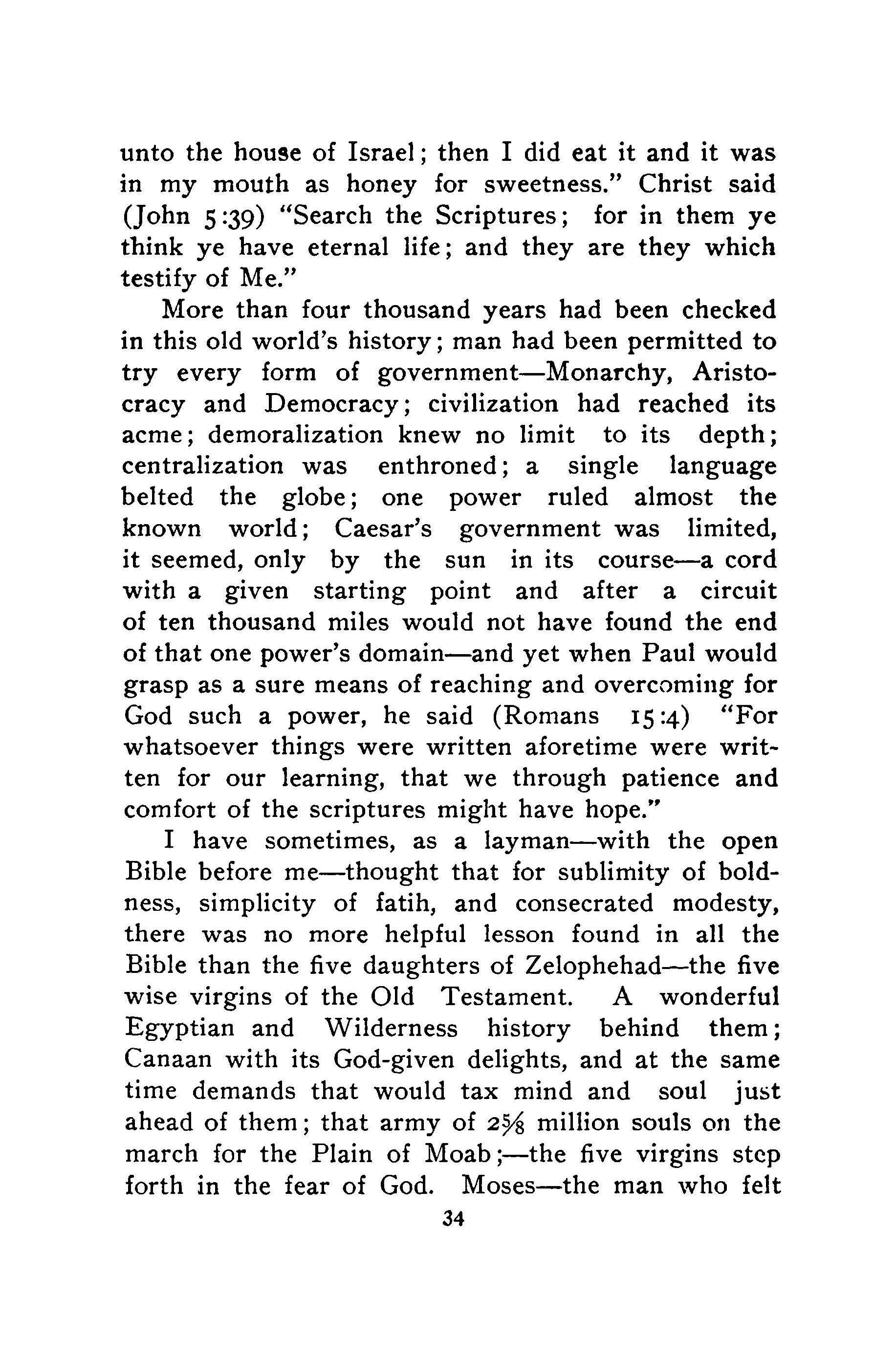
Sinai shake, who heard the thunderings and saw the lightning, the man who had talked face to face with Jehovah-was awed by this boldness of faith; and with all his greatness, had to bring this case i)efore God. The Book gives us in outline the result. God answers as to the temporal possessions whit,h sho!l]d be theirs ; and vouchsafes to them the spiritual and heavenly privileges that were to be theirs ever to the end of their generations.
Let us as a Convention, and as Holiness 1-'~ople, learn afresh today from this old Book. Let us take some of the bearings of the hour-our possibilities are not limited even by God himself. To Him we are to render a wonderful accountability.

This is indeed an epochal time. Three preeminent facts in the Churches are recognized by all candid and fair persons. First: dearth of ordained preachers. Second : absence of real conversions. Third : The world has the mastery in the Churches. Let us prayerfully weigh well these conditions; let us come to the help of their solution after fasting and much prayer. Lord give us an aggressive conservatism. We must have not only from our lips the Pauline statement"! have been crucified with Christ; nevertheless I live, yet not I, but Christ liveth in me; and the life which I now live in the flesh I live by faith of the Son of God, Who loved me and gave himself for me"-but in our hearts there must be the possession. The Blesser must be enthroned in the heart as we move in the home circle, and in the Church, and in the day by day contact with the world.
Let us as a Convention assembled, take fresh lessons and go forward with a keener ear to hear even the faintest whisper of His voice, and to know better
than ever the most delicate touch of the Holy Spirit.
I note among the many dangers which confront us, but two. First: lowering the standard. Oh! for sanctified common sense for each one of us just here; there is no middle ground. Second: divisions. In Sanctification our individualism goes out, but our individuality stays in and will be with us throughout eternity. In every Village, Church and Hamlet you find today some souls who are feeling after the light. God is hearing the heart cries. The devil sees that he cannot stand in the breach and stop this incoming tide. If he can by tact and persistence, switch out of the main line, from our greatest leaders down to the humblest man or woman in the ranks, then he ieels that great gain in his. God help us to keep in the rr.iddle of the road. Tangents are dangerous; side issues and side tracks are fraught with evil and only evil. Brethren, my faith today is clean and simple. I believe that God is bigger than the devil. God is finding men and women that he can trust.
Now brethren, let us as individuals and as a Convention, make this in each of our lives an epochal time for God.
In the Chair, it will be best for me perhaps just here to yield the floor to others. Let me say that I take the privilege of making prayer, song and praise at any stage of the Convention, to be always in order.
I will just append a little slip I addressed to Holiness People, which was written by request several years ago, after much prayer; and which God has signally blessed. I ts teachings come afresh to my heart as I read them.
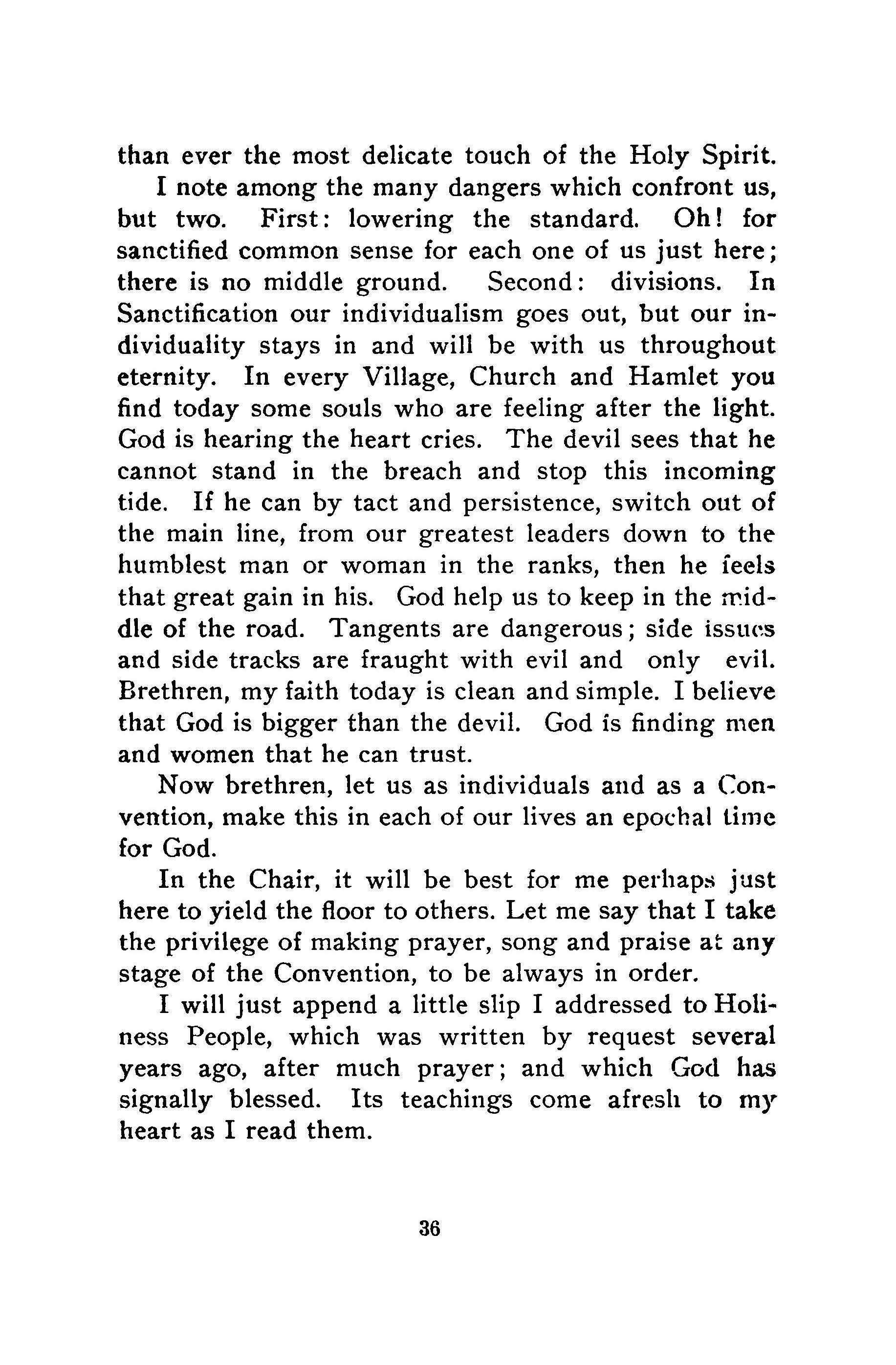
Know more of the deeper depths. Observe regular fast days and do much irregu?ar fasting and abstaining.
Keep ourselves in the Love of God.
Live in the atmosphere of the Holy Spirit.
Be where we can, in the closet or in the midst of the demands and whirl of every hour's life just step into the heart's oratory and commune with God.
When we pray know that some one talks back to us.
By our lives and words evidence to the world that God is bigger than the Devil.
Crave more and more sanctified common sense.
Be in a constant state of respectivity for spiritual teachings.
Testify within the bounds of our esxperience.
Argue with no man but prove a living witness by deed and voice of what God has wrought.
Read, and fail not to broadcast the best holiness literature.
Be a stranger ( even if a dyspeptic) to spiritual gloom or despondency.

Remember the secret of strong faith is to stand true to God and firm amid severe testings.
Keep in mind God is looking for men and women whom He can trust.
Don't run ahead of the Holy Spirit.
Esteem reading the Bible and meditation more than necessary food.
Believe God to be a good pay-master.
Know the touch of the Holy Spirit better than a mother's voice.
Urge seekers of entire sanctification to let the Holy Spirit have right of way and be the real teacher.
Discourage the reckless leaving of office, store, plow, workshop, school room, kitchen, etc., to e, ang-clize.
Live the life, preach and teach where you are. Perfect love should destroy individualism, but strengthen and promote individuality.
Pay to God at least a tenth and give out of our nine-tenths.
With thanksgiving for the unparalleled spreaJ of Scriptural Holiness over the world, let us under God, day by day, find a way for our feet, a word for our tongues and work for our hands.
In Simple Faith and Prayer, L. P. BROWN, Meridian, Miss. Paste in Bible for frequent reference.
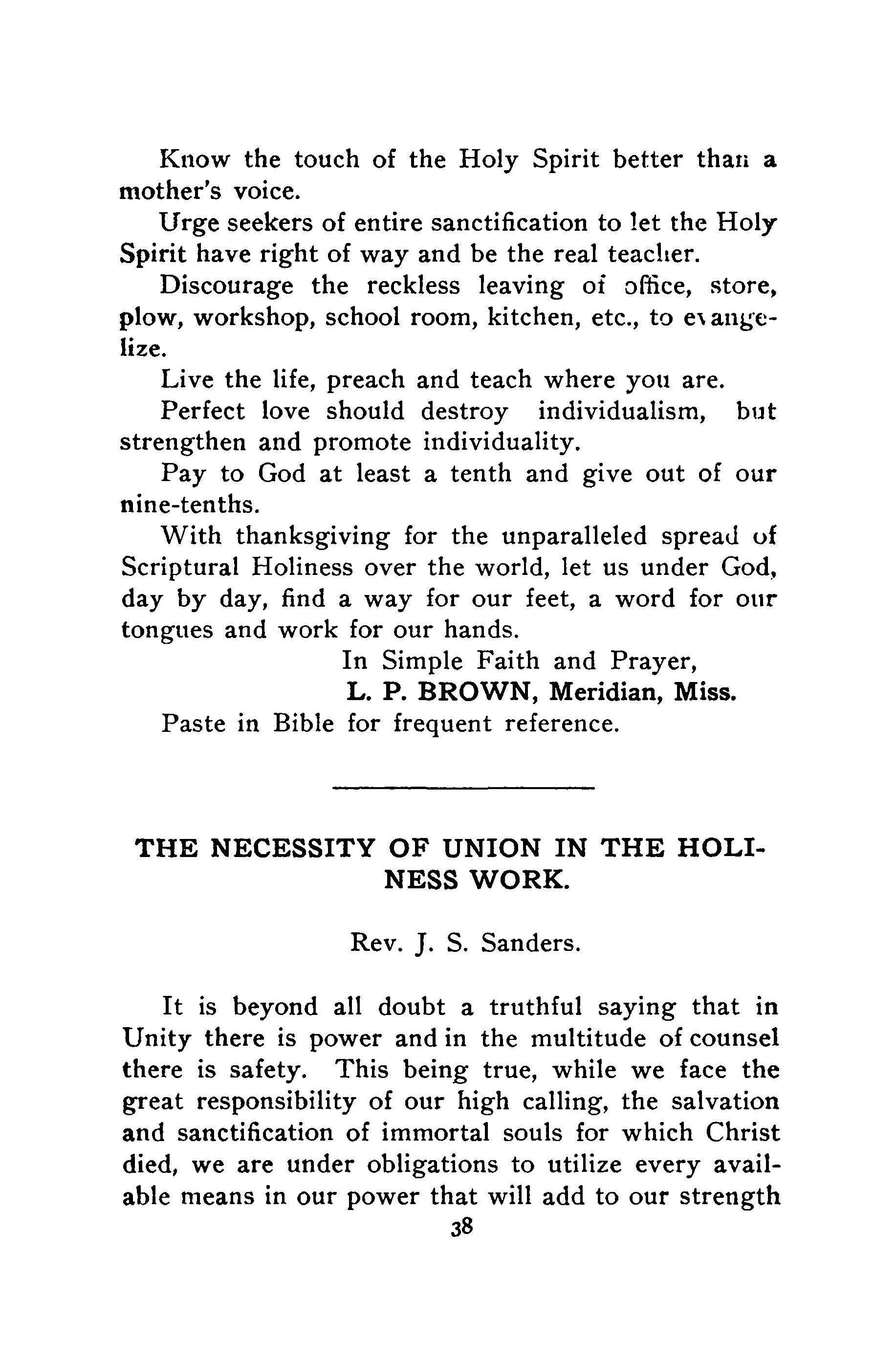 Rev. J. S. Sanders.
Rev. J. S. Sanders.
It is beyond all doubt a truthful saying that in Unity there is power and in the multitude of counsel there is safety. This being true, while we face the great responsibility of our high calling, the salvation and sanctification of immortal souls for which Christ died, we are under obligations to utilize every available means in our power that will add to our strength
and make us most successful. and to allow any selfish motive to enter that would overthrow our efforts in effecting the needed unity would be bound to result in more or less failure which would result in more or less loss. Thus the one who caused the failure could hardly be guiltless before God.
It is necessary to bring us into harmony with the expressed will of our Lord. In St. John, 17th chapter, he prayed the Father to sanctify all believers, and one of the prime reasons given why he wanted them all sanctified was and is now "that they all might be one." And the Apostle Paul declares that "we are all baptized into the same body by the same Spirit; he also, in the 3rd Chapter of the 1st Cor. tells us that "whereas there is among you envy, strife, and division, ye are yet carnal," showing the carnality is the cause of envy, strife, and division. That being true, and the sanctifying of believers makes them all one; it follows that the blessing of sanctification by the baptism of the Holy Ghost and fire destroys all carnality, removing the trouble, and leaving no excuse for division among the truly sanctified people.

It is necessary in order that we demonstrate to the world, not by precept only, but by example, also that the standard of holy living and unity that we preach, and that our Lord prayed and died for, can be obtained and lived in this present world. See St. John 17-21: "that they all may be one ; as thou, Father, art in me, and I in thee, that they may be one in us: that the world may believe that thou hast sent me."
It is necessary also to enable us to overcome and correct the factional spirit that has given trouble, and in some places has brought the cause into disrepute, and to enable us to bring such influences to bear upon
them as to draw them into oneness of spirit and purpose with ourselves. It is also necessary in our Missionary Work to enable us to reach largest results.
The organization of our Mission Board at Meridian last fall was a great inspiration to our people, kindling fresh Missionary zeal. And if all our Holiness Churches, Bands and Associations were to unite their efforts, pouring their Missionary offerings into one treasury, it would soon swell our collections to hundreds of thousands; this would strengthen confidence both at home and abroad, would kindle a fresh flame of holy zeal and fire in every truly sanctified heart, and would send the flame of the power of the Holy Ghost into every nation.
This union is farther necessary in order to bring all the various interests under the advisement of the whole body, so regulating them as to operate them in a way that would materilize in greatest results. Some of us think that if our printing interests were brought under such advertisement that it might give us about two great holiness papers in the Souhtland, increasing their circulation and pacing them on a strong financial footing, giving them a better equipment for their work. And thus confining the contributions from our able writers to these two papers. We would then have no trouble to place them in the home of our people, whereas now we have so many among us who are not able to take four or five papers, so they lose much that is written, and the paper that does not reach the people loses its opportunity.
This union is necesary in order to meet the real heart desire of thousands of God's holy people. It was the heart cry of this heaven-born desire in truly sanctified hearts that first prompted the calling to40

gether of this assembly, and that effected the organization of the Holiness Union. The union of our labors are not only necessary to reach largest visible results, but are necessary in order to bring us into the real heartoneness for which our Lord prayed, and for which our hearts yearn.
Let us heed the admonition of the Aposle: "I, therefore, the prisoner of the Lord, beseech you that ye walk worthy of the vocation wherewith ye are called, with all lowliness and meekness, with long suffering forbearing one another in love, endeavoring to keep the unity of the spirit in the bond of peace."

I. We need union in the holiness movement. The old maxim, "United we stand, divided we fall," applies equally as well to spiritual matters as to affairs of state.
Christ Himself said, "Every Kingdom divided against itself is brought to desolation, and every city or house divided against itself, shall not stand."
God has never been the author of confusion and strife, but is the Author of peace and harmony. Our paramount need today is union. This subject has been treated from the platform and by the press, and yet, that perfection of union which we so much desire, has not been attained. An indissoluble bond of sympathy and love must be welded among our people, if we 41
are to accomplish the great work for which we have been called.
The Holiness Union is an advance in this direction, and if its principles are strictly adhered to by all the holiness people of the South, it will give a permanence to, and recognition of our work, such as we have not had in our past history. There is nothing which so retards the progress of holiness, as factionalism, which genders jealousies, rivalries and divisions.
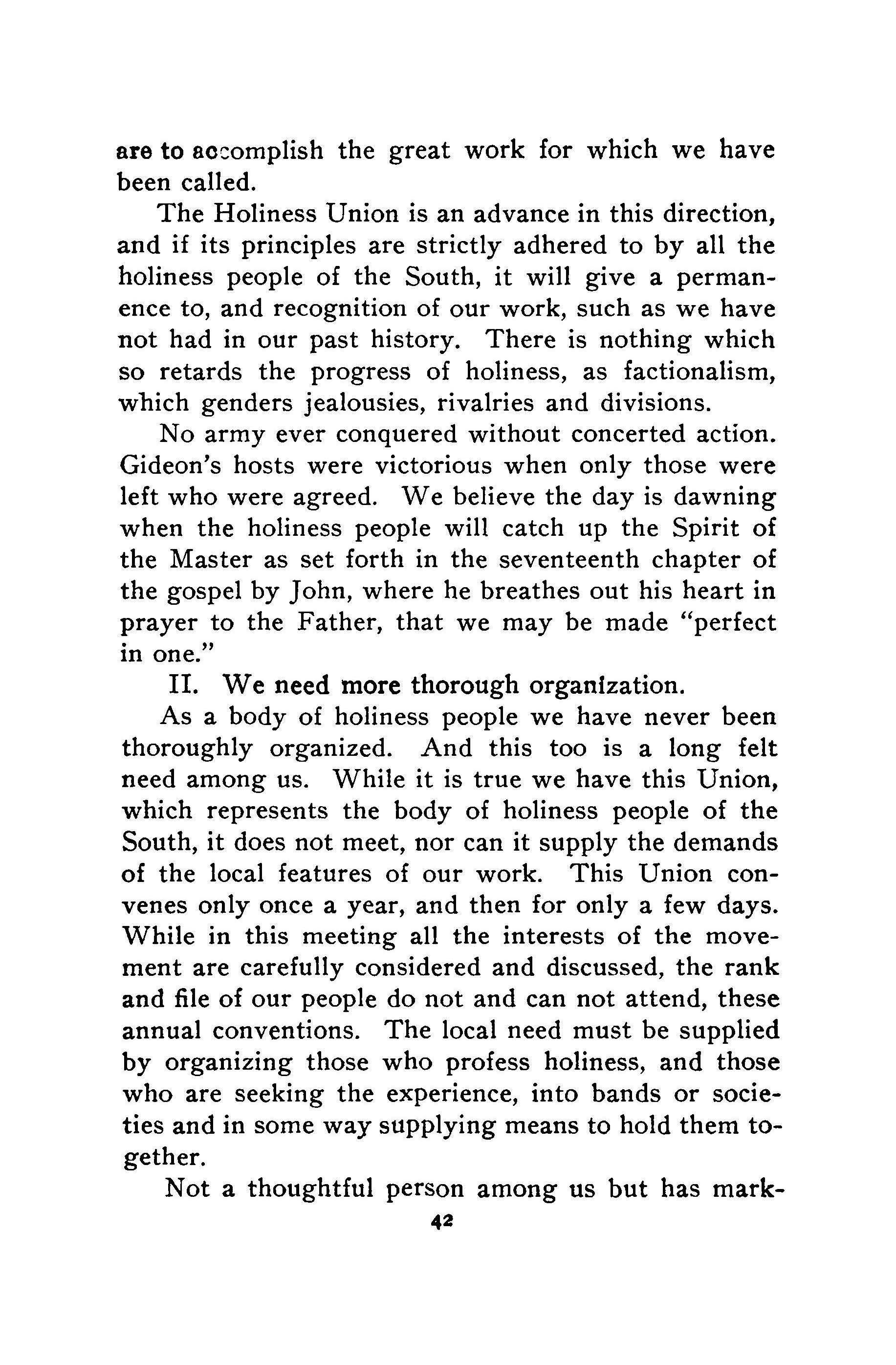
No army ever conquered without concerted action. Gideon's hosts were victorious when only those were left who were agreed. We believe the day is dawning when the holiness people will catch up the Spirit of the Master as set forth in the seventeenth chapter of the gospel by John, where he breathes out his heart in prayer to the Father, that we may be made "perfect in one."
As a body of holiness people we have never been thoroughly organized. And this too is a long felt need among us. While it is true we have this Union, which represents the body of holiness people of the South, it does not meet, nor can it supply the demands of the local features of our work. This Union convenes only once a year, and then for only a few days. While in this meeting all the interests of the movement are carefully considered and discussed, the rank and file of our people do not and can not attend, these annual conventions. The local need must be supplied by organizing those who profess holiness, and those who are seeking the experience, into bands or societies and in some way supplying means to hold them together.
Not a thoughtful person among us but has mark-
ed this great need, and deplored the falling away due, in a great measure, to the lack of organization. The work wrought through evangelism and revival effort, had it been properly conserved, would have made us many times stronger than we now are. Whitfield, the great pulpit orator and preacher, after years of unparalled success as a winner of souls, in retrospecting the past, said, "Wesley's work will abide when mine is no more,'' and gave as a reason that Wesley followed up his work closely by organizing his converts into societies, and looking after their spiritual welfare. To guard against fanaticism and formalism as well, discipline is absolutely necessary; which discipline can be secured only by organization under discreet, spiritual leaders.
In the year 1783 Mr. Wesley was asked what must be done to keep Methodism alive after he was dead, to which he immediately answered, "The Methodists must take heed to their doctrine, their experience, their practice, and their discipline. If they attend to their doctrine only, they will make the people antinomians; if to the experimental part only, they will make them enthusiasts; if to the practical only, they will make them Pharisees, and if they do not attend to their discipline, they will be like persons who bestow much pains in cultivating their garden, and put no fence around it to save it from the wild boar of the forest." Our people must be organized if they are to be kept in the experience of full salvation.
III. We need to cultivate the spirit of Missions. This is most effectually done by the careful study of the needs of the Mission field. Since missionary zeal must be fostered by an acquaintance of the peculiar needs and conditions existing in the different
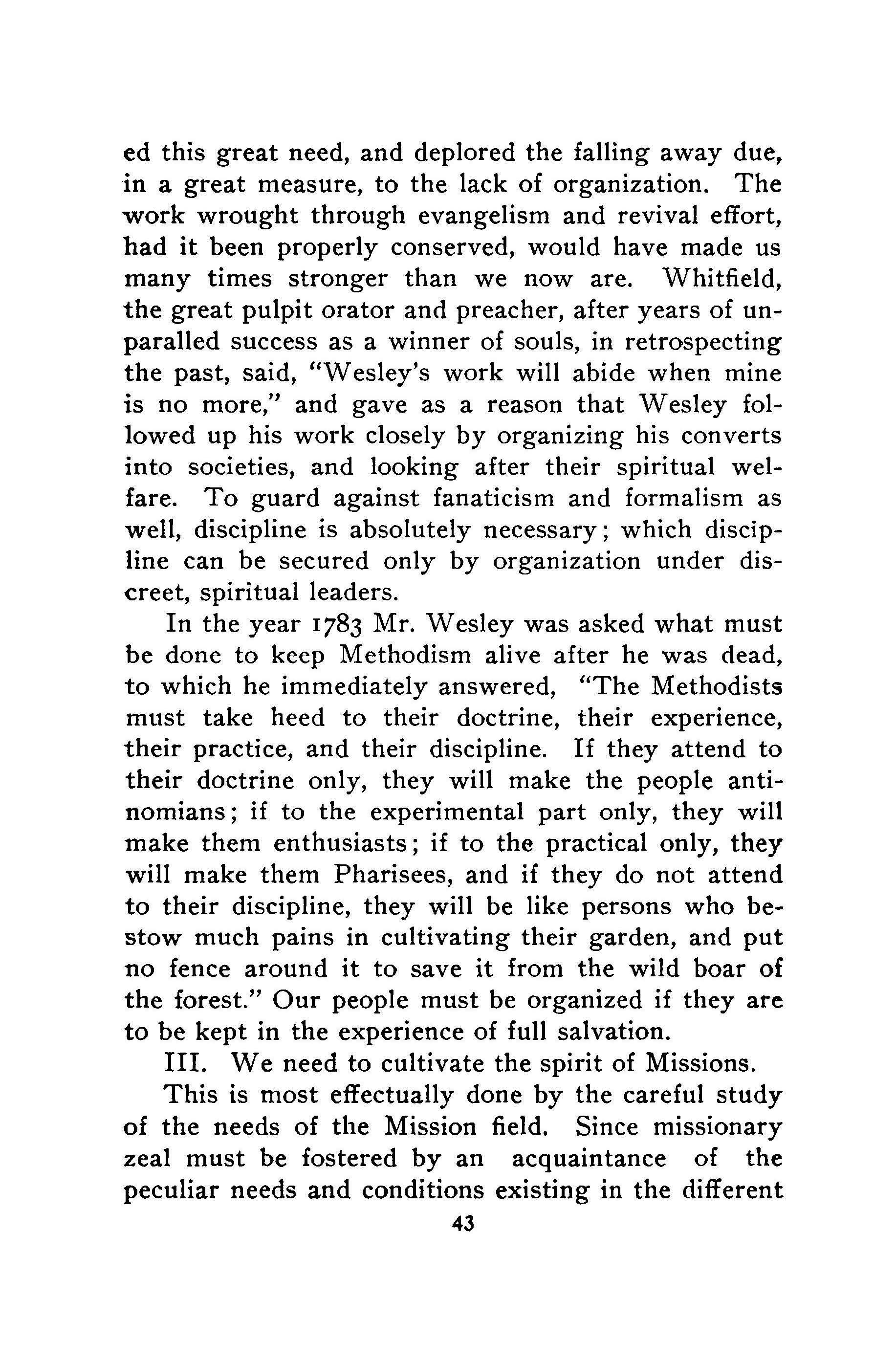
fields, might it not be expedient for the Union to institute a systematic course of reading and lectures on this all-important subject. This is not impracticable since holiness schools and colleges are becoming so numerous. This plan having been successfully adopted by some, would commend itself to all. In one or more of our institutions of learning, the subject of Missions is so systematically studied, that the students are thoroughly conversant with the various Mission fields; and this study has so aroused the spirit of missions in their hearts that all are praying, and many are preparing for the foreign fields.
"Even so, come Lord Jesus, come quickly," is the prayer of every holy heart. To hasten this coming, men and means must be provided and sent to make ready the bride which is to be gathered from the four quarters of the earth. A strict observance of systematic tithing by all the holiness people will assure a more speedy accomplishment of this desired end.
IV. We need a more systematic study of God's word. "All Scripture is given by inspiration of God, and is prifitable for doctrine, for reproof, for correction, and for instruction in righteousness; That the man of God may be perefct, throughly furnished unto all good works."
Thus the study of all Scripture is necessary for equipment for best service and broadest experience. No specialists, as hobbiests, are needed in the holiness ranks, but we should "study to show ourselves approved unto God, rightly dividing the Word of Truth;" with equal emphasis presenting each doctrine of our holy religion, from repentance to glorification. We should acquaint ourselves with all cardinal doctrines of His word, and be able to present to the
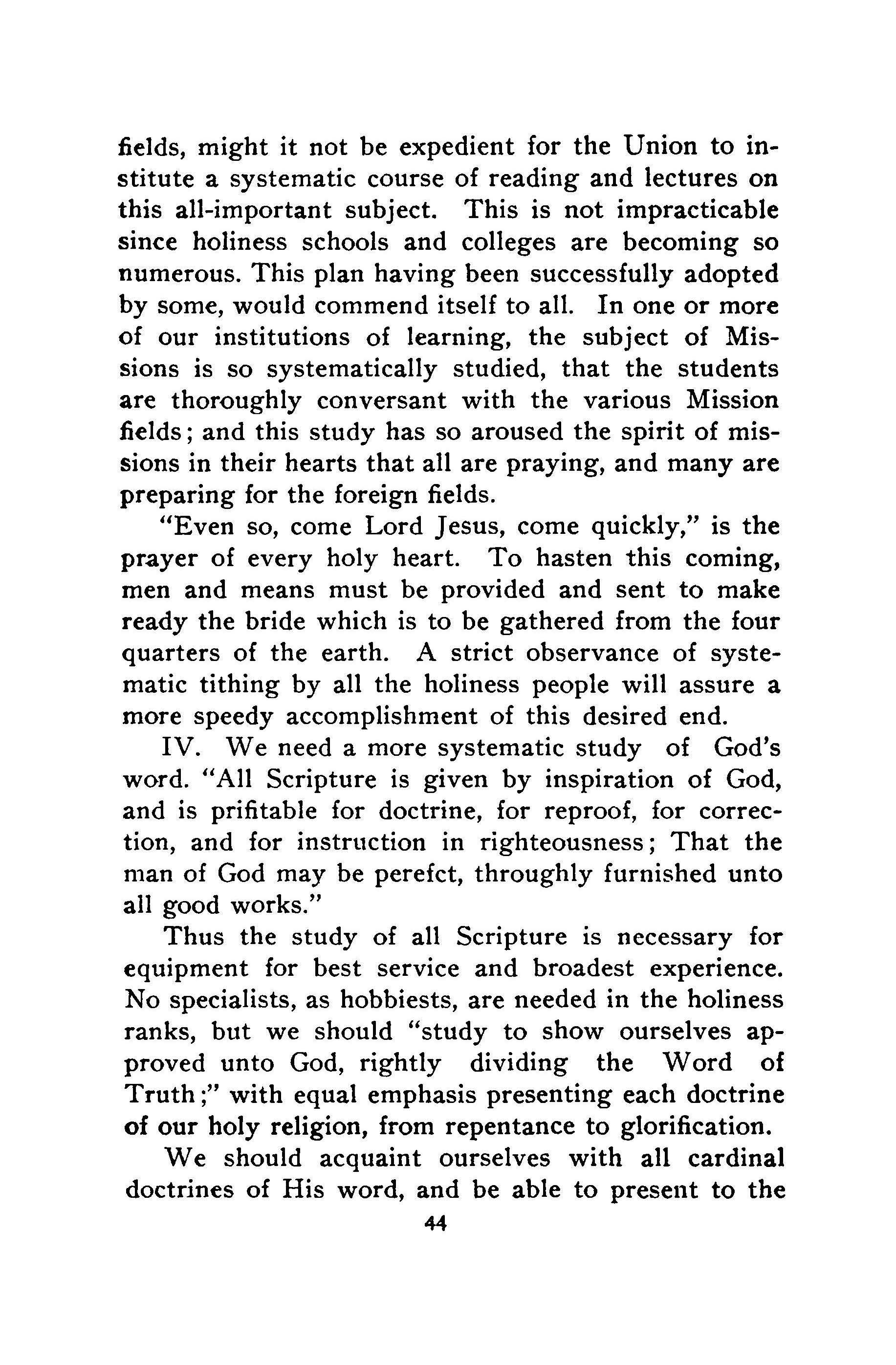
sinner the doctrine of repentance, to the believer, the doctrine of holiness, and to all, the second coming of Christ and the resurrection from the dead. In addition to the study of the Word, as much as possible the works of all safe and able teachers and writers should be read and assimilated.
No little hurt has been done the cause of holiness by the refusal of some professors to read other than the one Book, the Bible, rejecting the teaching of good men, arrogating to themselves the right to interpret the Scriptures, they have become narrow, selfassertive and fanatical. A contribution from many sources is necessary to develop broad Christian Character. Books, men and methods should be studied; examples and precepts adopted, and anything and everything to make one most useful in the Kingdom of God.
V. We need to discourage vain repetition and familiarity in addressing the Deity. In our approach unto God the greatest reverence should be evident in spirit and in word; His name hallowed and not too often repeated. The Jews did not call the name J ehovah often ; they held it in the most sacred reverence. In copying the Hebrew manuscripts, a Jew would always lay down his pen and reverently bow his head before writing the word Jehovah. Should we not observe this same beautiful reverential spirit?
In the model prayer given us by Jesus, only once does He call the name Father, and Thou and Thine are used rather than You and Yours. The use of the pronouns You and Yours in addressing the Lord in public prayer often gives offence, and might well be avoided.
As God's priests let us clothe ourselves with the 45
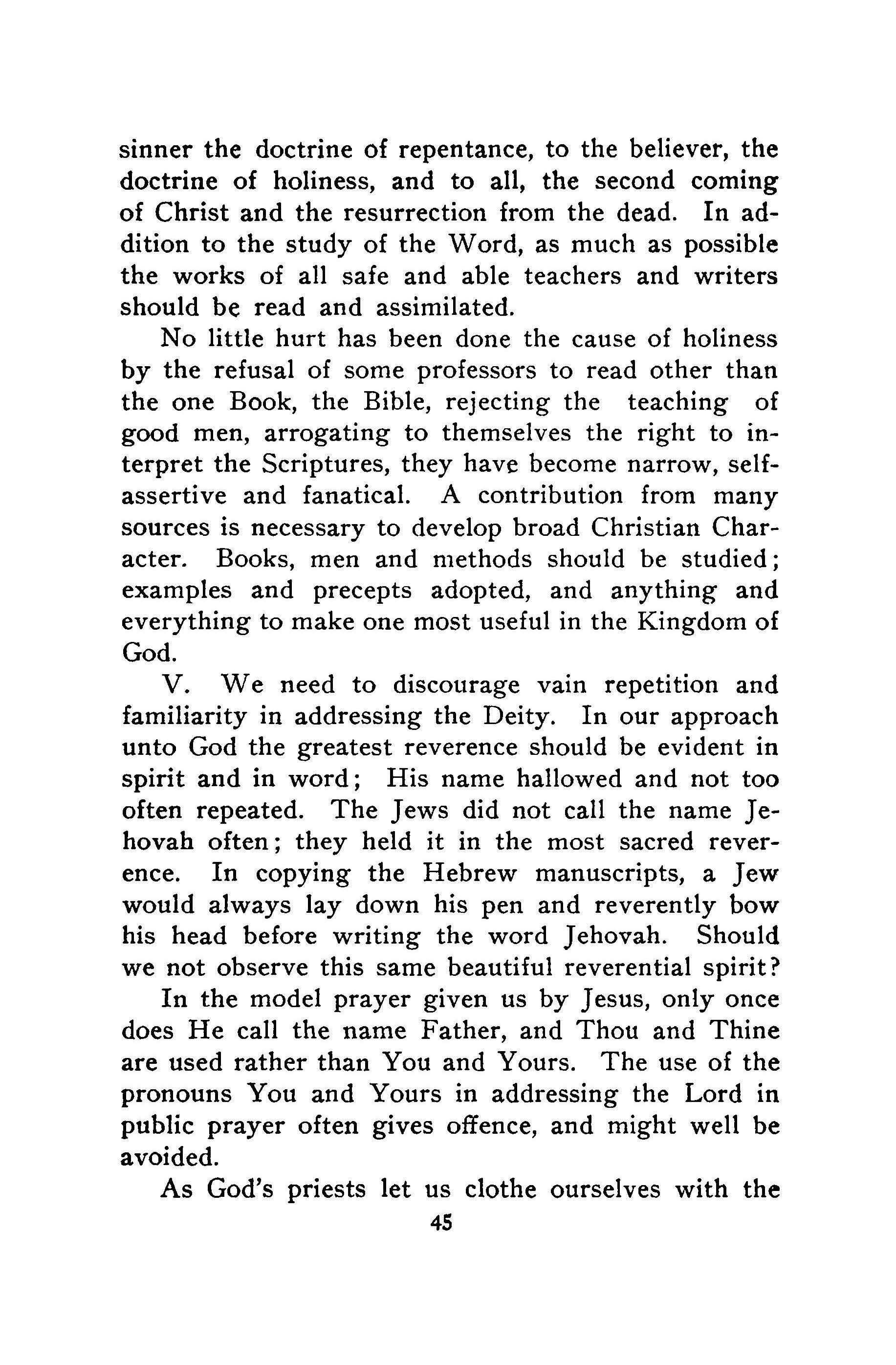
garments of humility and reverence when we approach the mercy-seat. And this does not preclude the spirit of praise and thanksgiving, even to praising Him with a loud voice. In all worship and service for God, there should be a humble recognition of his divine majesty: He the King, and man the subject.
Rev. J. W. Hughes, President of Kingswood College.The Holiness Movement was born in the heart of God, and transmitted to man at his creation. God's design in man, from his creation, was that he should be Holy (and consequently happy.) His universal teaching from creation's dawn has been, "be ye holy for I am holy." When men began to multiply on the face of the earth, God meant them to be holy in heart and life. The Holiness Movement is as old as man; is man's natural supernatural inheritance, and the object of his life should be it's possession and promotion in the world. The real church of God is an organized Holiness Movement, "Ecclesia, that which is called out," means called out of sin into Holiness (and never means "Come-out-ism.") "Come out from the world and be ye seperate, saith the Lord" means a complete separation from all that is unholy and an absolute devotion to all that is holy, just, and good. All through the Old Testament God called men unto Holiness, "through holy men of God, who spake as they were moved by the Holy Ghost." The church of God was
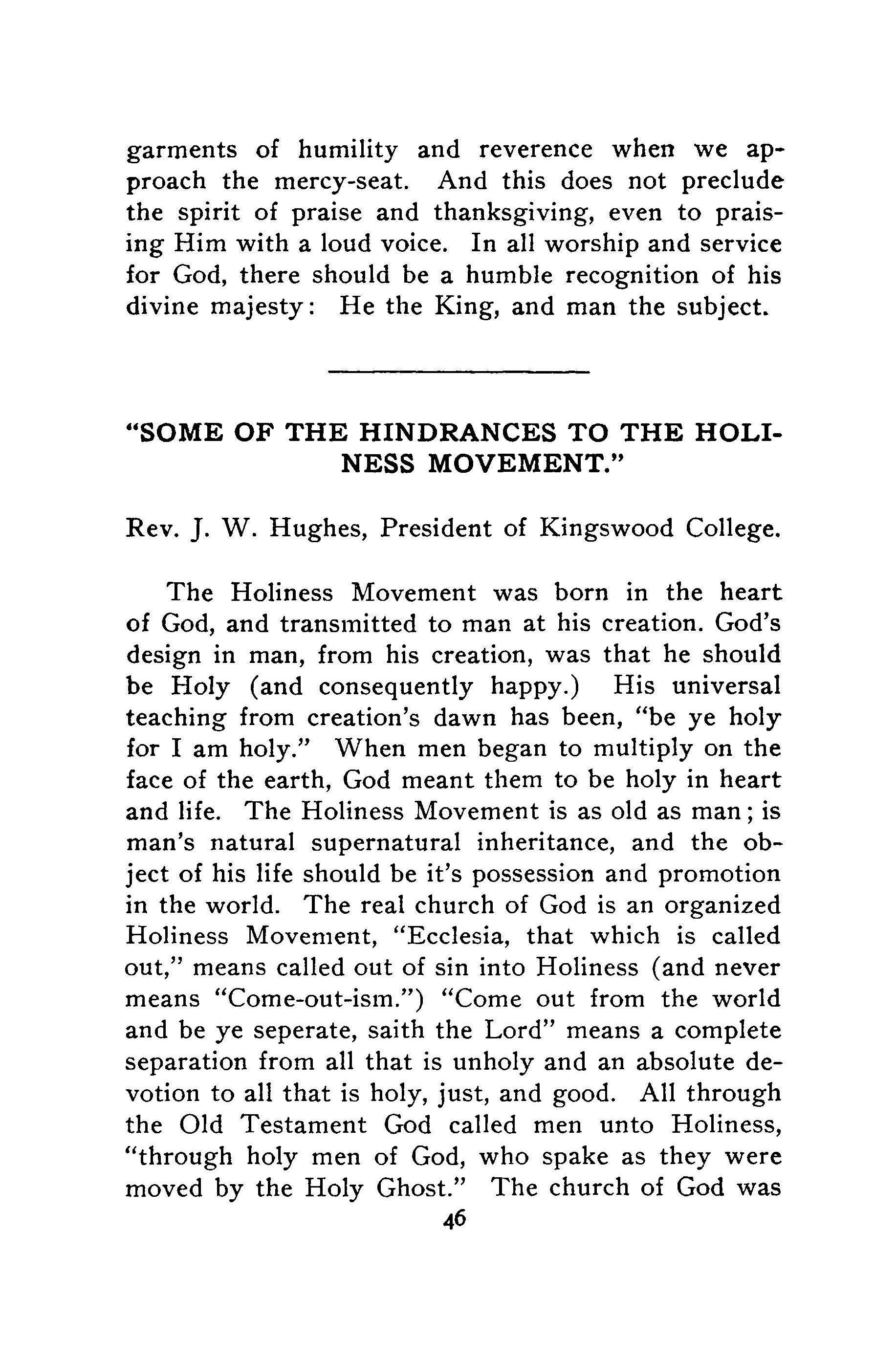
"SOME OF THE HINDRANCES TO THE HOLINESS MOVEMENT."
refreshed, enlarged, and fully equipped for the work of saving the world when she received the baptism with the Holy Ghost at Pentecost. (Acts 2.) Which gave her an accelerated movement which lasted for many decades; and would have taken the world for Christ long ago, had she not allowed herself to be contaminated with it. But all along the ages God has had some devout children who have been "beacon lights" in the world. Among the most God used of them was John Wesley the human founder of Methodism who said of himself and followers "for this purpose God hath seemed to raise us up to spread Scriptural Holiness in these lands." There have been special outbursts of Divine power, or outpourings of the Holy Ghost, all along the ages, which are clear manifestations of God's design to bring the "church" back to her original purity and power. The present Holiness Movement is an accumulation of forces in human hearts that have been gathering for decades not to say centuries, and finds its origin possible and final triumph in Christ under the baptism with the Holy Ghost. The only hope of its complete victory, is its union and fellowship with God and each other, which is the keynote sounded by our Lord (in John 17 :21) "That they all may be one; as thou, Father, art in me, and I in thee, that they also may be one in us : that the world may believe that thou hast sent me."
The following are some of the hindrances to the Holiness Movement to which I call your attention. First, many are awakened in holiness revivals and honestly seek God and find Him precious to their souls, and often call it Sanctification when really they have just obtained regeneration. Later on when more light is obtained they discover the movings of inbred

sin, and many times become confused, discouraged, and backslide.
Second. Others who are clearly saved, and honestly seek a clean heart, but are taught and urged by superficial instructors to claim it by faith; and after a series of questions and answers to test their consecration, they are told to confess it. Later on they wake up to the fact that they have not had the faith that brings heart cleansing and the universal assurance of the Holy Ghost that the work is done : and having made a public confession of the blessing with no assurance of its possession, they often become discouraged and abandon the hope of ever obtaining it.
Third. Disqualified and inexperienced teachers, who have never fully understood the responsibility of leading a sinner to Christ, or a believer to Holiness and to this establishment in the doctrine and experience of full Salvation.
Fourth. Superficial work. This may arise from the fact that it does not require close consecration, and hard knee work to bring about a superficial stir; again it may occur from a disposition on the part of the leader to make a strong report as to the results of a meeting.
Fifth. The division of its forces; such as we find from ocean to ocean, as Pentecostal bands, Pentecostal churches, Mission churches, Pentecostal missions, and etc., etc., each proposing to run on independent lines and to watch with a jealous eye its own progress, and any possible infringement of other Holiness bands on their territory at home and abroad; till often the brains of the most saintly are puzzled to know, "does Holiness unite all Holiness people in one grand army in home and heathen lands?" The Holi48

ness Movement will not do her best work until her devotees see that union of heart does not necessarily mean union of judgment.
Sixth Undue emphasis given to non-essential doctrines often to the neglect of essential doctrines. When I say essential, I mean there is no complete Salvation or Heaven without them, i. e., there is no salvation from actual sin without repentance toward God and faith in our Lord Jesus Christ, followed by the new birth; (John 3 :3) "Except a man be born again, he can not see the Kingdom of Heaven." There is no salvation from imbred sin without complete consecration and living faith in God for heart cleansing. There is no Heaven at the end without Holiness of heart, "Without Holiness no man shall see the Lord."
(Heb. 12 :14). When I say non-essential, I mean (I) A man may be a genuine Christian and yet not possess it. (2) Again good men may honestly differ and both be right with God and gain Heaven at the end, for example, There is every reason in the world to believe that some of the most learned, honest, conscientious, consecrated and holy of men of God in the Calvinistic and Arminian schools of Theology have sought and obtained the blessed experience of full Salvation; lived holy lives, both alike met their Lord in victorious triumph in death and went home to the same heaven. Others have differed on the sacraments of the Lord's supper and baptism, but have gained the same heaven in the end. Still others have differed in reference to divine healing of the human body, but hav.e lived holy lives; some in divinely healed bodies, and others in afflicted bodies, under the smile of their Lord, and both alike in the end heard the blessed applaudit, "well done." Once again other honest, con-

scientious, and studious scholars have differed in their interpretation of the word of God in reference to the second coming of our Lord; yet with their interpretations widely differing, each has had the smile of his Lord through life, a triumphant death, and an abundant entrance into the Saints' everlasting rest. The only safe motto that will perfectly please God, and produce thorough harmony among his children, is "To think and let think." Being perfectly honest yourself and according the same to all others.
Seventh. It has often shut open doors by its unkind, not to say its uncharitable and rash castigations of the churches. A wiser and certainly more advantageous course to the cause of Holiness would have been great kindness, long forbearance, and much prayer for the cold and backslidden churches.
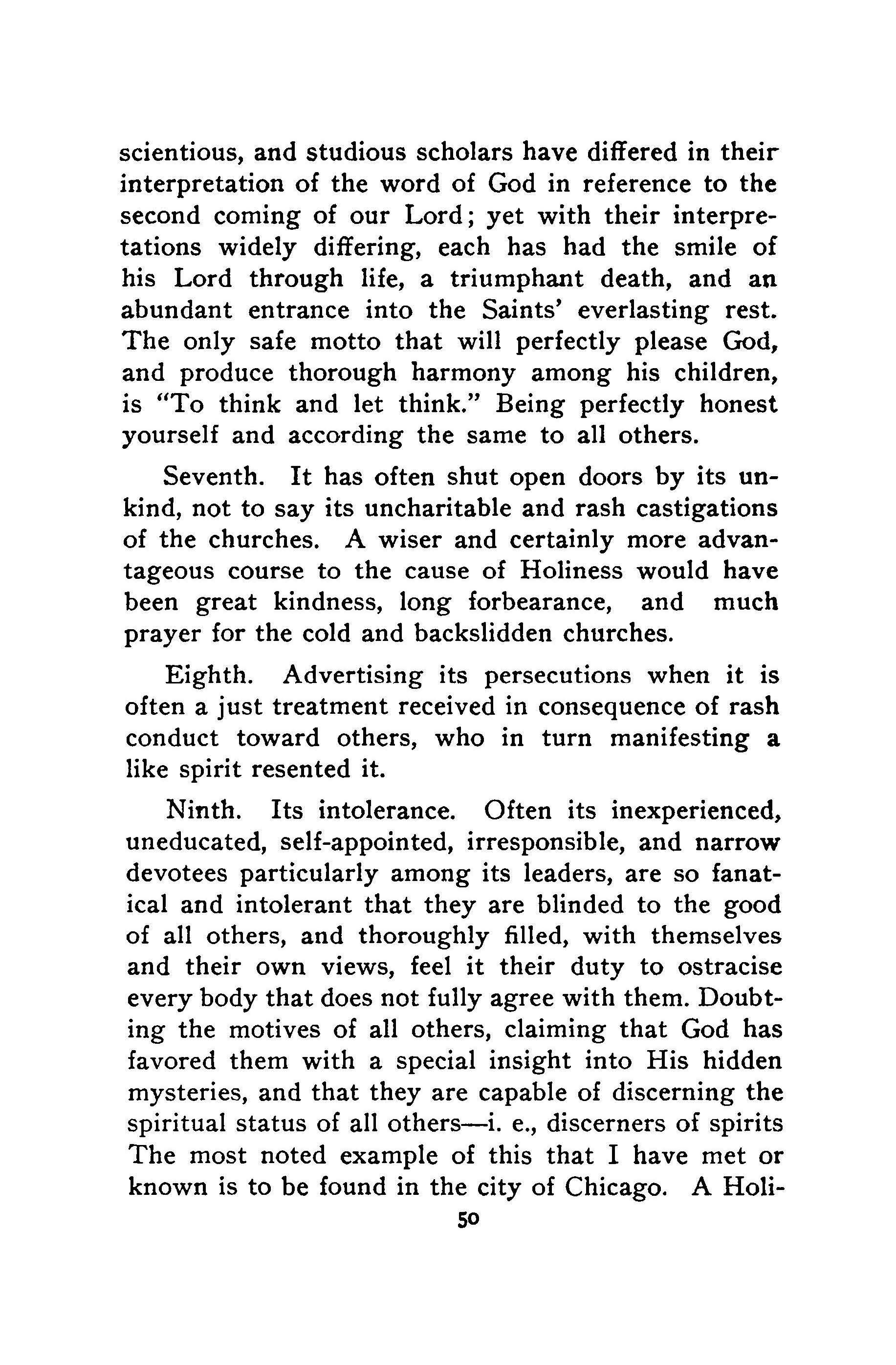
Eighth. Advertising its persecutions when it is often a just treatment received in consequence of rash conduct toward others, who in turn manifesting a like spirit resented it.
Ninth. Its intolerance. Often its inexperienced, uneducated, self-appointed, irresponsible, and narrow devotees particularly among its leaders, are so fanatical and intolerant that they are blinded to the good of all others, and thoroughly filled, with themselves and their own views, feel it their duty to ostracise every body that does not fully agree with them. Doubting the motives of all others, claiming that God has favored them with a special insight into His hidden mysteries, and that they are capable of discerning the spiritual status of all others-i. e., discerners of spirits
The most noted example of this that I have met or known is to be found in the city of Chicago. A Holi-
ness that takes from man his human kindness, gentleness, and common courtesy is not of God.
Tenth. The cowardice, unstability and vacillation of its professors, particularly its leaders. There are two methods used by Satan and his agents to squelch Holiness; one is to intimidate and discourage by threatenings. This comes with extraordinary force because it is from those who are our superiors in office, and have the power to help or hurt us i. e., to give us good or bad appointments. The other method, when the above fails, is to compliment and in so doing bring about a compromise of the truth, generally under the guise of prudence, when in fact its real meaning is "abandon your sharply defined course and adopt a mixed or wholly uncertain one, which means spiritual death to the soul, and the displeasure of God, God's word is clear on this subject, "but if any man draw back, my soul shall have no pleasure in him."
(Heb. 10 :38.)
The only safe course to be pursued is to be sure that we are right with God; that the blood of Christ cleanseth from all sin, and that we are in the center of God's will, and fearless of men or devils press the battle till Holines shall cover the earth. The gospel having been preached to all nations, then shall the victorious end come. When Christ shall descend to gather up His jewels, who have come up through many tribulations having washed their robes and made them white in the blood of the Lamb. "For the Lord himself shall descend from heaven with a shout, with the voice of the archangel, and the trump of God; and the dead in Christ shall rise first : Then we which are alive and remain shall be caught up together with them in the clouds, to meet the Lord

in the air: and so shall we ever be with the Lord. Wherefore comfort one another with these words."
(2 Thes. 4 :16, 17, 18.)
As I understand it, I am not to discuss Socialism in its different phases, but merely the Church's or the Christian minister's obligation with reference to the great economic problems of the day. More briefly stated, the proper attitude of the pulpit toward these civic questions.

At once there rises before the disturbed view of the ultra-conservatives the hoary ghosts which infest ~he dark jungles skirting that region known as the !,eparation of Church and state. They vociferously declaim against bedraggling the fair skirts of the Church in the filth and mire of politics. They deprecate political preaching. The night-mare of mixing politics and religion grievously disturbs their pious slumber. Let me say once for all and briefly that the very burden of responsibility today which C•"lnfronts the honest, intelligent and courageous ministry concerning these social or economic questions has hcen created by the recreancy of the pulpit in the past in relation to such questions. "Nonsensical" is entirely too mild a term to apply to any fears felt or expressed as to any unauthorized tendency toward union of Church and State from the most faithful treatment by the pulpit of these momentous questions.
It taxes ones piety and patience to moderate his
contempt for such senseless protests as would still the voice of the church as it pleads for a civic conscience and a rule of righteousness.
The most radical alarmist as to the separation of Church and state would not dare deny that it is the duty of the Church which he represents to produce Christian citizens who will neither misuse nor neglect their civic powers. Such citizens the churches have failed to produce to any marked degree. "Like priest, like people." The citizens produced by the preachers have been too much like the preachers who produced them. They have imbibed the heresy that a man can be personally pure and politically corrupt; that he can maintain a saved relationship to God and keep obedient to the mandates of heaven and the whispers of the Spirit, and at the same time be controlled in the use of his sacred ballot by political organizations dominated by the most corrupting and debasing agencies whose business is mainly to debauch mankind and populate hell
Two causes have contributed to this dismal failure of the Church to produce citizens with right conceptions and correct conscience as to civic responsibility. The first I denominate, Party Idolatry. The exaltation of party above principle, aided largely by sectional prejudice, has been a potent influence in the miserable abortion of attempting to separate personal and civic righteousness. To this cause we are largely indebted for the heresy already mentionedimagining that a man can be personallly pure and politically corrupt. The humorous question has never yet been answered: "When the politician gets to hell, where all corrupt people go, where will the person be?"
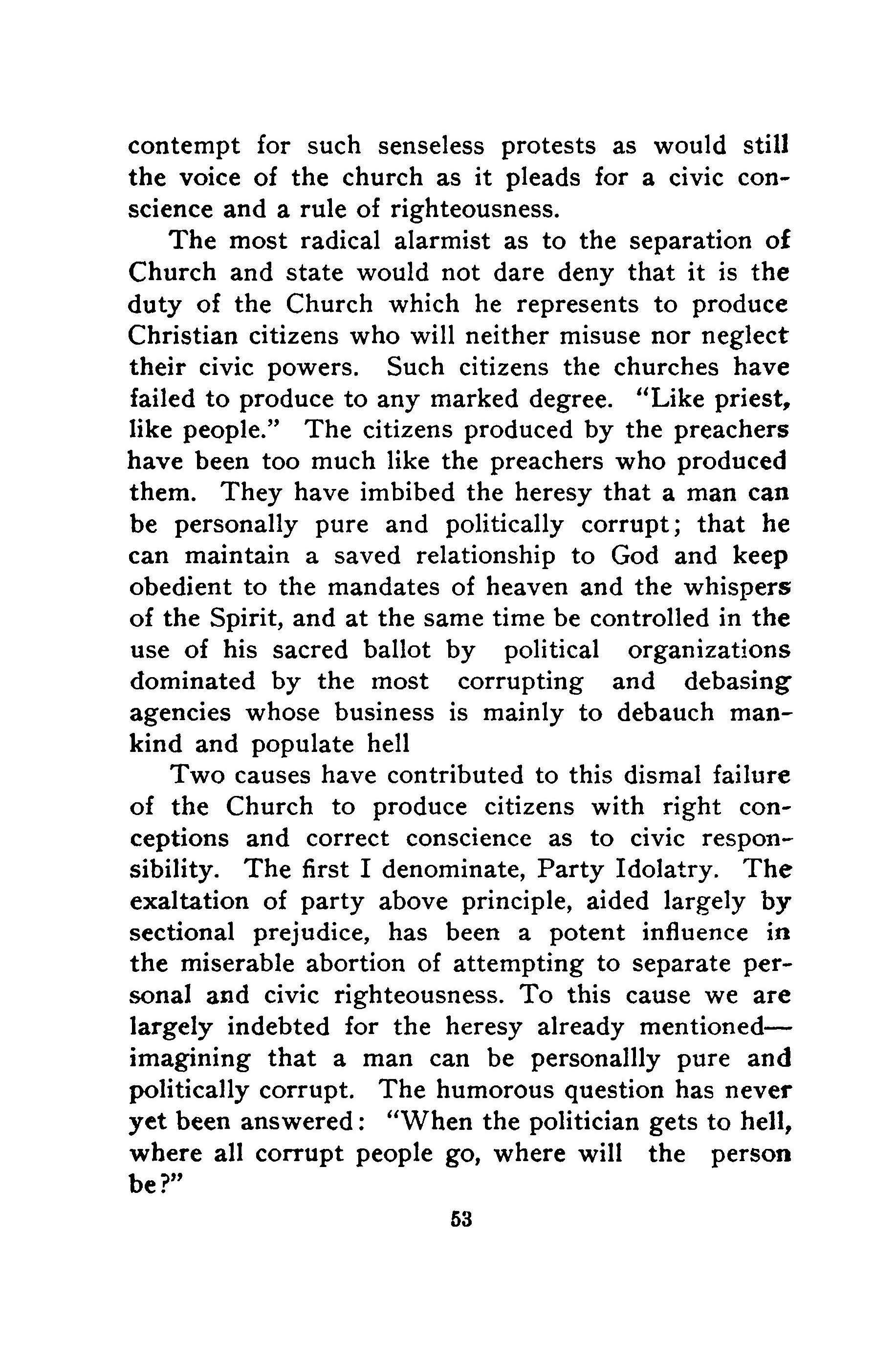
Another cause for the Church's failure to produce the kind of citizens we contend for is that these churches have been too busily engaged during the past centuries in proving infallibly from the Holy Word the divine and exclusive right and necessity for the existence of each of the 150 to 200 denominations in the world, and in providing for their growing necessities in the matter of rules, rubrics, and rubles.
Such wanton waste of men and means-such dire lack of tact and skill in the conservation of forces exhibited by Napoleon would have left his towering ambition without a single star of victorywould quickly wreck every railway corporation in this republic, and paralyze every commercial or industrial enterprise controlled by such an idiotic policy.
To follow the example of Canada and consolidate these numerous denominations into a half dozen or a dozen great bodies would save enough moral energy to inaugurate and perfect the great reform needed in the matter of the Church's relation to the pursuits, the politics, and the pleasures of the world.
Principles.
I have time to enumerate only a few of the points or principles involved in the Civic obligation of the church and my discussion must necessarily be brief and fragmentary, and, hence, unsatisfactory.
1. I insist that it is not only the duty of the Church to save souls, but to help make a safe environment in which they are to live. This latter purpose cannot be accomplished apart from civic or social questions. It is not only the duty of the church to persuade the young to "Seek first the kingdom of God, and all men to flee from the wrath to come,
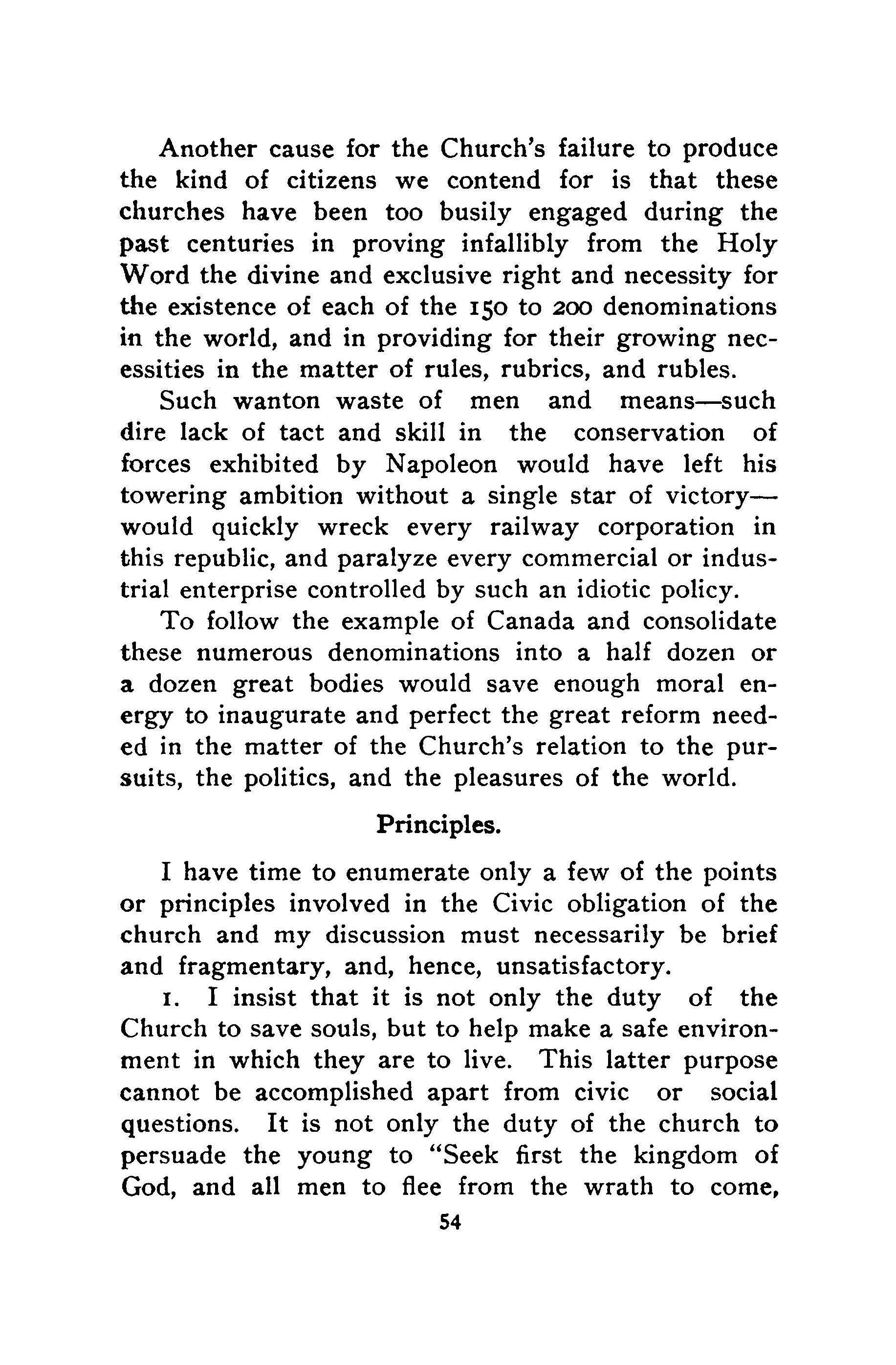
but also to protect them against lust, and drink, and greed, to protect their eyes against indecent pictures, illegally displayed in shop windows and on bill boards, and in every possible way to remove all needless temptations from the pathway of the same. It is as much our duty to keep people saved as to get them saved.
2. It is clearly the duty of the pulpit to espouse openly and faithfully every reform looking to the abatement of any and all evils which threaten the individual or the public welfare, such as the liquor infamy, the divorce evil, Sabbath desecration, and such like. If the preacher is not also a reformer, he ceases to be a preacher of righteousness in the full Scriptural sense.

3. It comes clearly within the obligation of the pulpit to seek by direct teaching from the pulpit, or through the press, to create in the body of believers a right political conscience, a moral sense, a deep moral conviction of personal c1v1c responsibility, which will impel them always to a use of their sacred ballot for such men and such measures as will alone make for righteousness, regardless of the party affiliations of candidates.
4. The pulpit is as guilty and as faithless, when silent in the presence of the suffering of the oppressed and of the brutal outrages perpetrated by the oppressor, as when heedless of the wail of the individual penitent. The sick, not the whole, need a phys1c1an. The wronged, the oppressed under the remorseless heel of modern greed, are certainly amo11g the "weak," needing all the moral force and protection and defense which an honest and a faithful pulpit can render. The pulpit should "cry aloud and -~pare
not" against oppression whether that oppressfrm be practiced by capital or by labor. A silent pulpit in this age which throbs and is convulsed with the mighty throes of these tremendous social problems is a pulpit faithless, fruitless, fallen.
The pulpit should condemn theft, not more surely, and certainly not more severely, when a tramp steals a pair of shoes hanging at a shop window on the street, than when a set of prominent lordly thieves, in broadcloth, steal the street itself. When such so-called "best citizens," in the guise of a corporation, rob an entire city, including the hard working masses, by charging a five-cent street car fare when two cents would pay a high dividend on the cost of the company's outlay-such thieves deserve to wear the stripes in the state prison even though the trans£ er be from the "amen corner" in the churches to the penitentiary cells. It is high time the Church was purged of all complicity in plutocratic infamy, monopolistic greed, the liquor license outrage, and every phase and form of civic and social evil.
Professor Ely tersely but truly says: "Did it ever occur to you that a man who claimed to be a Christian and was not at the same time a philanthropist was a hypocrite and a liar?"
May I not paraphrase Mr. Ely's statement and say: "Did it ever occur to you that a man who claimed to be a Christian or a Christian minister, and was not at the same time a reformer, was a hypocrite and a liar, or a hopeless ignoramus?"
The mission of the church is two-fold-Regeneration and Reformation. We are to regenerate the individual and reform society.

Regeneration with all its blessed and logical consequences and issues is a specific, essential, and momentous obligation resting on the pulpit; but equally essential and as distinctively a part of pulpit obligation is the duty of social reform. They are complemental, joined together by the authority of heaven, and I here and now unhesitatingly aver that that sentiment, which dares to separate what God hath joined together for the relief or defense of a timorous or a worldly pulpit, is a sentiment at war with the best interests of humanity and tends to defeat the highest achievement of pulpit usefulness and is insulting to the majesty of heaven.
5. Christian Socialism, that is to say-a correct recognition and faithful discharge of our duty respecting all these civic and social questions will be the best, yea, the only antidote for anarchism. Anarchism is an exaggeration, a distortion, a debauchment of true socialism. It is an evil which can grow only in one soil and that soil is made up ( 1) First, of laws wholly unjust, and (2) secondly, of unequal enforcement of just laws. When legislation is for the classes and not for the masses, when legislatures and Congresses are dominated by corporate influence which succeeds in procuring legislation protective of corporate interests and oppressive to the masses of the people, the revolt crystalizes in anarchy. This crystalization is accentuated further by partial or non-enforcement of law. The purloiner of the poultry yard, and the thief who steals a piece of bacon for a hungry, shivering, little group around the alley corner, are held by the vigilance of the officiary to a rigid account and are duly landed in prison as a penalty for their crimes. The kid-gloved S7

thieves who pay high pew-rent and write large checks on their pastors' salaries from dividends gained by investments in corporations and trusts, which by a system of watering stock, lowering wages, and increasing the prices of commodities, creating the very destitution of the poultry and meat thieves, generally escape the vigilance of the law and law officers and are reckoned the great men of the community and of the church.
Is it surprising that out of a soil composed of the two fore-going elements there has grown up a spirit of anarchy which seeks to destroy law and government. Anarchy is defiant, bloody, desperate. These are the identical characteristics of the monopolistic cause of its birth. Greed reaps what it sows. Anarchy defies all law, spills blood to achieve its dastardly ends and is desperately determined on success even at the sacrifice of the life of its own votaries. Monopolistic and corporate greed defies every law of God and man, will protect and conserve its nefarious and diabolical ends at the cost of blood and exhibits a desperation of purpose to maintain its reign and dictatorship equalled only by the desperation of the anarchism which it produces.
The pulpit largely holds the key to the abatement of anarchy. The way to counteract hostility to law is to make and enforce laws which deserve to be respected. Let the pulpit discharge its obligation of properly influencing the making and enforcing of such laws and it will strike a fatal blow at anarchy.
6. The kind of citizenship for which I plead is composed of six essential ingredients: Conviction and courage, power and prudence, tenderness and tact. The dynamite of the Holy Ghost alone can
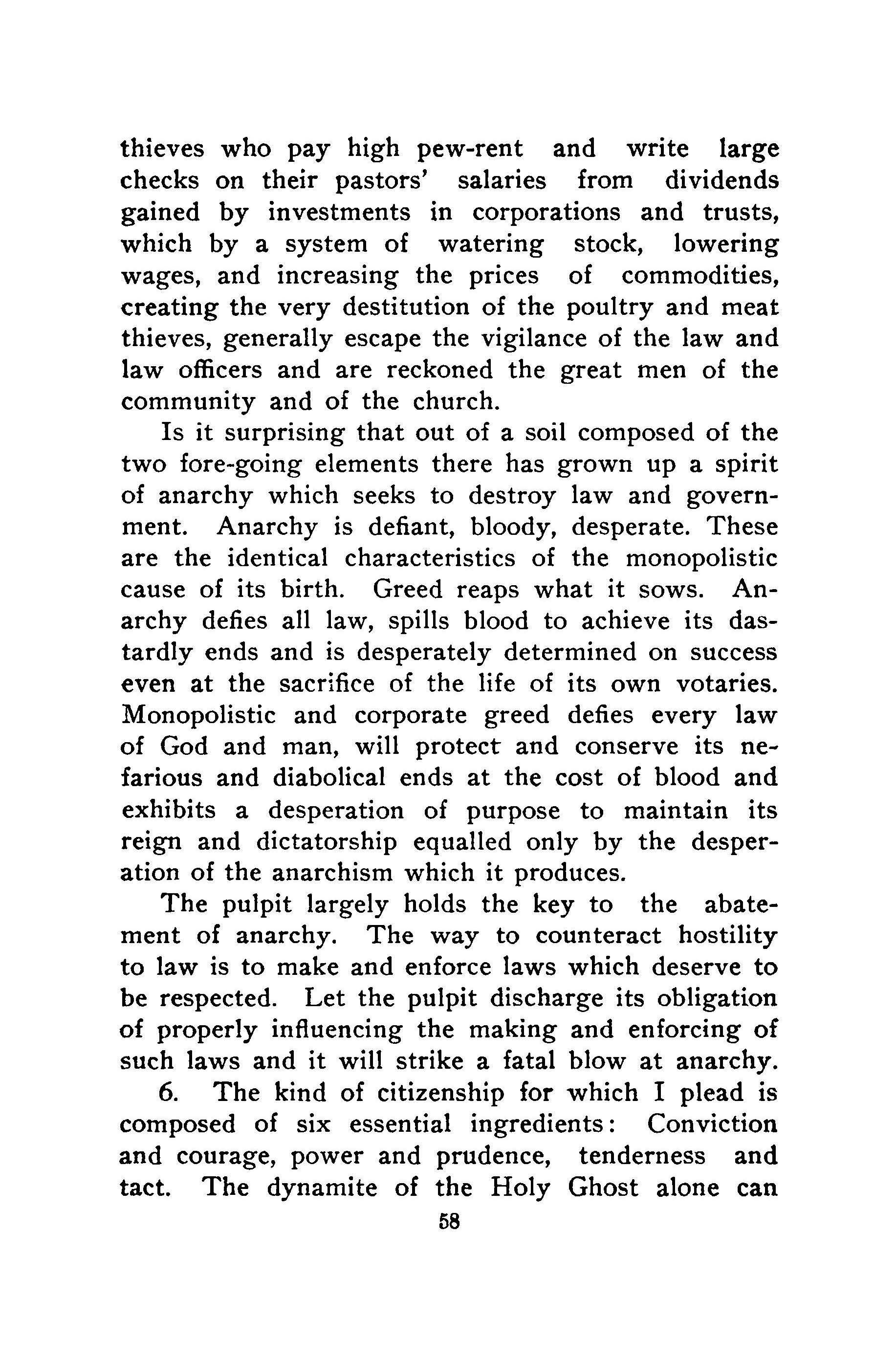
produce these titantic qualities in human character. The Holy Ghost Himself is our great Evangel as a Holiness Movement. The logical responsibility resting upon us is therefore patent. Let us be true to our GREAT TRUST.
The word of God teaches that "without Holiness, no man shall see the Lord." So, you see, that includes the Negro race. We will first speak of them, as we were raised in the midst of them.
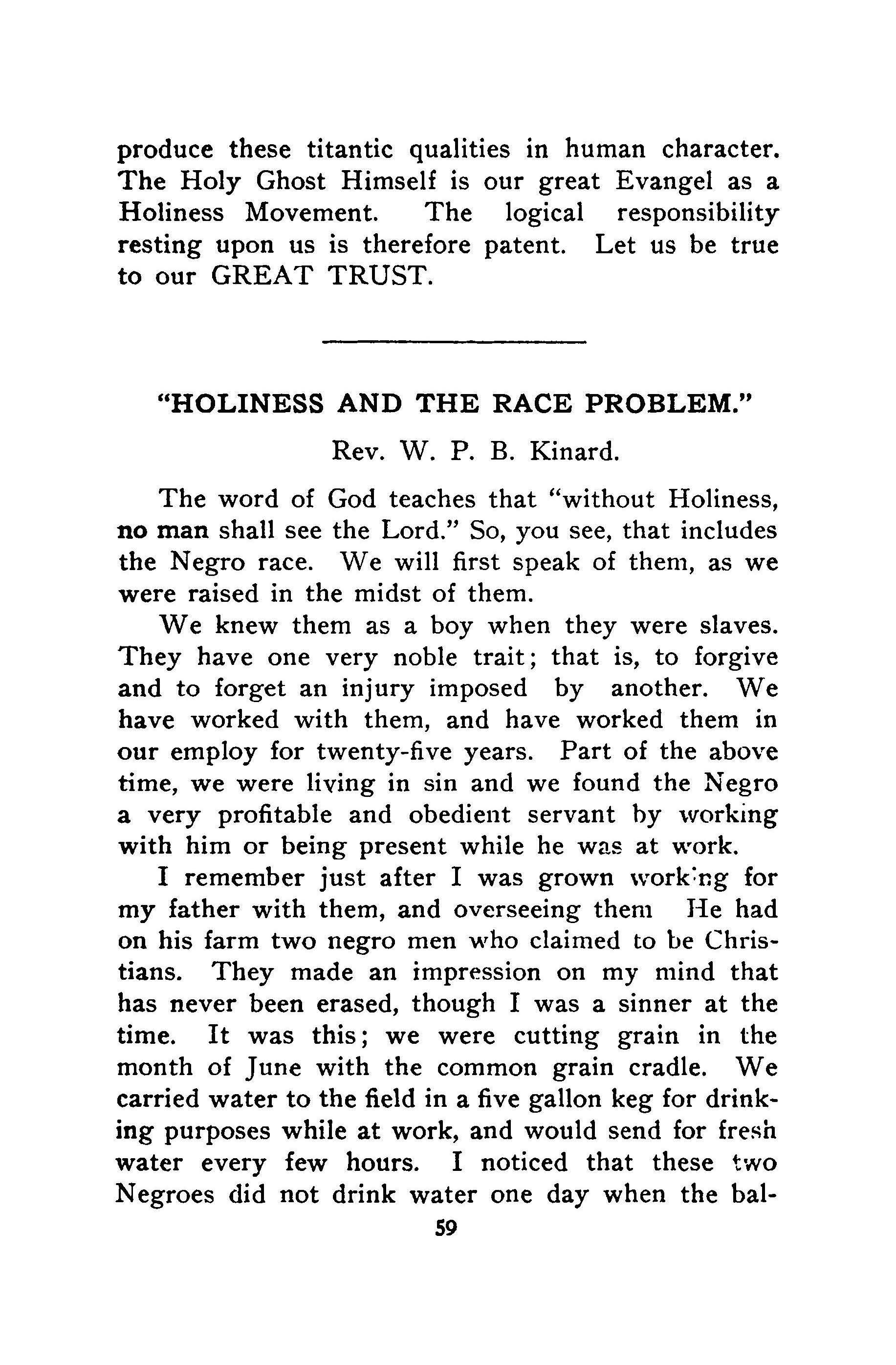
We knew them as a boy when they were slaves. They have one very noble trait; that is, to forgive and to forget an injury imposed by another. We have worked with them, and have worked them in our employ for twenty-five years. Part of the above time, we were living in sin and we found the Negro a very profitable and obedient servant by working with him or being present while he was at work.
I remember just after I was grown work:ng for my father with them, and overseeing them He had on his farm two negro men who claimed to be Christians. They made an impression on my mind that has never been erased, though I was a sinner at the time. It was this; we were cutting grain in the month of June with the common grain cradle. We carried water to the field in a five gallon keg for drinking purposes while at work, and would send for fresh water every few hours. I noticed that these two Negroes did not drink water one day when the bal-
"HOLINESS
ance of us would drink. So I asked them "What is the matter with you? Why don't you drink any water today?" They said, "Boss, we are fasting." I said "Alright, come ahead! I will make you drink water before night." But I am sure they did not eat nor drink any thing that day. I believe they were Christian Negroes, though they knew nothing of the blessing of entire sanctification, as it was seldom, if ever, preached in our country then.

I will give you some of my experience in dealing with them since I was saved and sanctified about twenty years ago. I have had no trouble with them since. Before that time I was ever ready to abuse them and said often that they had the devil in them, and needed killing. After being saved I found the trouble was largely with me. I have been preaching to them occasionally for the last fiften years, and in my first work with them in a small village where I was holding gospel tent-meetings, there were some sanctified negroes there that had the respect and confidence of the best white people of that community.
Wherever we find them instructed in the way of Holiness, we see the same result. Last fall at Benettsville in our fall holiness convention there were some sanctified negroes there, and the same thing was said of them. They were regular attendants at the sunrise prayer meeting at the gospel tent. I believe they helped much by their prayers in that meeting. I make it a point, wherever I go to hold a series of meetings under a gospel tent, to give them a few services and preach to them. And I am sure it always brings about a better state of feeling between the races. I am fully pursuaded in my heart and mind that they ought to have more preaching from 6o
white preachers than they are now getting, and especially from holiness preachers and evangelists. If possible, it ought to be arranged in ever community once a year by some leading Christian white man of that community to have holiness preached to the negroes.

Some five or six years ago we had a holiness meeting at my home under a gospel tent where the negroes were permitted to occupy part of the tent during services, and a special service was given them besides. This was a very profitable meeting for the races in our community. Our washer woman got sanctified in that meeting, and, so far as I know, she lived a consistent Christian life until the day of her death. She sent for me just a few days before she died. When I walked into the room where she was lying on her bed in the last stages of consumption, she said, "Boss, I'm so glad that you have come. They said you would not come, but I knew you would; for I told the Lord to send you, for I wanted to see you before I went home to Heaven." After reading the Scriptures to her, and explaining as I read, and sang a few hymns and prayed, I bade her good-bye and her last word was, "I'll meet you in Heaven. I am so glad you came."
I believe the Race Problem can be helped much by the white people getting full salvation themselves, and the farmers preaching holiness to the negroes on their farms, reading their Bibles to them and live what the Bible teaches on the subject of holiness. The merchants, lawyers, and bankers do likewise with the negroes they have in their employment and our good women do the same to the servants in the house and in the cook room, and at the wash tub.
We are fully satisfied that the Race Problem can be helped much by getting the negro preachers sanctified; they have a wonderful influence over their people. In fact everybody needs full salvation that they may have the Spirit of the Master. We have the cart before the horse in trying to educate apart from salvation. This country is wild on the subject of education. If you educate the mind and neglect the soul you have a dangerous piece of humanity on your hands whether he be white or black, and your work is a failure in the end. Keep salvation abreast, or ahead of every thing else, for "without holiness no man shall see the Lord.'' The negro ought to be educated first to know that he must work for his living. We notice that as the Negro is educated today, as a rule, they think that they are too good to work with their own hands, and they become a nuisance to the country and a curse to their own race. So let us press the battle on full salvation lines.
 Rev. E. C. DeJernette.
Rev. E. C. DeJernette.
"If a man therefore purge himself from these he shall be a vessel unto honor, sanctified, meet for the Master's use, prepared unto every good work."
2 Tim. 2 :21.
"But who may abide the day of the Lord's coming, who shall stand when he appeareth? for he is like a refiner's fire and like fuller's soap; and he shall sit as a refiner and purifier of silver, and he shall
purify the sons of Levi and purge them as gold and silver; and they shall offer unto the Lord offerings in righteousness." Mal. 3 :2, 3.
"Be ye clean, ye that bear the vessels of the Lord." Is. 52 :11.
"Who gave himself for us, that he might redeem us from all iniquity and purify unto himself a peculiar people, zealous of good works." Tit. 2 :14.
These four Scriptures clearly teach that God can and does purify people to the end that they may be zealous of good works.
The doctrine of holiness, sanctification, perfect love, or the Baptism with the Holy Spirit, for they are different names for the same experience, embraces in its accomplishment a negative work which subtracts or cleanses from the individual the sin-principle or selfishness ; the other part of the operation is the positive side and adds to or fills the individual with the Holy Spirit or Divine love. ("The love of God is shed abroad in the heart by the Holy Ghost given unto us." Rom. 5 :5). Love and selfishness, these two, are the positive and negative poles of a Christian life. I£ God is love, if love is the fulfillment of the law, if love is the bond of perfectness, it must be the source or principle from which all virtue or pure religion springs. If self is not to be pleased or sought, but denied, crucified, and put to death (Rom. 15 :1; Matt. 16 :24; Gal. 2 :20; 1 Cor. 13 :5) it must be the outlaw that is the instigator of all the sins and crimes which are abroad in the world. If love is the tree of life, selfishness is that root of bitterness that springs up to trouble man.
There is a spurious holiness being taught, sought and experienced by not a few in our country, it con-
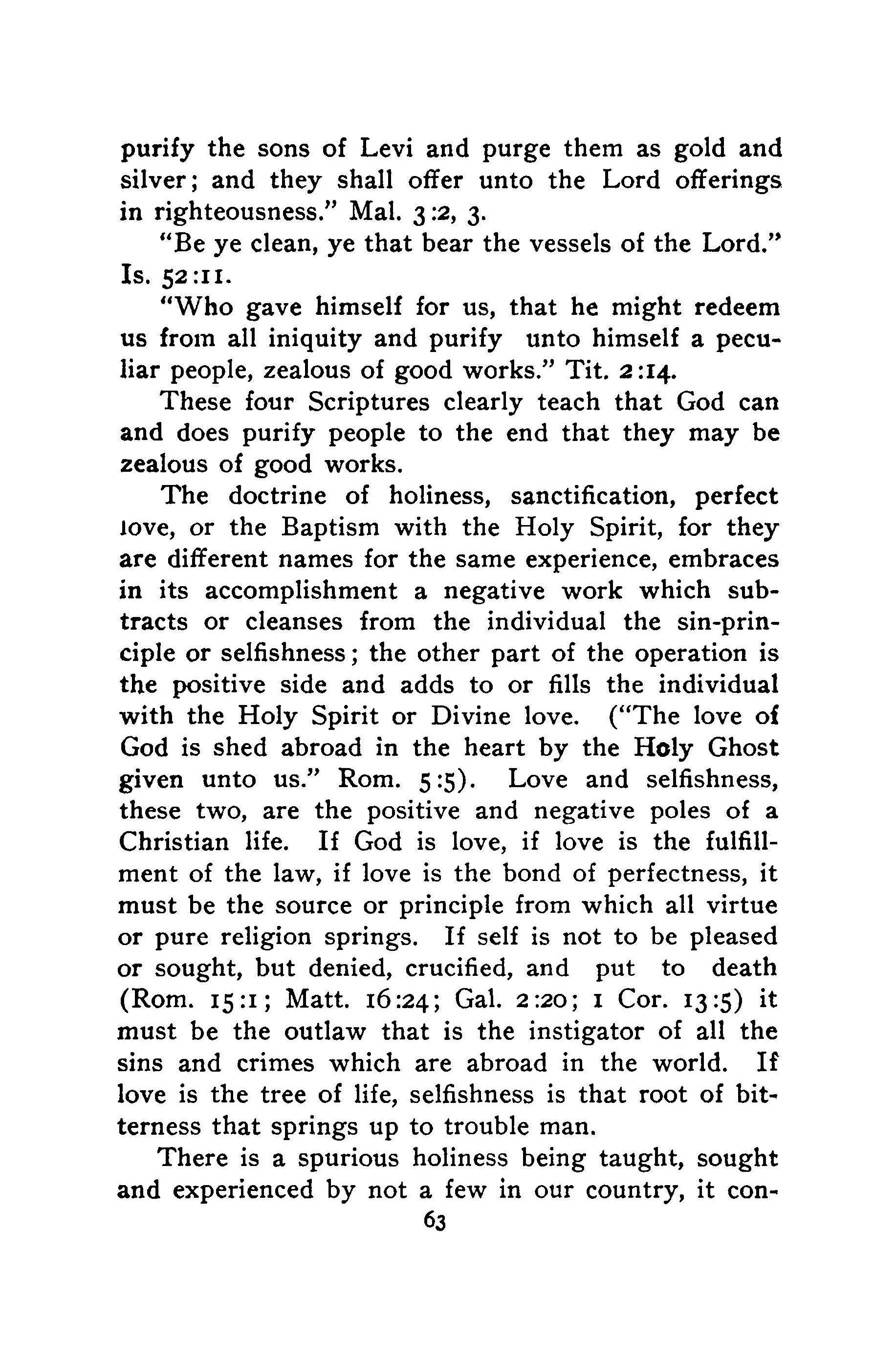
sists in ecstasies, shoutings, happy-feelings; these happifying emotions are constantly held up before the people as the thing to be sought after and experienced. This rocking-chair holiness, where folks expect to sit and sing themselves away into everlasting bliss, is refined selfishness-the Devil's brazen counterfeit which he is palming off on some people instead of the pure gold of perfect love, which consists in seeking not to please ourselves, but to serve others. Perhaps the majority of our holiness people would be leagues beyond where they are today in the grace of giving for charitable works, home and foreign missions, if our preachers would have emphasized the positive side of the doctrine of perfect love more. The negative or cleansing phase has heretofore engaged most of their attention. Some one has defined love as "going out of self to live in and for another." If the doctrine of perfect love does not mean principally service for others I have read the Book and the Christ in vain. The Father sanctified the son (Jesus) and sent him into the world, not to be ministered unto but to minister and give his life a ransom for many. "God anointed Jesus with the Holy Spirit and power who went about doing good." Acts IO :38. We are exhorted by Paul, (Phil. 2 :3, etc.) to have the mind of Christ "not looking each of you to his own things but each of you also to the things of others. Have this mind in you which was also in Christ Jes us-who emptied himself taking the form of a servant." John in his thirteenth chapter gives us the Master exhibiting an object lesson of perfect love being girded with a towel and performing the most menial service of foot-washing; and he says to his disciples I do this as an example for you to follow.

"Whosoever would become great among you shall be your minister, and whosoever would be first among you shall be your servant," Matt. 20 :26.
I believe there are not a few today who agree with me that this experience is not a kind of religious luxury to be consumed upon self, but it is a gift to be used in loving service for others.
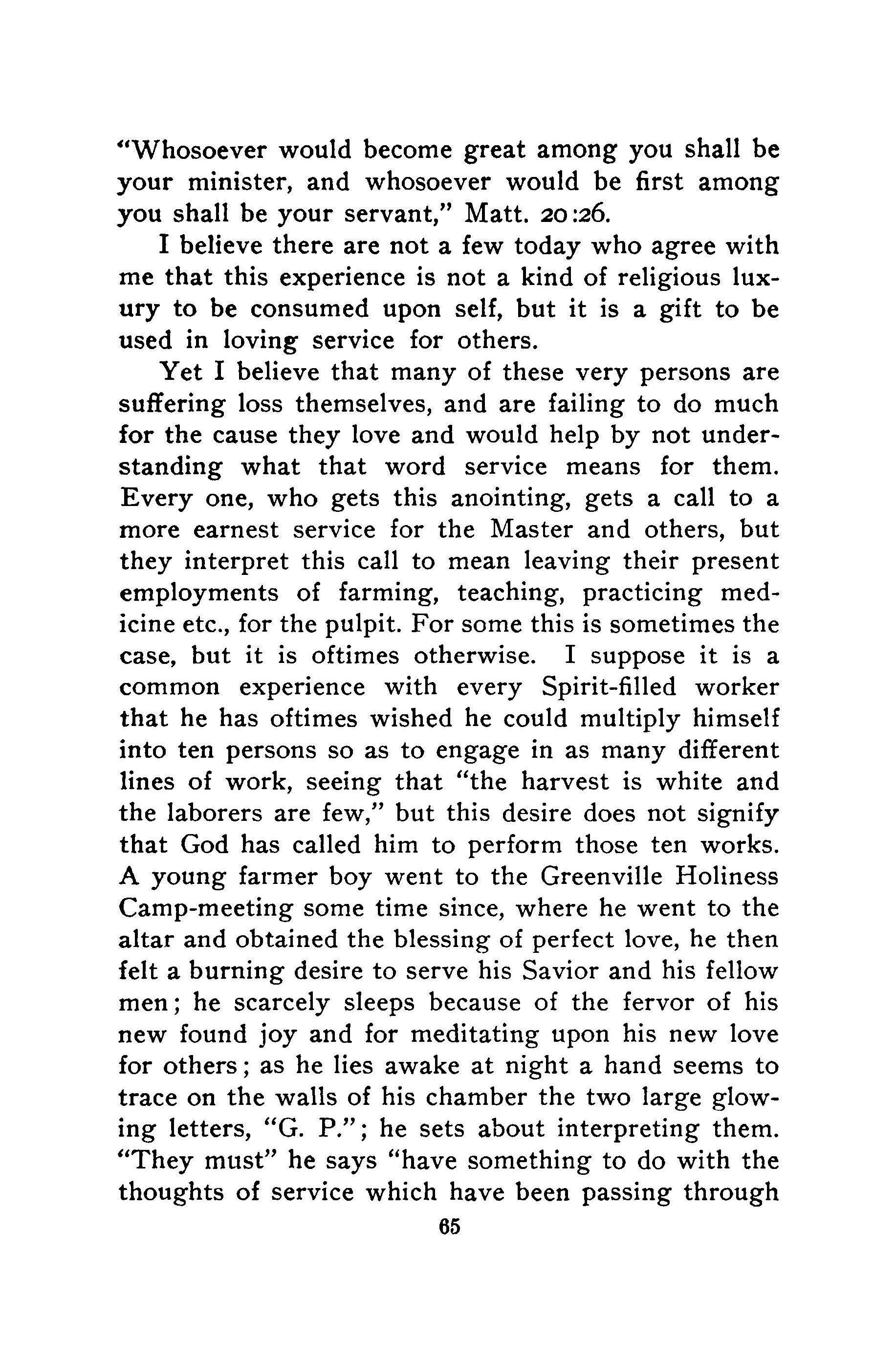
Yet I believe that many of these very persons are suffering loss themselves, and are failing to do much for the cause they love and would help by not understanding what that word service means for them.
Every one, who gets this anointing, gets a call to a more earnest service for the Master and others, but they interpret this call to mean leaving their present employments of farming, teaching, practicing medicine etc., for the pulpit. For some this is sometimes the case, but it is oftimes otherwise. I suppose it is a common experience with every Spirit-filled worker that he has oftimes wished he could multiply himself into ten persons so as to engage in as many different lines of work, seeing that "the harvest is white and the laborers are few," but this desire does not signify that God has called him to perform those ten works. A young farmer boy went to the Greenville Holiness Camp-meeting some time since, where he went to the altar and obtained the blessing of perfect love, he then felt a burning desire to serve his Savior and his fellow men; he scarcely sleeps because of the fervor of his new found joy and for meditating upon his new love for others; as he lies awake at night a hand seems to trace on the walls of his chamber the two large glowing letters, "G. P."; he sets about interpreting them. "They must" he says "have something to do with the thoughts of service which have been passing through
my mind the last few days" "G. P. what can that mean" says the plow-boy as he looks intently upon the mysterious letters. "G. P. Well, yes, I believe I know what they spell "Go Preach," "yes, certainly it can mean nothing else." Did not old Sister Summers say the other day when I gave my testimony at the prayer meeting, that I talked like a preacher and that she verily believed that God had cut me out for one? Did not Grandma tell me that that prayer I offered at the family altar yesterday would have done credit to a bishop? Did not Brother Brown say today that I must hold the next prayer meeting at Mt. Joy church on Sunday night? of course those letters can mean nothing else but "Go Preach."
With this vision vivid upon his mind the plow-boy falls asleep. He dreams that his Lord, whose he is and whom he so much desires to serve, comes and stands by his bedside and addresses him thus :-"My child I have with pleasure witnessed that ardent desire to serve others that has characterized you since the hour you wholly abandoned yourself to me and was filled with perfect love, and I am come to reveal the meaning of the hand writing, which you saw upon the wall. You have mistaken the meaning of the "G. P.", instead of standing for the words Go Preach it signifies "Go Plow." My child there are many more ways of serving others and myself than by the pulpit.
I want you to plow now for others, where heretofore you have plowed for yourself. The world that lieth in the wicked one must have bread or they will perish with hunger, I want you to plow to help furnish that bread, whereas you once plowed for a living for yourself as other gentiles do, now in your plowing I want you to seek the living of the other fellow or in
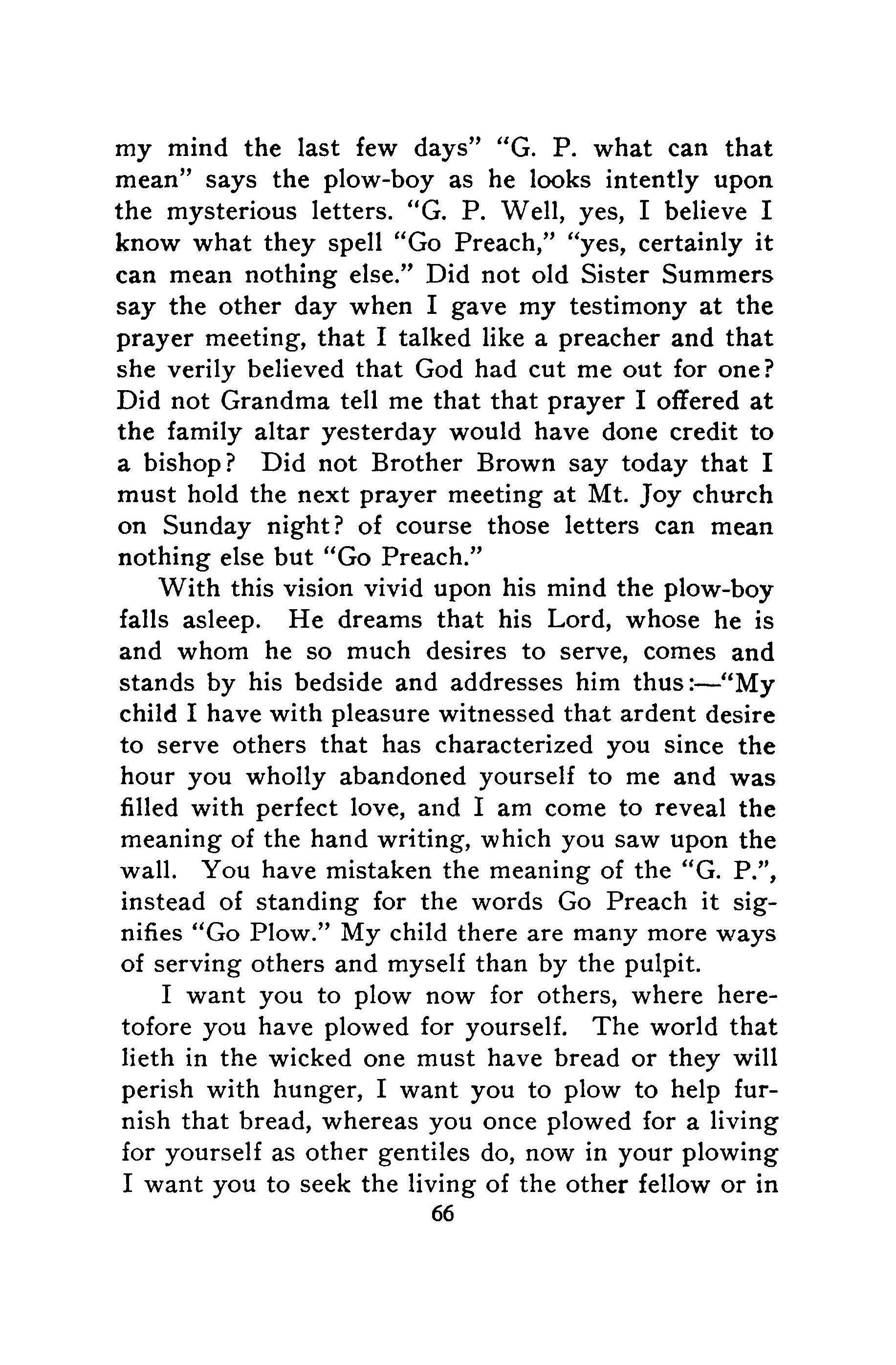
other words by acts of love win and woo the other fellow to the kingdom of God and I will see to it that your own food and raiment shall be given yott, for I know that while you plow for me and others that you will have need of these things. Have I not said "Trust in the Lord and do good so shalt thou dwell in the land and verily thou shalt be fed?" Does not my Father send the sunshine to the evil and the good and the rain upon the just and unjust, and does he not love his enemies and do good to those that despitefully use him? So must you do if you would be perfect like your Father in Heaven. Love your neighbor as yourself; you used to plow for yourself, now plow for your neighbor, and for me, for perfect love seeketh not her own but another's good. Again I want you to go and plow for I have servants whom I have called to give their whole time and energy in preaching the everlasting Gospel of perfect love, and they will not be popular with the people, and not many will give them food to eat and clothing to wear, so I have need of sane~ tified farmers, who are in hearty sympathy with this doctrine, to plow and sow and feed my holiness preachers and you will share with them in the sheaves they bring in at the harvest time.
"Go plow;" there are some of my servants who have crossed the seas, leaving their nets, and lands and homes, to carry the glad tidings of salvation to the darkened and ungrateful heathen; with the tithe of that rich bottom farm that I have entrusted to you I want you to support one of those faithful missionaries. Again -you have seen how my holiness preachers cannot obtain church houses in which to preach to the people. I want you to put up a shed in that beautiful oak grove, that I have caused to come into your
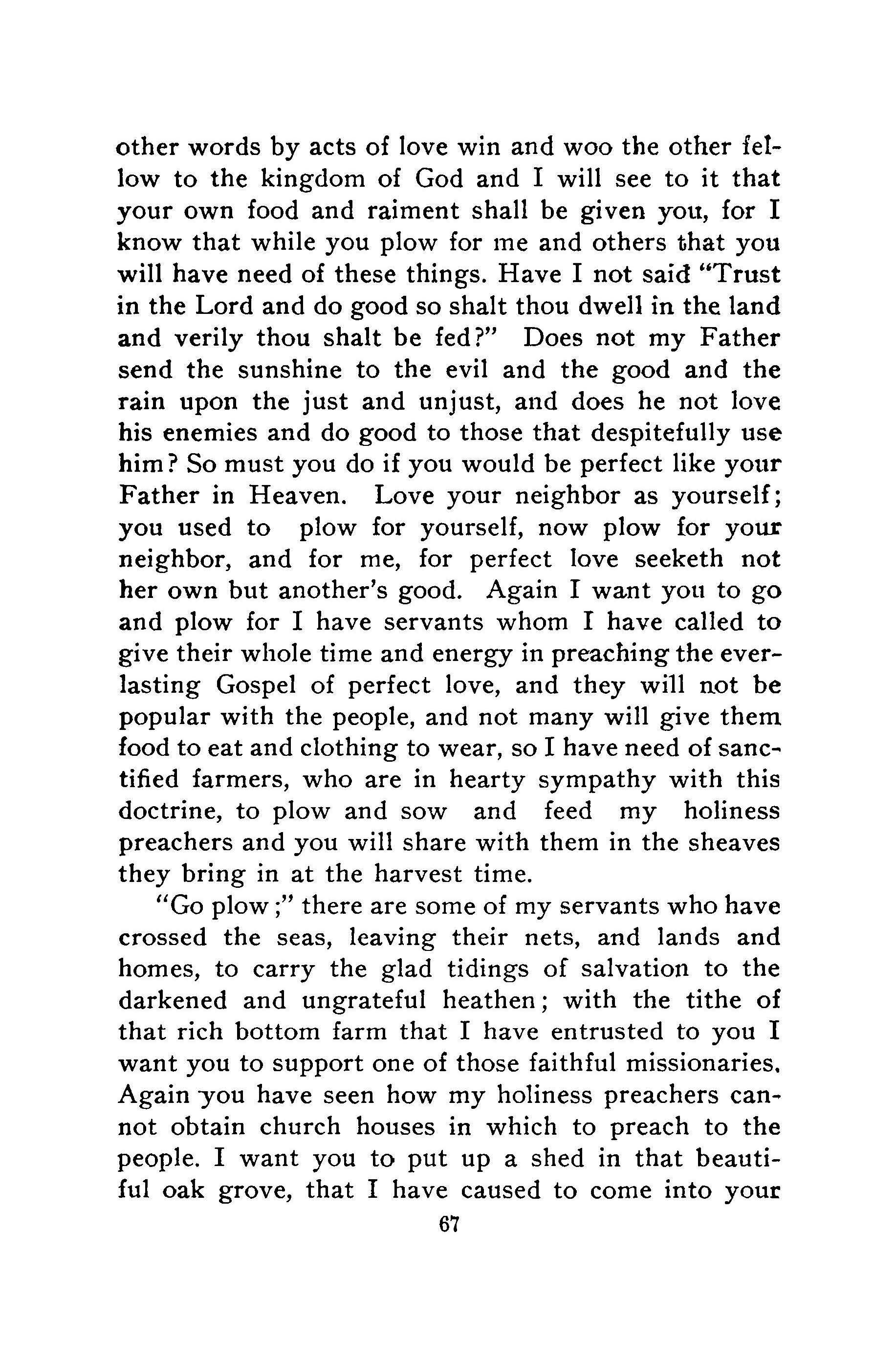
possession by inheritance so that my scattered sheep may be gathered together and fed upon the pure word of God. My child 'one sows and another reaps' but in the harvest both will receive their wages and rejoice together, So I say unto you go plow and whatsoever is right I will pay you.
Again I need you to show your neighbors who work just across the fence from you that the Lord has power to keep a farmer boy sweet in his temper though he has to plow a stubborn mule in stumpy land. The dream was ended by the farmer boy's shouts at the prospects of serving his Lord and his race in his present place and occupation.
There is another grave mistake made by others by considering that the sanctified man's service for others ends with the present age or mode of existence, when in fact it is scarcely begun, for the Bible clearly teaches by the parables of the talents and unjust steward that in this present age or life we are entrusted with a few things, in which, if we prove faithful God our Master will hereafter make us ruler over many things or peoples ; and Jesus says that a ruler in his kingdom means a minister or servant. The sanctified alone are to become kings and priests unto God in the age to come and will then enter upon their highest service for God and others; but this does not signify that all who are not found among this elect number of overcomers or members of the bridehood are going to be sent to hell with the impenitently wicked. If the sanctified-who are a little flock-are to become king-priests, they must have subjects whom they may serve in this capacity, these subjects will not be the Devils or the impenitently wicked in hell, but I think it will be that large, crownless multitude that

no man can number-justified ones, who have washed their robes in the blood of the Lamb-and have been made to pass through the great tribulation, (see Rev. 7 :9-17). I give a few Scriptures to confirm this last position-namely that the persecuted, humble and few sanctified ones are the only ones, who will occupy that exalted place of honor and usefulness referred to in the book as king-priests :-Luke 22 :28-30, says, "But ye are they which have continued with me in my temptations; and I appoint unto you a kingdom even as my Father appointed unto me, that ye may eat and drink at my table in my kingdom and ye shall sit on thrones judging the twelve tribes of Israel.''
Luke 12 :32, 42-44. "Fear not little flock its your Father's good pleasure to give you the kingdom. And the Lord said who then is the faithful and wise steward whom his Lord shall set over his household, to give them their portion of food in due season? "Blessed is that servant whom his Lord when he cometh shall find so doing. Of a truth I say unto you that he will set him over all that he hath." 2 Tim. 2 :11, 12 says "Faithful is the saying; for if we died with him we shall also live with him, if we endure we shall also reign with him." Rev. S :9, IO. "Worthy art thou for thou wast slain and did purchase unto God with thy blood men of every tribe and tongue and people and nation, and madest them to be unto our God a kingdom and priests; and they reign upon the earth." Rev. 20 :6. "Blessed and holy is he that hath part in the first resurrection; over these the second death hath no power; but they shall be priests of God and of Christ and shall reign with him a thousand years." See also Matt. 20: 27-30; Rev. 2: 25-27; Rev. 3: 21.

Special interest in the higher education of woman has a comparatively recent date. In the Southland, particularly, was the curriculum of a college long denied her. Your own fair State of Georgia, however, was pioneer in opening the way for woman's education. It was my great pleasure this past summer to become acquainted with the woman who was the first to graduate from a chartered college for women. We are proud that a Southern woman has this distinction.
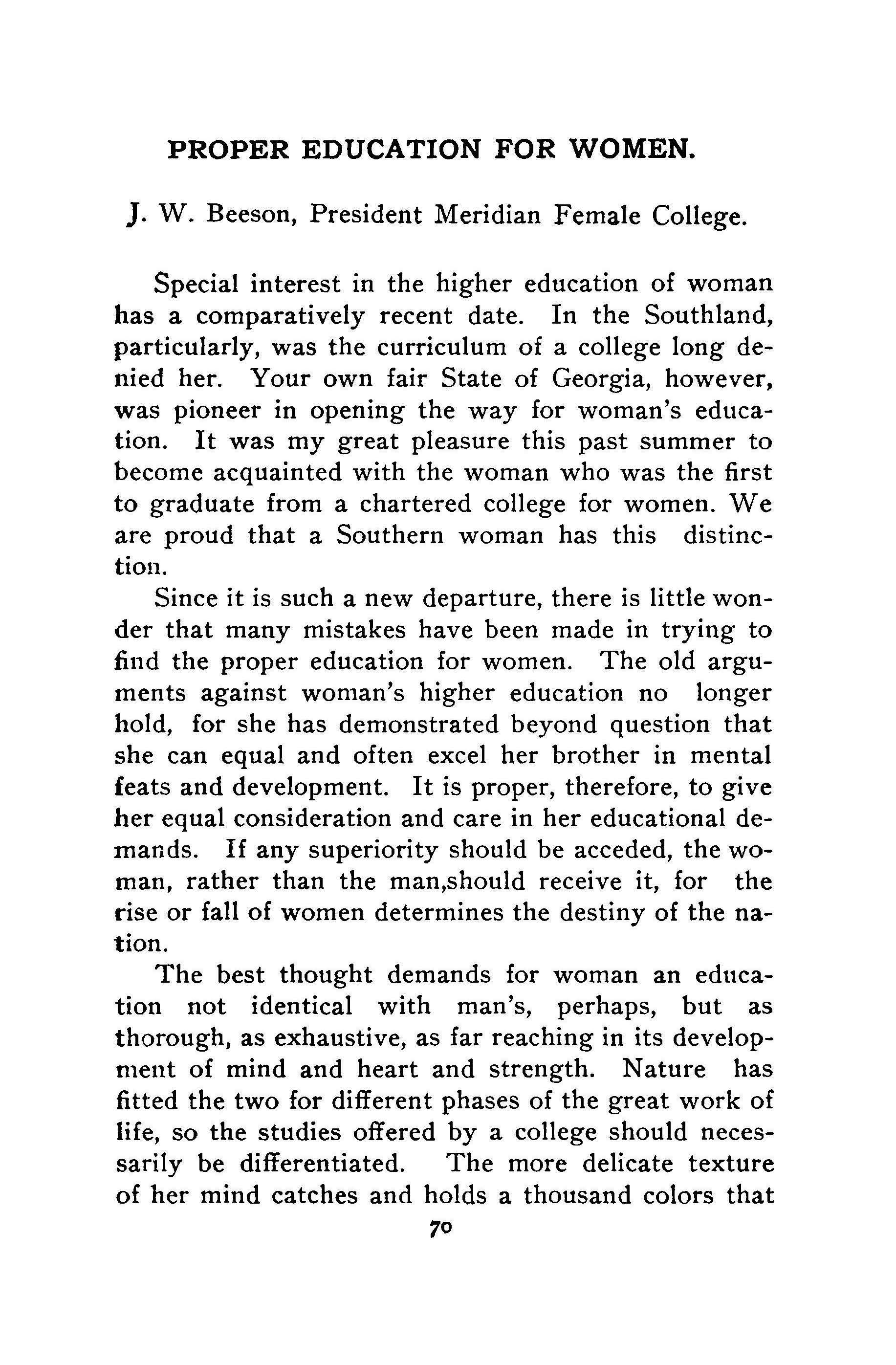
Since it is such a new departure, there is little wonder that many mistakes have been made in trying to find the proper education for women. The old arguments against woman's higher education no longer hold, for she has demonstrated beyond question that she can equal and often excel her brother in mental feats and development. It is proper, therefore, to give her equal consideration and care in her educational demands. If any superiority should be acceded, the woman, rather than the man,should receive it, for the rise or fall of women determines the destiny of the nation.
The best thought demands for woman an education not identical with man's, perhaps, but as thorough, as exhaustive, as far reaching in its development of mind and heart and strength. Nature has fitted the two for different phases of the great work of life, so the studies offered by a college should necessarily be differentiated. The more delicate texture of her mind catches and holds a thousand colors that
his never sees. Her acute sensibilities are pained, harrowed by sights and sounds by him unnoticed; her strong perceptive powers, with confidence born of intuition, grasp with rapidity what her brother struggles for with greatest effort.
It will be profoundly important, then, that the subjects presented to woman in her college years should bear at least indirectly upon the problems that await her in the sphere to which she is called-and by "woman's sphere," I mean no limitation, but an exalted position among the affairs of life, whose boundaries only God himself can fix. The home-life will continue to be the noblest kingdom of them all-despite what pessimists and rabid, uninspired prophets may say!

So far, I have spoken of the college education merely. And, in passing, I must admit that after years of experience with separate and co-education, I find the former decidedly better, even if it necessitates a greater cost. The superior results overbalance the excess of expenditures. In the universities, where woman's inclination leads her, let her feel free to choose whatever field she wishes. Her inherent womanhood will prevent her going to extremes.
As educators of Christian colleges we must recognize that thorough college work is three-fold; that while developing the spirit and mind, the body must not be neglected. So a sound physical education for women certainly enters into the demands of a properly arranged scheme of studies. The value of a healthful body, first, possessing that grace which comes only from an adequate physique is of vital importance in creating the higher womanhood. Develop the spiritual nature alone, the result is a fanatic; the intellectual merely, gives society the rascal; the physical
over-developed makes the brute, the pugilist, the modern athlete-such as some educational institutions are sending forth.
It is rare to find a girl who is physically perfect. Dress and mode of life have contributed largely to deform her, even though she have no inherited defect. I believe that this phase of education is so important that it should be on a plane with the other branches of studies. Time is too short just here to outline the method most strongly advocated, but my own theory is that daily out-of-door exercise, under the superintendence of a careful director, is much better than periods twice or thrice a week within the walls of a gymnasium.
In outlining the proper education of woman, we would lay especial emphasis on the need for industrial training. She should be prepared for a life not dependent on man for a support. The various industries now open to women give her vast opportunities to become a producer, side by side with her brother if she so desires. She no longer has to look to marriage as an escape from a life of dependence and unemployed energy. She should be so trained that if God should call her to be queen of the home she would be well instructed in all branches of domestic science and the art of home-making. She should be queen of the kitchen as well as the drawing-room and know thoroughly the practical value of scientific knowledge of foods-their composition and powers of nutrition. The rescue of the Southern people from that dyspepsia thrust upon them by the savory,but unwholesome, dishes prepared by the "black mammies" must come from trained cooks sent out by educational institutions.
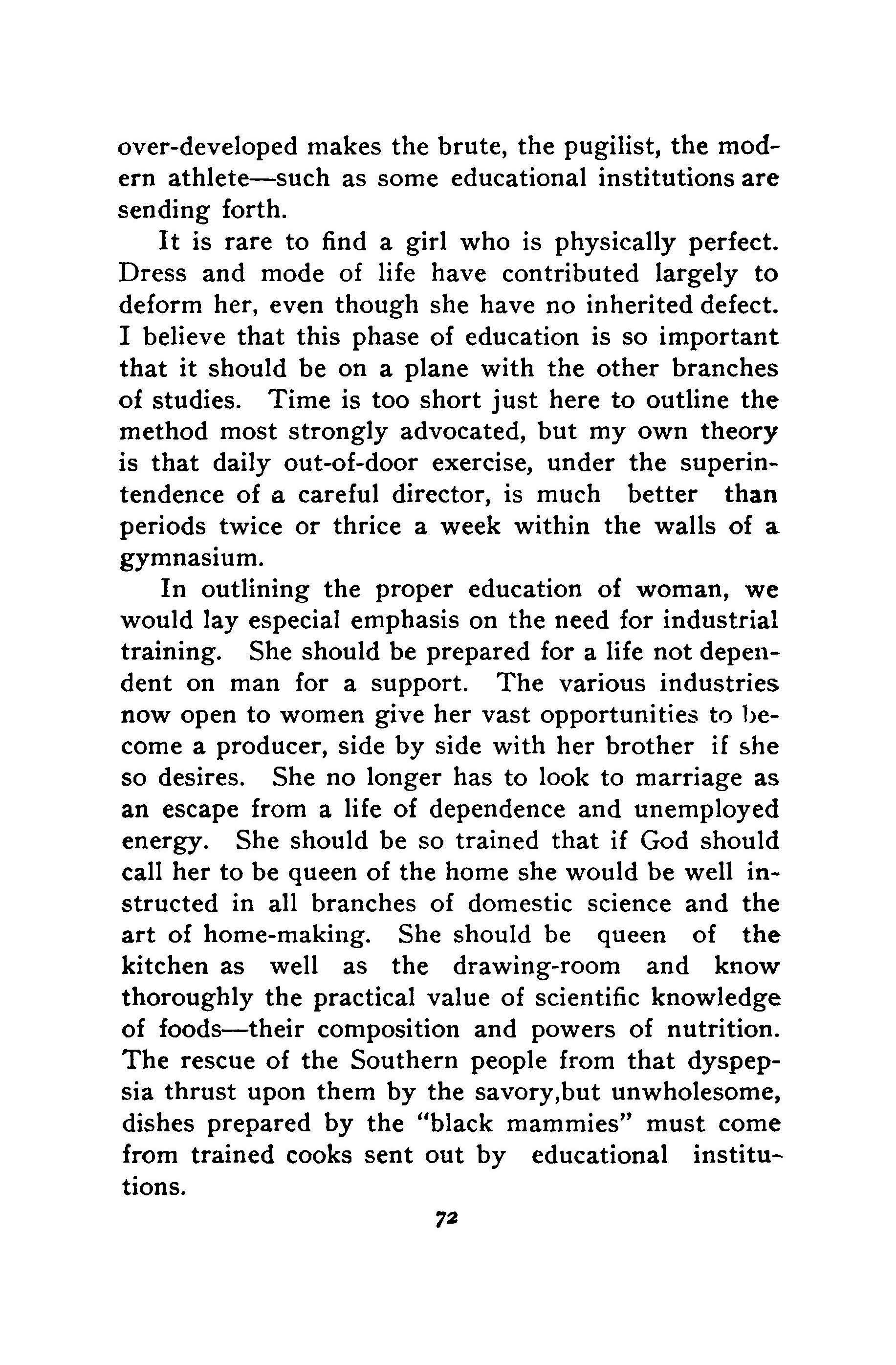
A good practical knowledge of dress-making, home nursing, home-sanitation, and household economy generally should be incorporated in the curricula offered to women.
In so many colleges the ornamental side of life is cultivated to the exclusion of the practical. How to do the "society act," to dress according to the latest fads-whether that fad demands short sleeves or no sleeves,-to get a smattering of English, to "parlezvous" in a few French phrases, to skim a few lines of Latin,-in short, to do surface work throughout-this is what many colleges pass off as "education for women." May we awake to the unjustness of such deceits! By the help of the Lord we intend to do what we can to reverse this order of things as much as lies in our power. We intend to prepare women for the real issues of life.
Again, the proper education of women demands above all things a solid grounding in the deep things of God as revealed in the Holy Scriptures. To this end there should be a department of Biblical instruction of equal importance with any other department. Jesus came that we might have life and that we might have it more abundantly, and this abundant life should be offered, urged upon every woman who enters college. Necessarily, there must be the proper spiritual environment ere the Holy Spirit can have free access into the hearts of the students.
The state schools make no pretense to spiritual training. The average church school makes little more than a pretense towards the highest spiritual training. The Methodist schools are supposed to make good Methodists, the Baptist schools are expected to make good Baptists out of the students. The Presbyi'3

terian schools must see that the pupils are fed on "'Shorter Catechism" and send them out good Presbyterians. The Episcopal schools are much concerned to see that they are well drilled for confirmation and are sent out good churchmen; but where are the colleges that are seeing to it that their students are sent out stalwart Christians, rooted and grounded in the deep things of God, filled with the Holy Ghost and prepared for His service. I believe it is in the main the Holiness colleges that are doing this. They alone are putting first things first. Other colleges are leaving out "the one thing needful."
There is one final point I wish to maintain in the education of our girls. That is, the importance of having them under godly teachers, and most careful home influences and religious surroundings. It is important that they be as carefully protected and guarded during the formative period:, of their lives as it is possible. In this fast age, in this fast country, "Free America," our young people are living at a rapid rate, and with almost criminal freedom. Our grandparents have been shocked times out of numbers at the liberties and forwardness of the young people of this generation. We have little family government, except where the children have their parents under good control. Parental government is at a lower ebb in America today than in any country under the sun. As a natural consequence of this, crime is greater in this country per capita than in any civilized nation on the globe, and is increasing at an alarming rate. In Germany there are five homicides annually to every million of population ; in England and Wales there are ten to every million; in the United States one hundred and thirty to every million. In twenty-five years
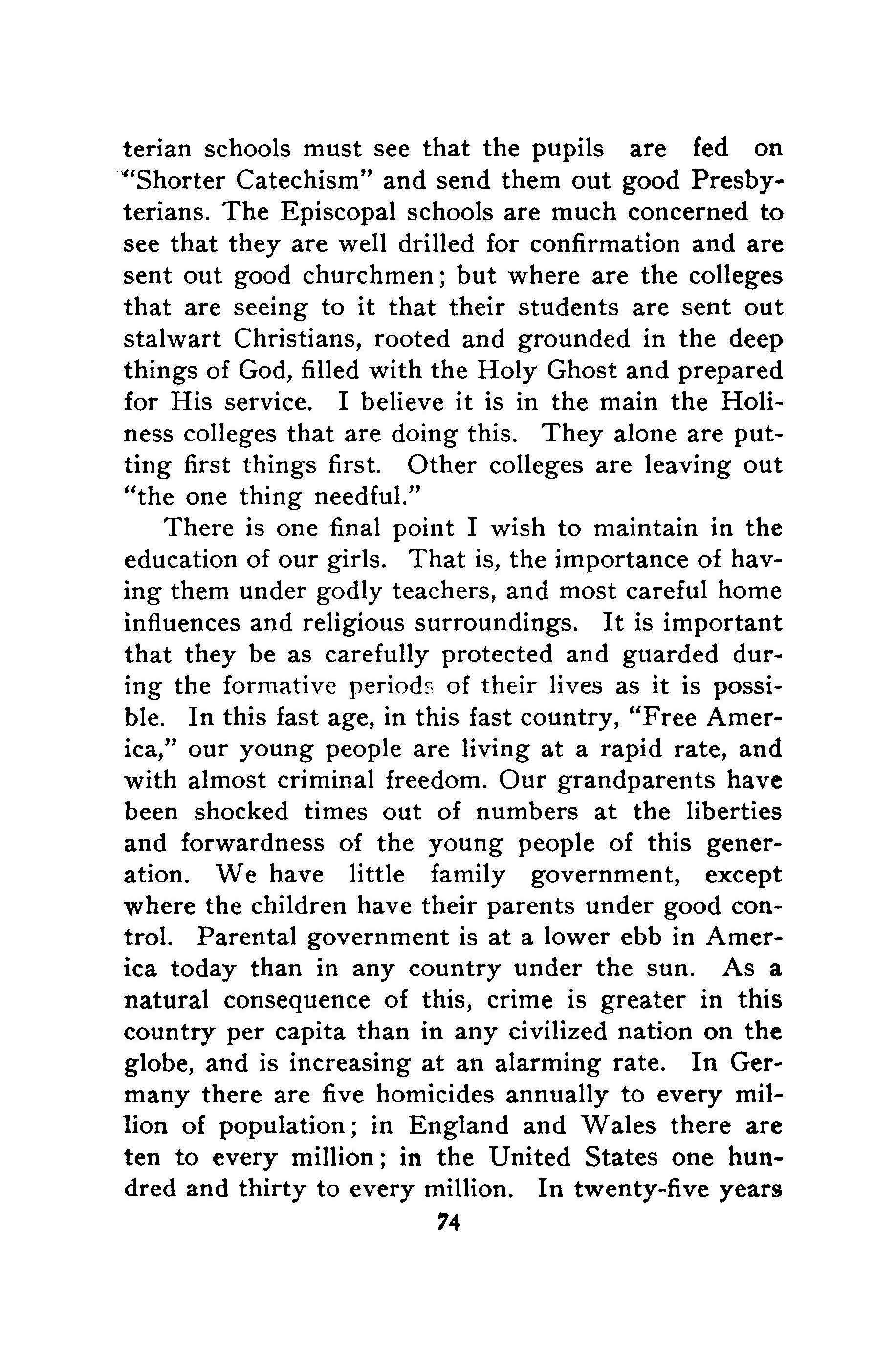
the rate of homicide has become four and one-half times greater in our country; or where, in 1881 we killed twenty-five out of a million, in 1903, we killed one hundred and twelve per million. On yesterday we slew twenty-five people, today we are killing twenty-five, tomorrow we will average twenty-five, and so on until God himself in some way will terminate this ever increasing avalanche of crime. In this age of forwardness, freedom and crime, is it not of the utmost importance that we throw every safe guard possible around our girls-give them the most careful supervision and the most effectual discipline? The devil is fighting for our girls at every turn. He bids for them on every corner and through apparently the most innocent ways. He comes "as an angel of light," as a "wolf in sheep's clothing," as a devil dressed in man's apparel. Do not tell me that the 6oo,ooo fallen girls in America were all wayward, depraved girls. They were once as pure and as sweet and as innocent as your beloved daughter. Satan set a trap for them. He is setting it for your girl. He would rather entrap the daughter of a holiness man or woman than any one else. He is entrapping some of them.
If they all had the safest and best surroundings and protections during their school life as well as in their home life, there would be much less work for Brother Upchurch and other rescue workers to do. Fathers, Mothers, let us wake up and give better and more careful supervision over our daughters, and throw a greater safe-guard around them in the home and in the school than ever before. Let us give them the highest and best education possible along right lines, training not only the head and hand, but the heart as well.
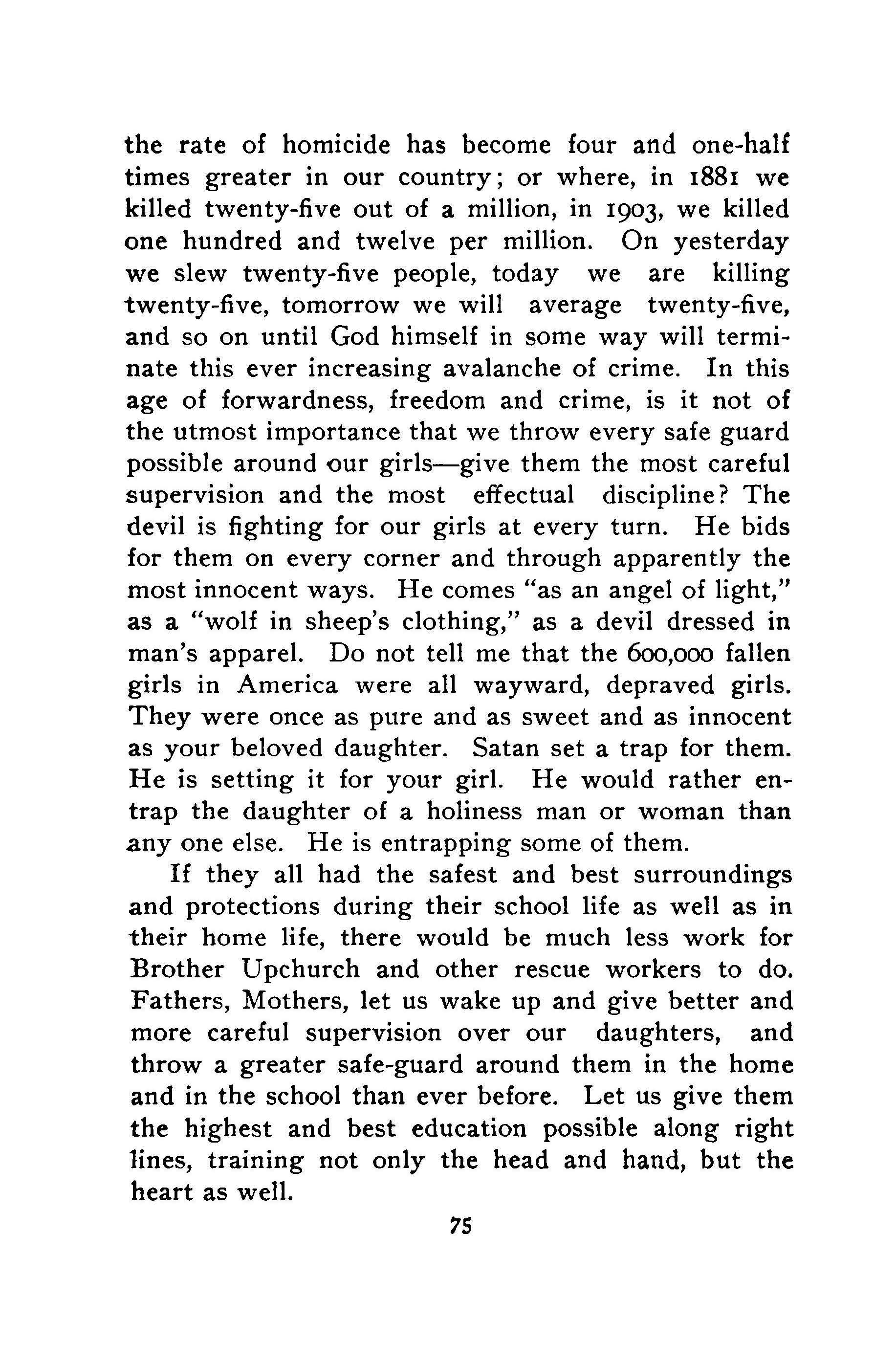
I know of no better way to discuss the theme assigned me on this occasion, "Holiness and the Slums," than to search the Scriptures and ascertain what, if anything, they may have to say upon this subject.
The "slums," as we call them, defined by Webster as "A back street of a city, especially one filled with a poor, dirty, and vicious population," are the breeding and hiding places of many kinds of sin, especially of sins of impurity; and my purpose today is to find the "specific," as the doctors call it, for those forms of sin which are most in evidence in the slums. It is "the social evil," as it is euphemistically called, that finds congenial soil for its rankest growth in those places. It may be, and probably is, true, that on many of the "front streets" in our cities there is as much, if not more, of this same kind of sin; but in the marble mansions and brown stone palaces there are no grinning skeletons peering through the front windows to attract the notice of the passers-by; they are all hidden away in the inner closets, out of sight.
There are two passages in the Word of God that seem to me to throw special light upon this subject;
(I) "The Woman that was a Sinner" in the house of "Simon the Pharisee" (Luke 7 :36-50) and, (2) "The Woman taken in Adultry" (John 8 :1-n).
Sin assumes many forms and manifests itself under many different aspects. Sometimes it is weakness, sometimes wickedness, sometimes wretchedness ; sometimes guilt, sometimes slavery, sometimes pollution. Each sin, in fact, contains each of the above
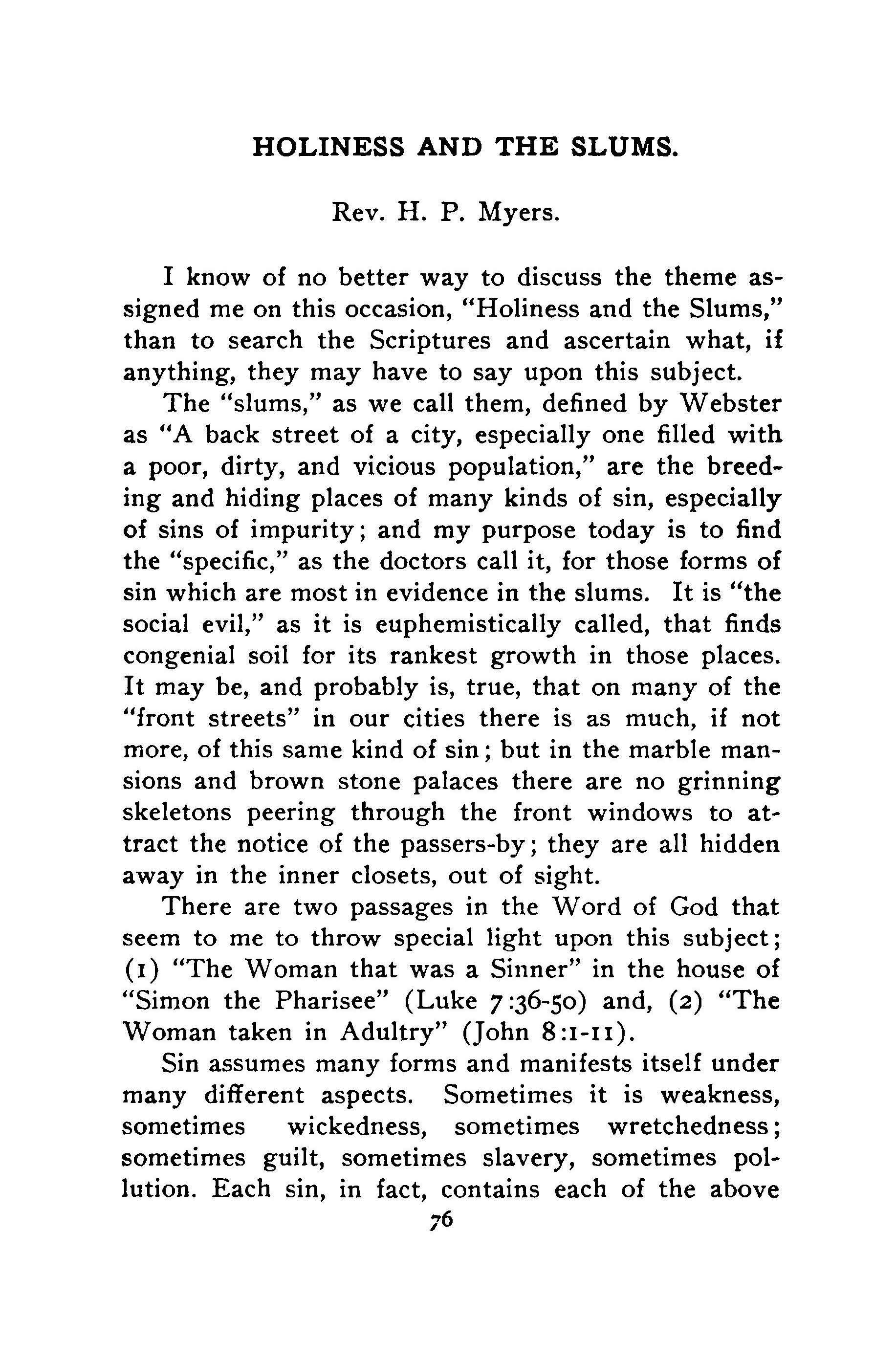
ingredients, but in varrying proportions. But every kind of sin requires a different treatment.
Now if there was any one thing that Jesus Christ did understand it was the treatment of sin. It is the core and kernel of his teaching. How to deal with sin under its manifold forms of manifestation is the key to the interpretation of his parables and miracles. No one who denies the fact of sin as an element in the make up of humanity as it now is-sin existing as a nature before it manifests itself in act-can understand, much less expound, the miracles and parables of our Lord. No one who denies the possibility of its complete eradication preaches a gospel sufficient for the world's need. Of Christ's method of dealing with sin and his skill in bringing the matter to a successful issue, the two passages cited above are luminous illustrations. Within the limits of time assigned me I can only discuss the latter passage-and that very briefly and imperfectly. The paragraph might be headed, "HOLINESS dealing with SIN."
These scribes and Pharisees had set a very skillful trap for Jesus Christ. They bring before him a woman taken in adultery, "in the very act;" guilty beyond the shadow of a doubt. They ask him what shall be done in her case; shall she be released, or stoned? If he says "released," they will accuse him at the bar of public opinion of disloyalty to the Laws of Moses ; if he says "stoned," they will accuse him at Pilate's bar of arrogating to himself the power of life and death, and so bring on a collision between him and Rome. Surely, he is ensnared 110w!
But hellish cunning is no match for heavenly wisdom. He will not be entrapped; he will entrap them. He simply says, "He that is without sin among you,

let him first cast a stone at her;" and the narrative goes on to state, "And they, when they heard it, went out one by one, beginning from the eldest, even unto the last; and Jesus was left alone, and the woman, where she was, in the midst."
There are two axiomatic truths in the philosophy of salvation. The first is :-The sinless alone can save. The second is :-The sinner alone can be saved. No man was ever saved until he felt himself a sinner; no sinner was ever saved by a sinner like himself. In this humiliating scene, occurring as it did in the precincts of the temple at Jerusalem, so painful and embarrassing that Jesus himself stooped and wrote upon the ground, the adulterous woman was not the only sinner; neither was she the worst. Accuser and accused-all were sinners. She fell-and, under the law, she ought to die. Who knows under what stress and strain of temptation she had been until her virtue reached its breaking point and fell into ruin. But what of theirs who cared not for her suffering or her recovery if only they might use her misery and shame as something with which to bait a trap set for Jesus the Christ. Here they are, spotless in reputation, high in position, rigid in judgment, wiping their lips and pointing the finger of scorn at this woman as she sinks in a heap upon the pavement, crouching and cowering under the publicity of her shame.
It is not that Jesus is trying to save this woman's life. He is reaching after souls. I doubt not but that, if the rightful authorities had condemned her then and there to death, he would have refused to lift a finger in her behalf. It was not that he desired to awaken a sense of her sin in her soul; discovery had already done that; she already knew what a lost,
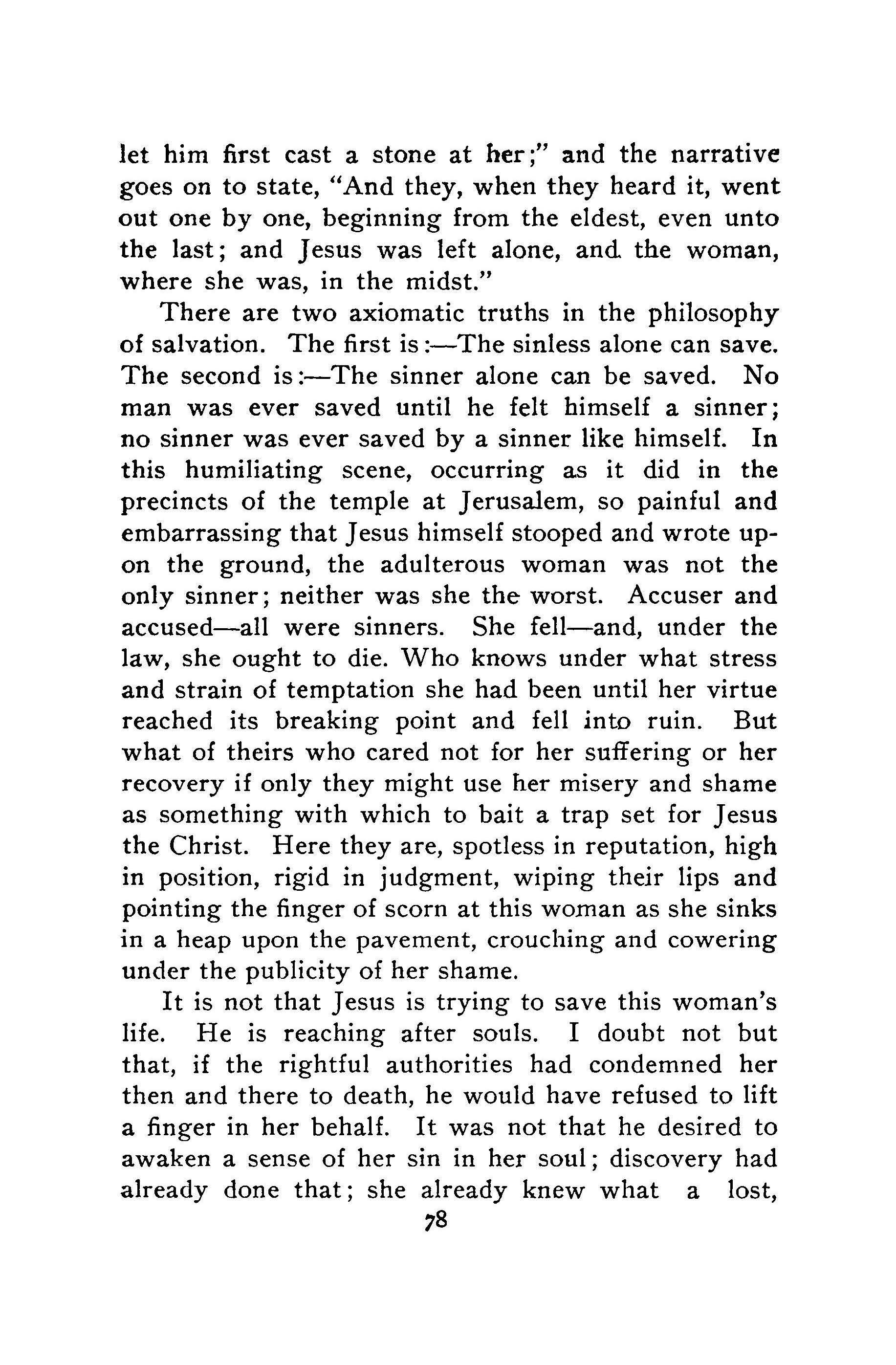
guilty creature she had become. He wants to reach and to rescue all. He has two sets of patients and he wants to apply the appropriate remedy to each. He would have the scribes and Pharisees look AT their sm. He would have the woman look AW A Y from hers-to him. They need convicting; she needs comforting. And the treatment proved a great success: at the beginning only one was conscious of guilt-the woman; at the end only one of innocence-the Christ.
There are two thoughts I would dwell on a little:
1. The Omnipresence of Conscience. How clearly this incident manifests the "amount of unascertained guilt every man carries with him, guilt that he is not distinctly conscious of, but that a little shake awakens, and that weakens him all through his life in ways that he may be unable to trace."
Silence falls upon the group. Jesus stoops again and with his finger writes upon the ground. He has already written deep upon their hearts. The woman cowers, awaiting, doubtless, the shower of stones that will beat out her life. How can she know how fearfully conscience is at work in the breasts of such immaculate men? It is a fearful risk for her. If in that company there had been one man whose conscience was clear she must have lost. But not one of them can abide the test. She is saved.
The other thought is this :-
2. The Omnipotence of Holiness. "This encounter of Jesus with the leading men gives significance to his subsequent challenge: 'Which of you convinceth me of sin?' He had shown them how easy it was to convict the guilty; but the very ease and boldness with which he had touched their conscience convinced them that his own was pure. In a society honeycombed with
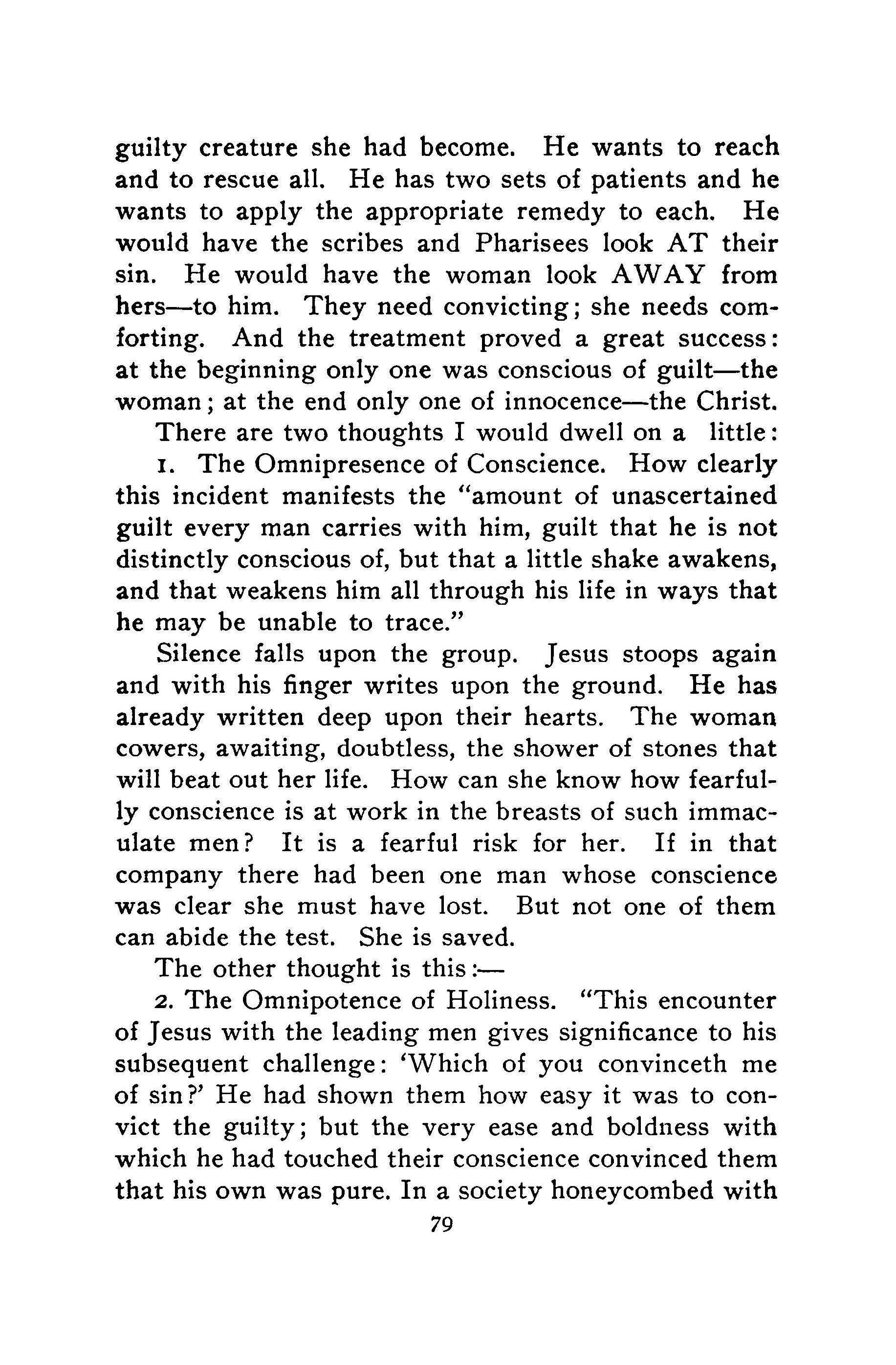
vice, he stood perfect, untouched by evil." It was his HOLINESS that constituted both his defence and the sword of his attack.
The social evil is one of the most appalling evils of our time. It p.ermeates all classes of society, all races of men, all grades of culture. It is, perhaps, the most wide-spread, deep-seated, gangrenous sin of the world. If there is one evil which the holiness people should feel called on to combat, it is this one-both in its sources and in its end; in its roots and in its fruits. And we must begin at the beginning, too. The Theatre and the Ball-room are its potent allies. According to statistics the latter is the most successful recruiting ground for the stews. As to the formerwell, say what you will, this fact remains; in these latter days the woman whose name becomes besmirched betakes herself immediately to the stage, sure of a welcome. The theatre is one market where the most damaged goods commands the highest price.
As holiness people we deem it our solemn duty, to take this most serious business in hand and apply both the preventive and the cure. We ought to set our faces against sensuous music, erotic fiction, suggestive pictures, gilded sin. Do you know that much of the music heard in our Christian parlors, is the seepage of the Vaudeville stage? that much of our advertising of businesses conducted by Christian men should be classified as "low middling"-half way between decency and the "demi-monde?" that we are putting into our school libraries tons of the so-called modern "realistic fiction" to cultivate modesty in our girls and purity in our boys! We ought to stop the leak in the crevice when it is but a trickling stream.
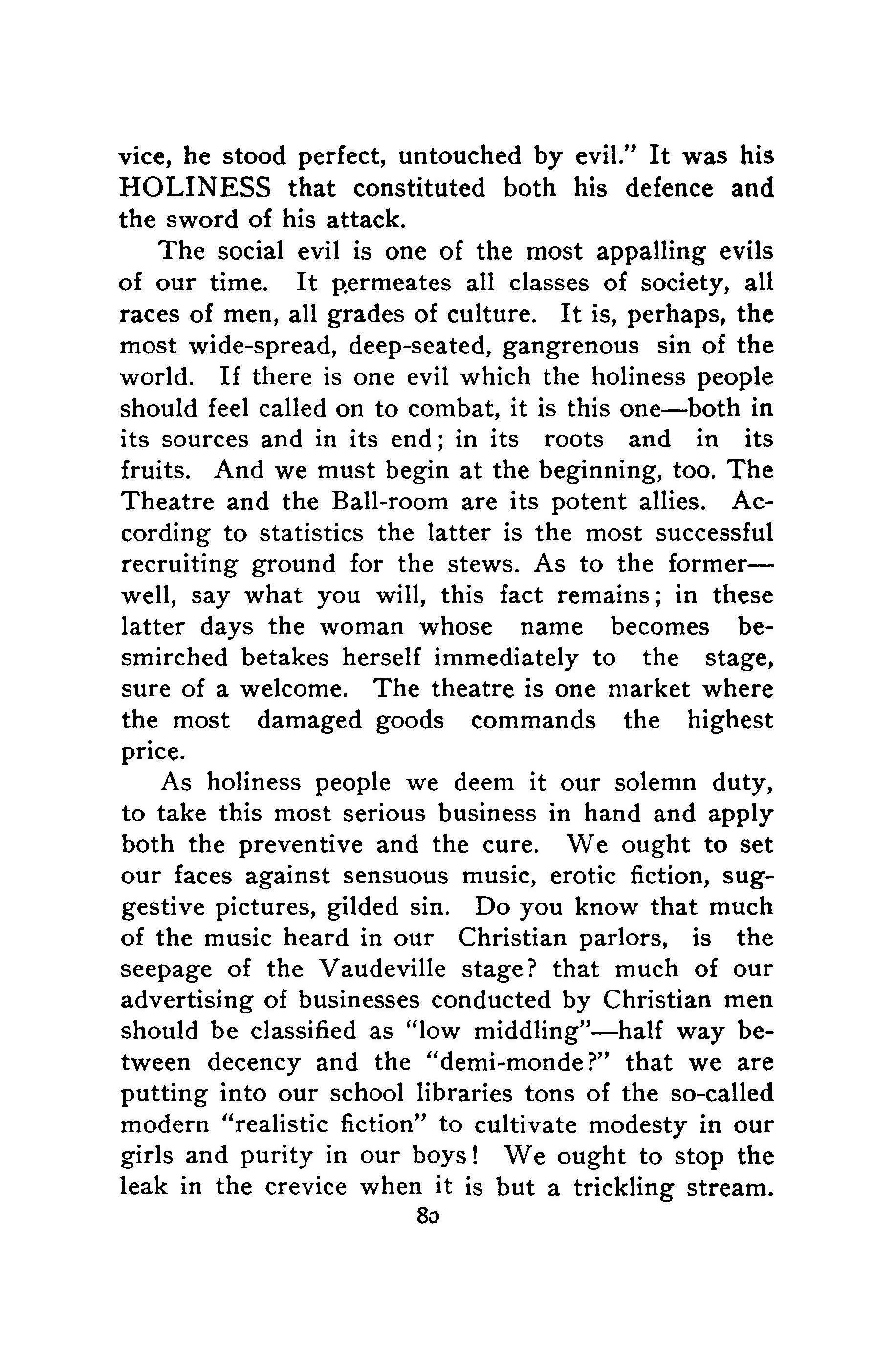
And then again we ought to address ourselves to a task harder, perhaps, but more repulsive and which the "high steeple" churches seem to have turned over to our crowd. We ought to go down into the very sewers of society, recover the filthy rags of human waste, and turn them over to the divine Fuller to make white and clean, holiness our equipment, the love of humanity our motive, God's immutable promise our stay.
 J. T. Upchurch.
J. T. Upchurch.
Mr. President, and Co-Workers m the Master's Vineyard:
By request of your Program Committee, I take pleasure in submitting to you the following paper on Rescue Work.
Only having been allowed ten minutes it is impossible for me to more than outline this enormous subject.
The experience of Holiness is conceded, by our enemies themselves, to be a great and glorious attainment, whether received instantaneously by a simple act of faith, or otherwise.
The Rescue Work is acknowledged by all to be a hard and difficult undertaking; therefore, I conclude that if any individual would enter that particular field of labor, he or she would not be properly equipped until the blessed experience of entire sanctification had been obtained.
When I speak of Holiness, I do not mean that
superficial kind professed to be lived by multitudes through out this land, but I mean that kind described by the devout and illustrious Apostle Paul in the Thirteenth chapter of First Corinthians, for I understand Holiness to be-Love made Perfect.
That there is an organized, systematized traffic in girls in this and other nations is now a well established fact.
This traffic is so devilishly diabolical in its opera tions that there is at present a price upon the head of nearly every girl and woman in the land, because the traffic is operated through an insane GREED FOR GOLD.

There is a peculiar mark placed upon womanhood, by the world, which seems to me, rather severe.
It matters not how a woman may be deceived, robbed, or in any other way lose the priceless gemher virtue, she is called "Fallen" and the social bars are raised against her. Turn where she may, look where she will, there is nothing to eradicate from memory, during the sad, weary years which come and go, the thought of the fall.
The pearl is lost, the stain is there, and amid the brightest earthly joys the "Scarlet Letter" burns and shines with distinct brilliancy.
Discouraged and disheartened dreading to live and afraid to die, she abandons herself to a life of shame so terrible in its environments as to almost make hell shudder.
The city, for the benefit of her class, sets aside a place within its borders designated the "Scarlet District'' where vice is segregated and becomes a loathsome eating cancer upon the body social.
Thither her erring feet are turned :.ud she plunges
madly, desperately into the darkened depths until her wild, reckless laugh rings out upon the midnight air; she is now not only fallen, but a full fledged and hardened criminal.
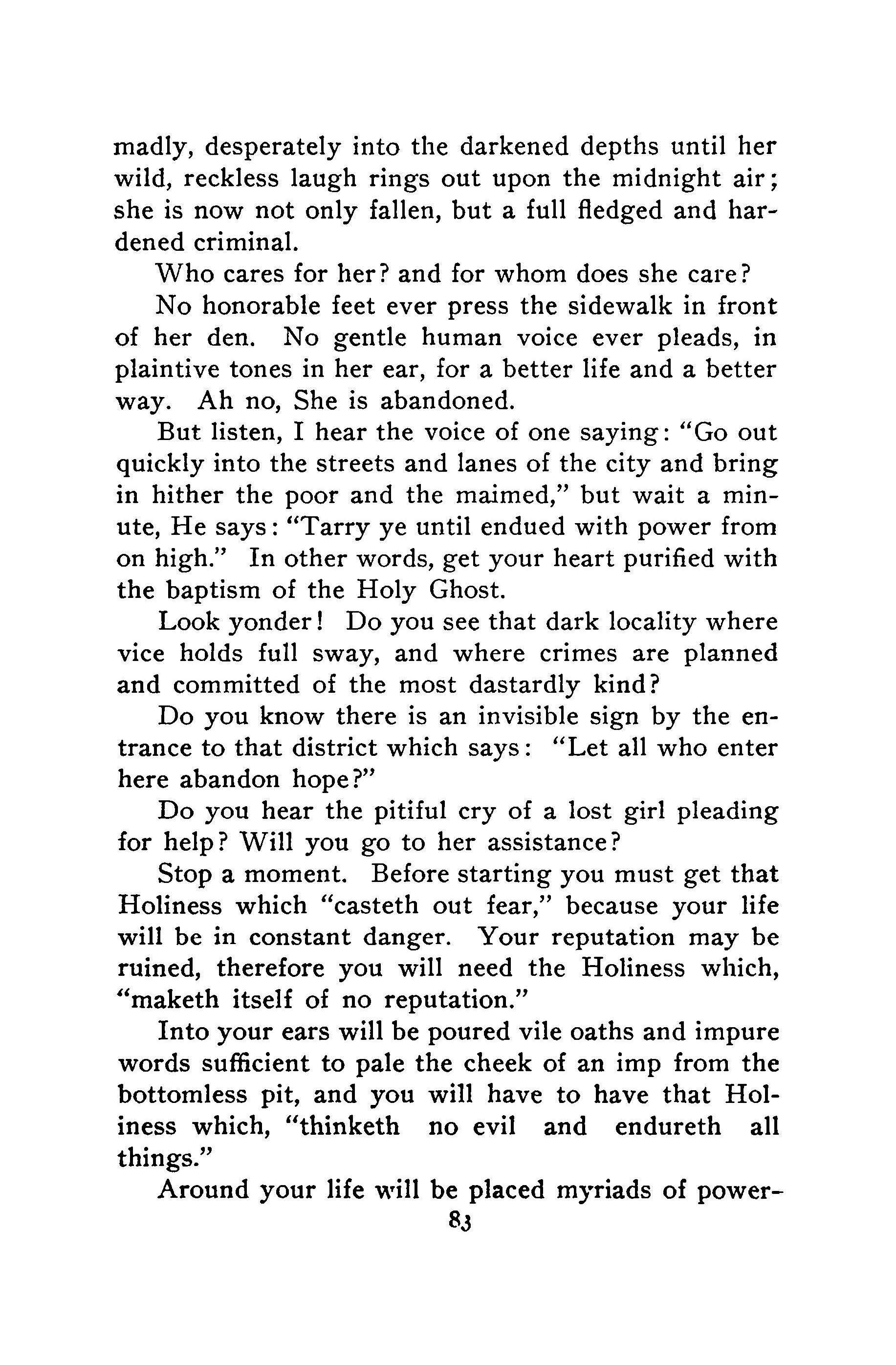
Who cares for her? and for whom does she care?
No honorable feet ever press the sidewalk in front of her den. No gentle human voice ever pleads, in plaintive tones in her ear, for a better life and a better way. Ah no, She is abandoned.
But listen, I hear the voice of one saying: "Go out quickly into the streets and lanes of the city and bring in hither the poor and the maimed," but wait a minute, He says: "Tarry ye until endued with power from on high." In other words, get your heart purified with the baptism of the Holy Ghost.
Look yonder! Do you see that dark locality where vice holds full sway, and where crimes are planned and committed of the most dastardly kind?
Do you know there is an invisible sign by the entrance to that district which says: "Let all who enter here abandon hope?"
Do you hear the pitiful cry of a lost girl pleading for help? Will you go to her assistance?
Stop a moment. Before starting you must get that Holiness which "casteth out fear," because your life will be in constant danger. Your reputation may be ruined, therefore you will need the Holiness which, "maketh itself of no reputation."
Into your ears will be poured vile oaths and impure words sufficient to pale the cheek of an imp from the bottomless pit, and you will have to have that Holiness which, "thinketh no evil and endureth all things."
Around your life will be placed myriads of powerSJ
ful temptations so subtle that your only safety will be in having that Holiness which, "loveth not the world, neither the things of the world," and which, "rejoiceth not in iniquity, but rejoiceth in the truth."
Blessed be the name of the Lord! we can have that kind.
When you find the girl and start to help her back to a life of purity you will be called a "Rescue Worker," and will be told: "It is no use to help a fallen woman, for they will never stand ; then you will need the Holiness which, "beareth all things, believeth all things and hopeth all things."
If peradventure, a girl whom you have rescued should become entangled in the meshes of sin and fall back into her old life again you should have the Holiness which, "never faileth" but is willing to give her another chance.
The social evil, in its degrees and ramifications, is such a vast problem that none ever think of offering a suggestion for its solution, unless they have the blessed experience of Holiness.
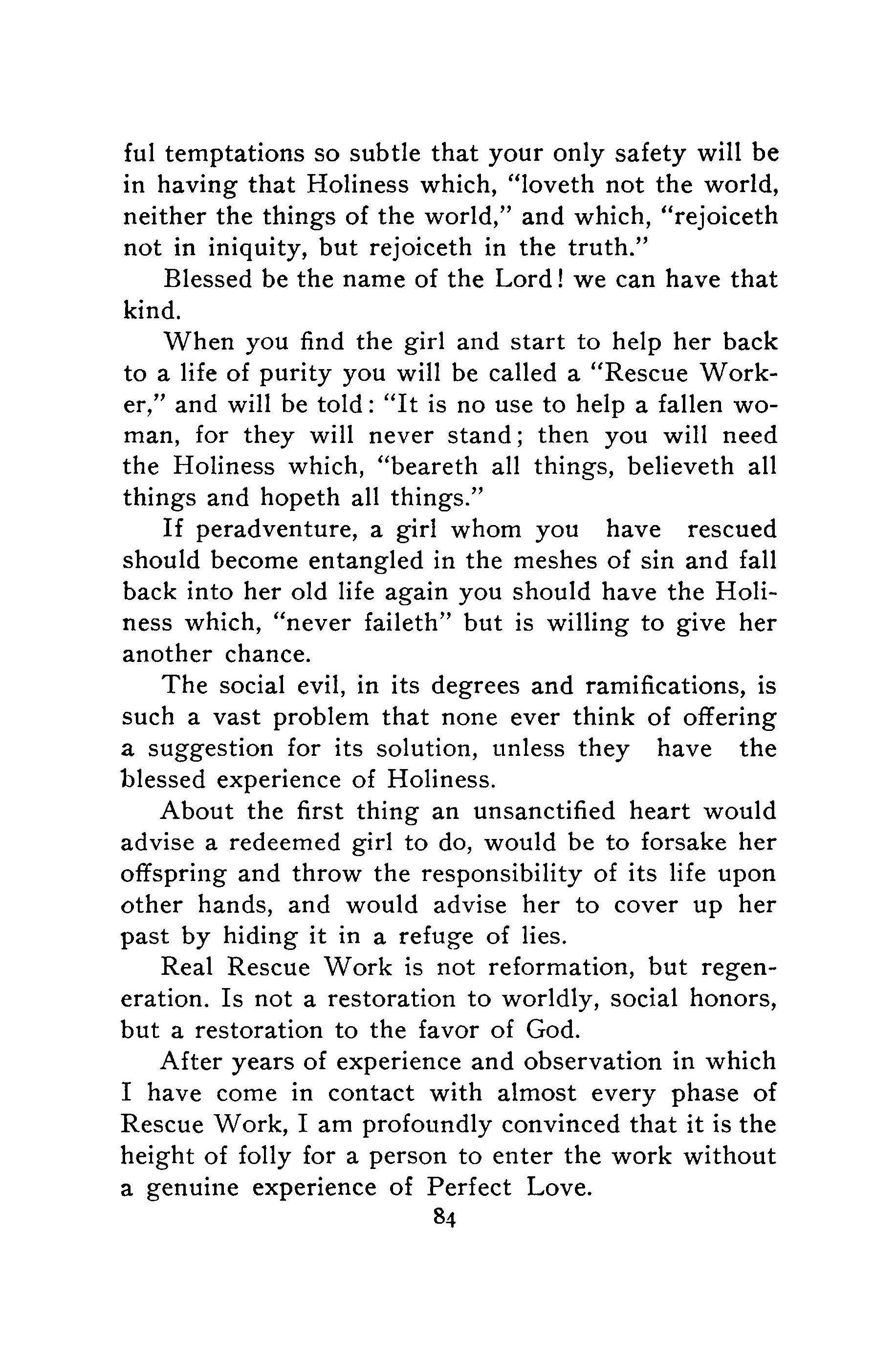
About the first thing an unsanctified heart would advise a redeemed girl to do, would be to forsake her offspring and throw the responsibility of its life upon other hands, and would advise her to cover up her past by hiding it in a refuge of lies.
Real Rescue Work is not reformation, but regeneration. Is not a restoration to worldly, social honors, but a restoration to the favor of God.
After years of experience and observation in which I have come in contact with almost every phase of Rescue Work, I am profoundly convinced that it is the height of folly for a person to enter the work without a genuine experience of Perfect Love.
Therefore I say to all; that the absolute essential to prepare a person for Rescue Work, is that "Holiness without which no man shall see the Lord."
I close by paraphrasing a portion of Rienzi's Address to the Romans :
"Rouse ye mothers! Rouse ye fathers! Have you brave sons? Look into the Licensed Liquor Saloon, to see them die, spiritually, morally, and physically. Have you fair daughters? Look to see them live, torn from your arms, dishonored, disdained, debauched by the infamous traffic in girls, and if ye dare to ask for their return, be answered with a sneer and an empty laugh."
And yet, this is Christian America, which, with her iron-clad navy and commercial genius, influences the nations. And we are Americans. Why to be a Christian America is the greatest thing in the world. Once again, hear me, ye walls that echoed to either the prayers, shouts or sermons of this great Holiness Union, once again I vow, the slums of America shall hear the Gospel of a Full Salvation !
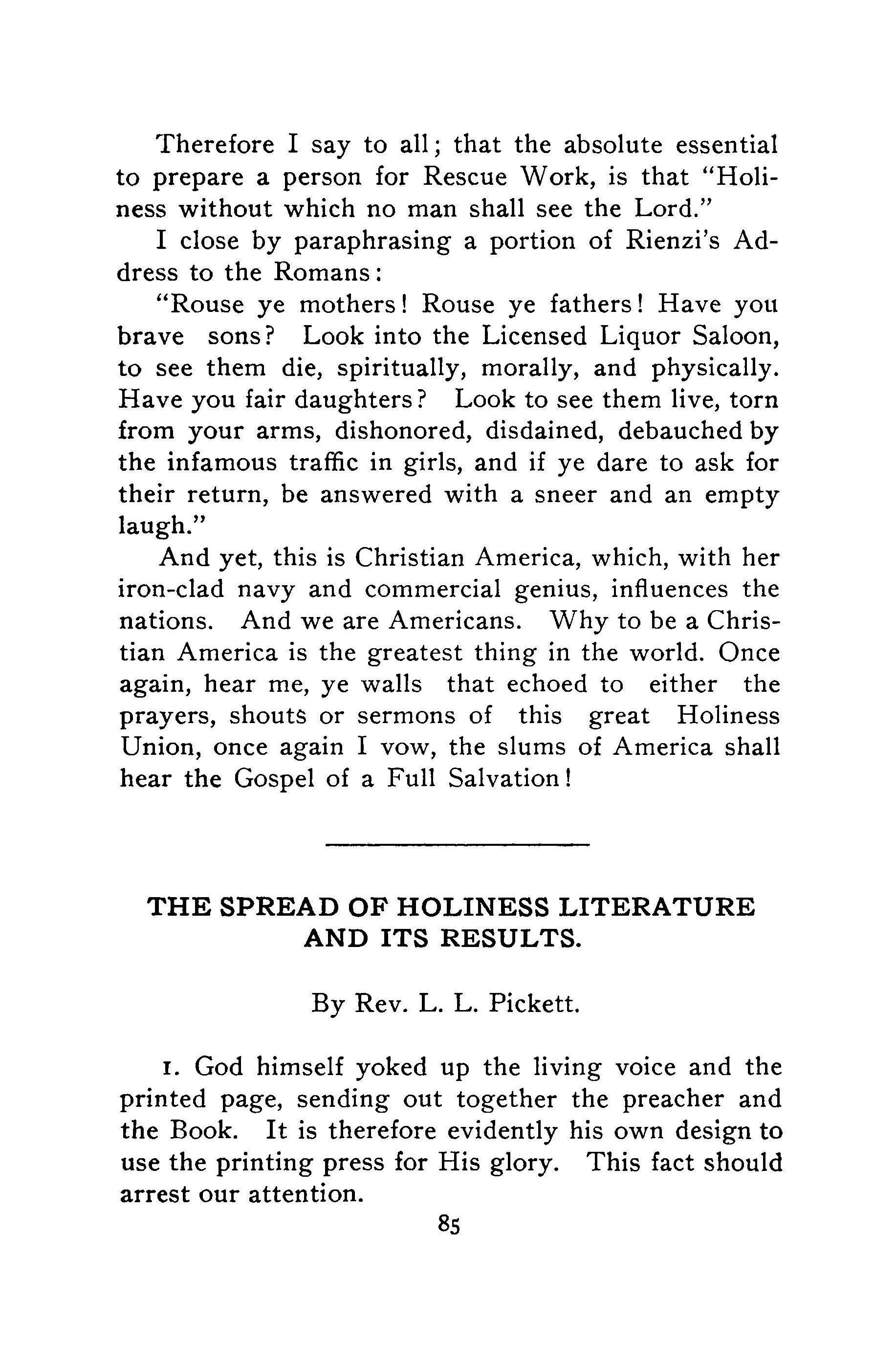 By Rev. L. L. Pickett.
By Rev. L. L. Pickett.
I. God himself yoked up the living voice and the printed page, sending out together the preacher and the Book. It is therefore evidently his own design to use the printing press for His glory. This fact should arrest our attention.
2. The churches all recognize the importance of literature and have their publishing houses. So with the political parties, business corporations, etc. Printers ink promotes publicity. The wise who wish to bring things to pass for God should take note and learn a lesson from the children of this world.
No great work of a general nature reaches the people at its best without the use of the printed page.
Neal Dow, when asked how he overthrew the saloons in Maine, said, "I sowed the State knee-deep in prohibition literature. We might girdle the globe with full salvation, if we could sow it knee-deep with holiness literature.

No permanent work can be done for God through ignorance. Intelligence is the hand-maid of virtue. God can accomplish manifold more with the seed of the kingdom sown in the fertile soil of culture than in the barren soil of ignorance.
Books are educative. A home in which is a good, well-used library will give to the community a heritage of noble sons and daughters, bright, intelligent, useful-the highest type of nobility. Mere titles are empty, meaningless, worthless; true culture, that of head and heart, such as may be had by a conscientious perusal of the best books, has weight and genuine worth.
He
authors. The boy who reads good, pure, wholesome God honoring books, papers and tracts, is thereby uplifted just as he would be uplifted by daily association with the authors whose production are his study. On the other hand, he who pours over yellow-back novels, detective stories, lives of bandits, burglars, highwaymen and other coarse, filthy literature is thereby debased-
just as he would be by daily companionship with the villians whose "daring exploits ( !) hairbreadth escapes, and marvellous adventures" thrill his nerves from the printed page.
While serving a pastoral charge in Texas I found that in a certain family a member of my charge, a man some thirty years of age, was reading himself, through some of Ingersoll's productions, into open infidelity. I begged his father to let me order some useful books, as an antidote for his son's infidelity. But he was too penurious to pay the bill. Two years later, while serving an adjoining charge, but in the same county, I found in another home a copy of the ''Life of the James Boys," or possibly it was a "Life of the Youngers," and I asked the privilege of burning it; this, however, was refused. I insisted that it could do only harm, just as it would result only in evil to associate with the desperadoes whose lives the book portrayed. But the owner would not consent for me to destroy the book.
During the same year he loaned the volume to the man of whom I first spoke as reading himself into infidelity. Through its perusal he thought he saw a short-cut to wealth, viz., by burglary. So he began by robbing the county treasurer's office of $800; was soon afterward arrested, convicted and sentenced for a term of seven years in the penitentiary, which he served. Bad books were his ruin ; good books would most likely have been his salvation. I knew him well; have been in his home and preached to him often.
I had a friend in the ministry, we were very intimate. His children loved me and would climb upon my knee, talking about God's love. Alma grew to her teens a bright Christian. She went away to college.
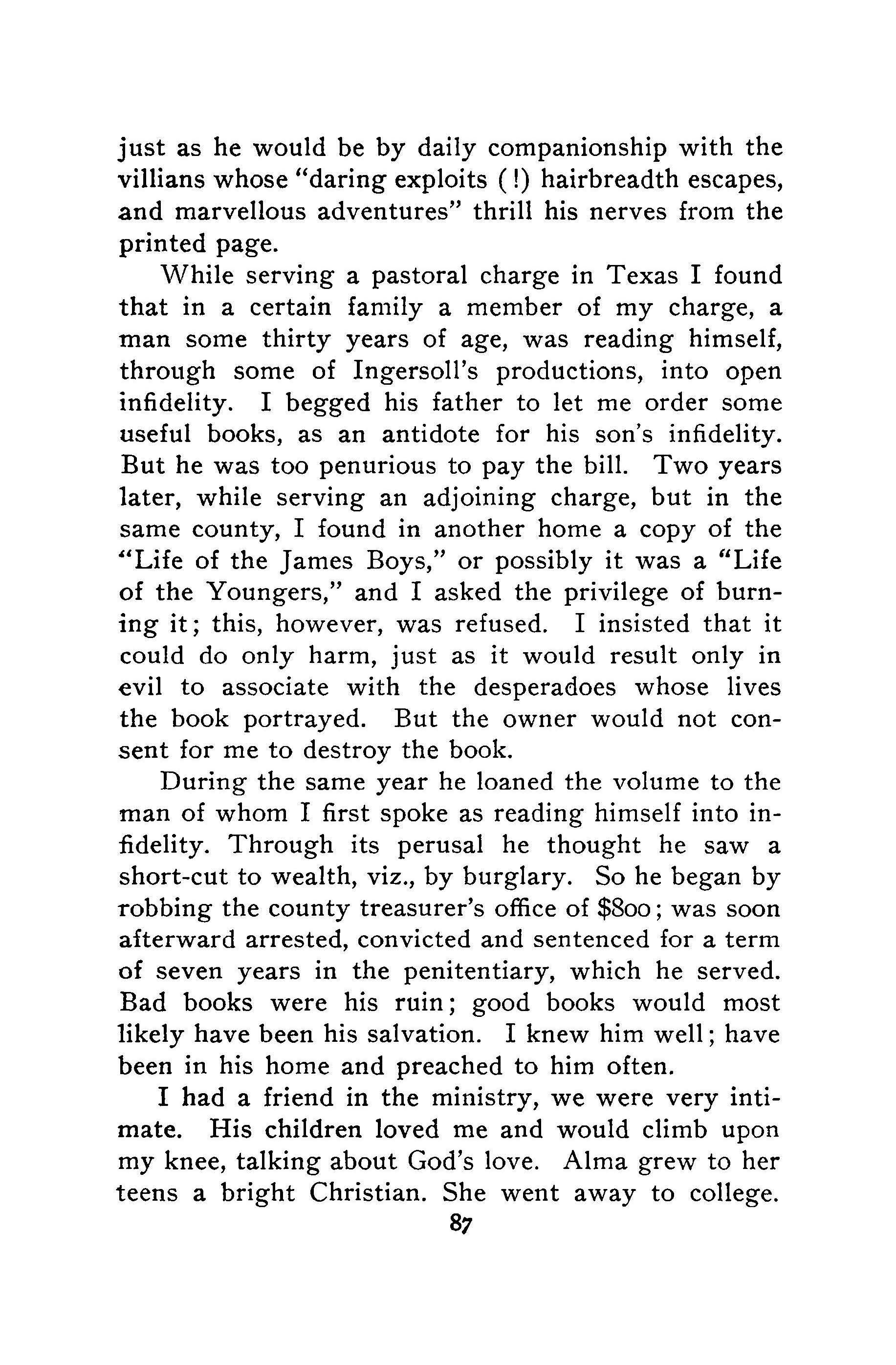
Her father became a presiding elder and arranged some meetings for me among the pastoral charges of his district. I had not seen the family for some years and was glad to meet my dear friends again. But how sorry I was, and how mortified her parents, to find our once bright Christian girl, Alma, now grown to young womanhood, fresh from a Christian ( ?) college, a poor backslider, giddy, irreverent, sitting upright and in the rear of the church during prayer. Inquiry revealed the fact that she had been "almost crying her eyes out" at midnight over a lot of French novels.
Three school boys "held up" a gentleman in Texas and robbed him of several hundred dollars. They were all cigarette fiends and had been reading some "detective stories."
The evil is abroad in the land. Vile books, papers, and pictures are pouring through the nation like the frogs, flies and other vermin of Pharaoh's plagues. The Devil is making a mighty use of printer's ink. His emissaries are busy in its dissemination.
\Ve all deplore the presence of an evil literaturethe spawn of the pit. But what is the remedy? Is it not to be found in the distribution of helpful books and papers? He who would crowd out corrupt and corrupting books should crowd in the good.
For while great evil comes from the vile, salacious productions of a debauched pen and a perverted press, we are glad to record that God's truth is spread and His work promoted by the products of sanctified pen and press. Thousands we are told have been saved by means of such a worthy book as Pilgrim's Progress, that immortal classic, which has been translated into more languages than any book save the Word of God.
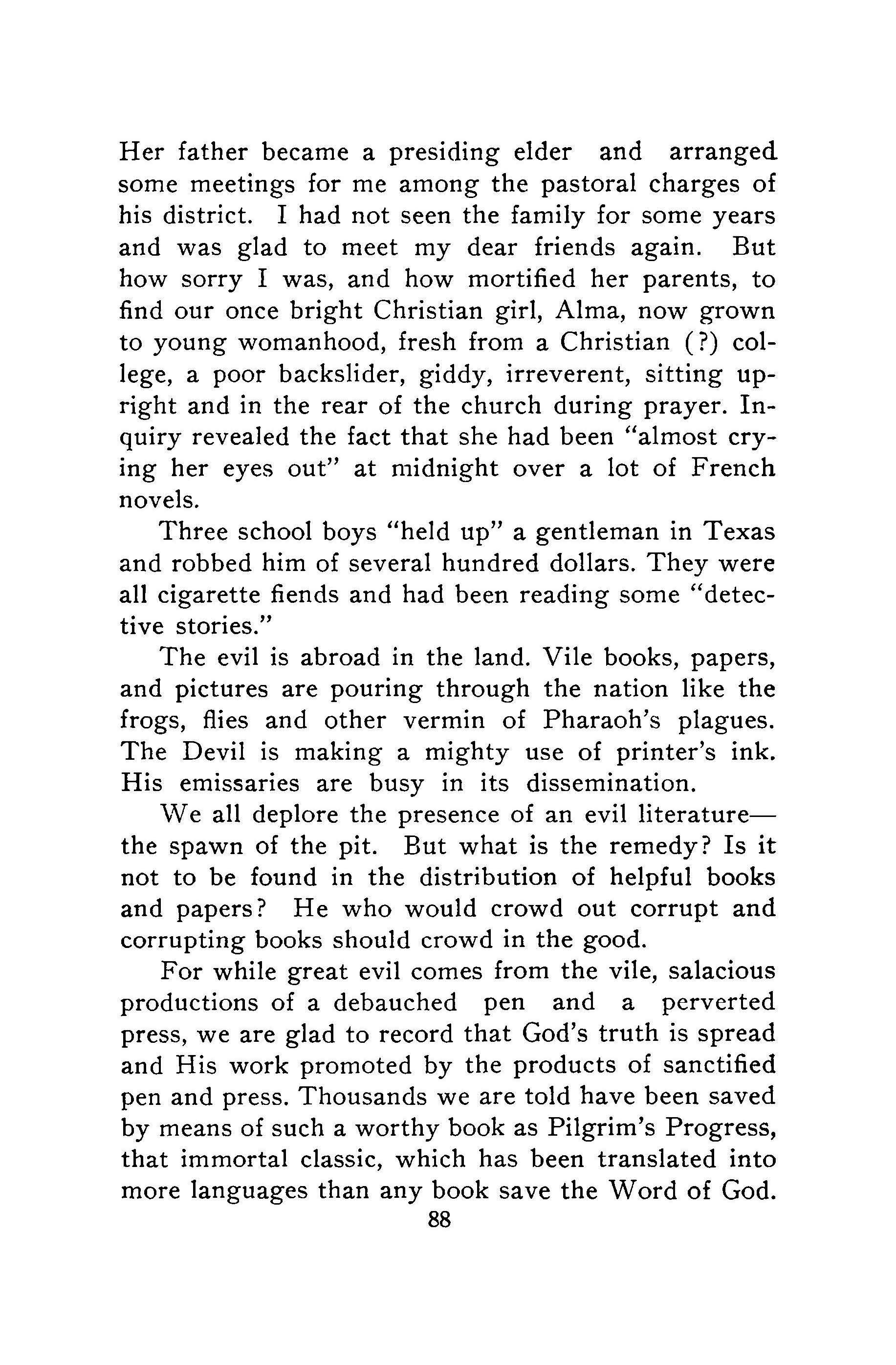
Some one suggested that, "The Devil's gun shot breech-foremost when he had John Bunyan incarcerated in Bedford jail." Multitudes have found Jesus through reading, "The Dairyman's Daughter," Reid's, "The Blood of Jesus," "The Sinner's Friend," "The Story of Billy Bray," and kindred works.
Think also of the sanctified throngs who, blood washed and white-robed, will greet Mrs. Hannah Whitall Smith in the crowning day and thank her for having written that classic of the "Holiness movement," "The Christian's Secret of a Happy Life." Among the throngs led into the life of rest, of victory, through its heaven-indicted truths, is the writer of these lines. As a book-evangelist I am glad to record that through grace I have been instrumental in the circulation of thousands of copies of it since the memorable autumn of 1885 when, having prayed, with more or less earnestness, three years for sanctification, though having never heard a sermon or a testimony on the subject, I was led into the experience while prayerfully reading the book.
What should I say of the writings of Wesley, Fletcher, Clark, Watson, Hester Ann Rogers, Carvossor, Nelson and others of their cola borers save that they have revolutionized the theology of the world.
We should not fail to mention the fact that our present holiness movement is pouring forth a stream of books and papers that are uplifting the readers, who, thank God, are counted by the hundreds of thousands. Think of the blessed work being done through the writings of our own beloved, Morrison, Godbey, Carradine, Culpepper and many others. May I not humbly thank God that through His blessing the pro-
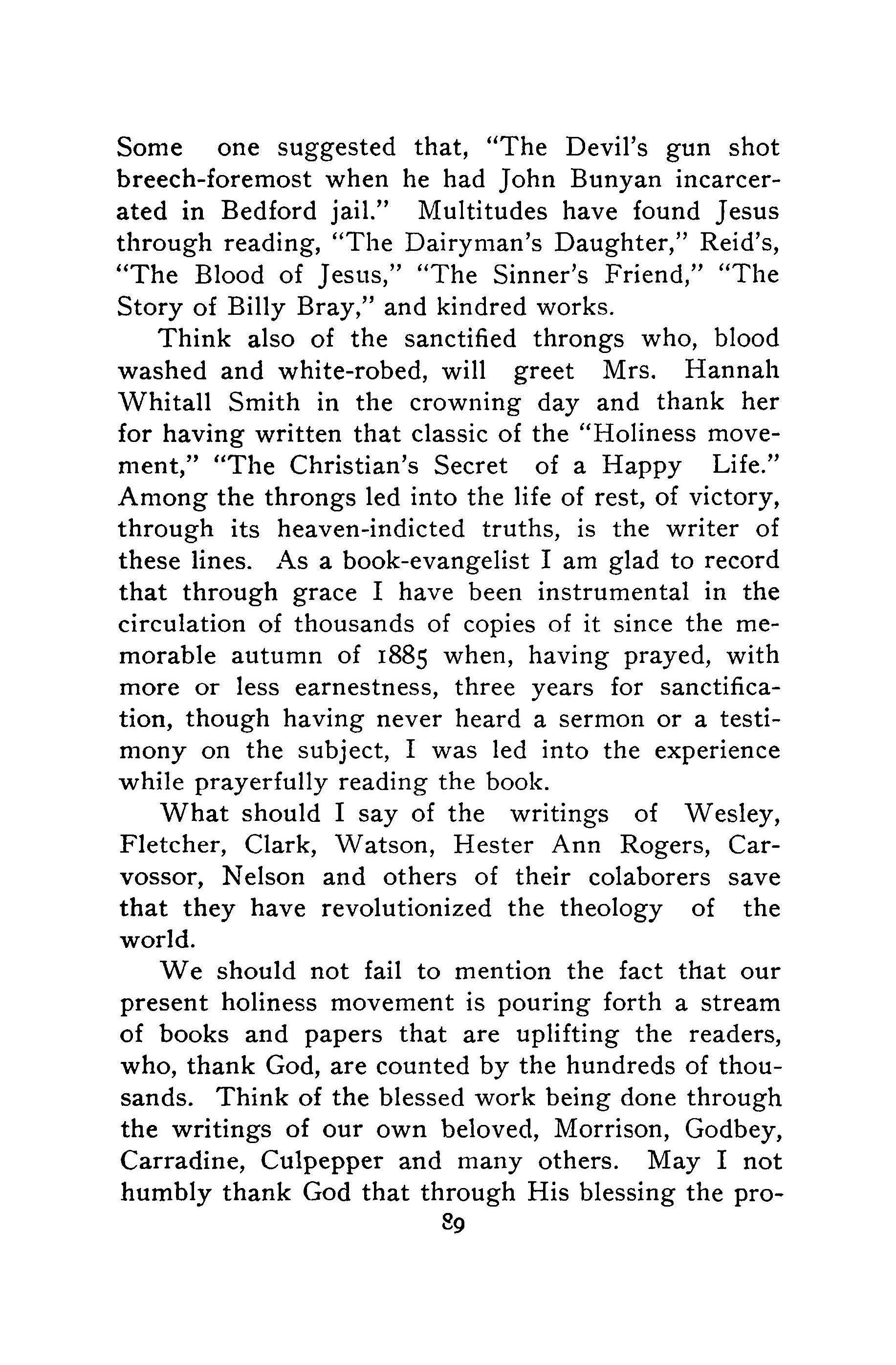
ductions of my poor pen have been instrumental in the conversion of sinners, the sanctification of believers and the edification of His people. Praise to His name!
As to the Circulation of Salvation Literature.

:rviany are deterred from this noble work by means of certain objections which some diligently urge.
r. They say it is a sordid, money-making device.
I reply: The same charge is made against supporting the ministry. The charge is false in both cases. Books may and should be circulated with an eye single to the glory of God.
2. It brings upon me the criticism of some and I do not wish to arouse their antagonism.
If you arouse no antagonisms you will accomplish little if any good. A carnal world will criticise anything done for Jesus. If you stop your work every time the critics appear on the scene you had as well surrender your commission.
3. I don't know how to sell books.
Nor did you know how to preach about the time you delivered your first sermon. It has required study, prayer and diligent application. I dare say, the same effort would make you a successful book evangelist.
4. I give away so many that I lose money and can't keep up the work.
Then alter your methods. Sell at least enough to meet all your bills. Otherwise you fail to circulate the books and the enemy of souls gloats over your loss of this arm of service.
5. The railroads will not give me clergy rates if I sell books.

If you simply speak of your books from the pulpit as a branch of your ministry, a feature of your evangelistic work, a service to God and souls, I am sure no fair-minded railroad man would object in the least to it. We must never sell books as a commercial commodity, but as a seed-sowing for eternity.
6. But I am called to preach, not to be a book-agent.
Amen! nor would I recommend that you become a "book agent." But I would urge you my brother as a lover of souls, as one who must give account at the judgment that you leave no stone unturned whereby truth may be disseminated, no work undone by which the lost may be saved, the young and the old prepared to meet their God and for lives of usefulness.
7. But I can't sell books ; I don't know how.
I would not say it. A Christian should never say "I can't," it doesn't belong to his vocabulary. We can do anything that ought to be done. Paul's word is, "I can." Phil. 4 :13.
In the light of that day when the secrets of men shall be laid bare I urge you to prayerfully, in the fear of God labor to bring up our people to lives of intelligent service to God. And as one of the most effective means of doing this carry with you for circulation in the work a supply of good, salvation books and papers. When the crowns are distributed by Him who is Lord of all may you receive one studded with many stars through your sermons, songs, prayers, godly lives and last, not least, a fruitful book-evangelism.
I am asked to lead the discussion on "Holiness and the Church."
It need not be expected that I shall treat the subject as if the Church and the holiness movement were antagonistic movements, having party standards and seeking to divide the people into factions and infuse them with party spirits. I do not so regard the matter, on the other hand holiness is vital to the church. Without the love or desire for or the possession of holiness there can be no real church. The very name church ( ecclesia) means the called out, the separated ones who have hen called out of the world and its sins by the Holy Spirit, have turned away from all known evil and have commenced the life of holiness, in so far they do not commit sin and are seeking to walk in all the light God gives them. When the Psalmist sang, in his religious joy. "Holiness becometh thine house, oh Lord, forever," he stated a great truth, for just as certain shades of color become certain persons, so holiness is the snow-white raiment that becomes the bride of the lamb, and without which she shall never be able to be received at the Royal Court of the skies. The church is a parenthesis in the economy of the Kingdom of Heaven. It was a surprise to the Jews for they had looked for the kingdom, but the dispensation of the Kingdom could not be until that period called the Gentile period, was finished, in which the church holds the central place in the scene. Her chief business is to gather out a people from the nations for his name or as a people
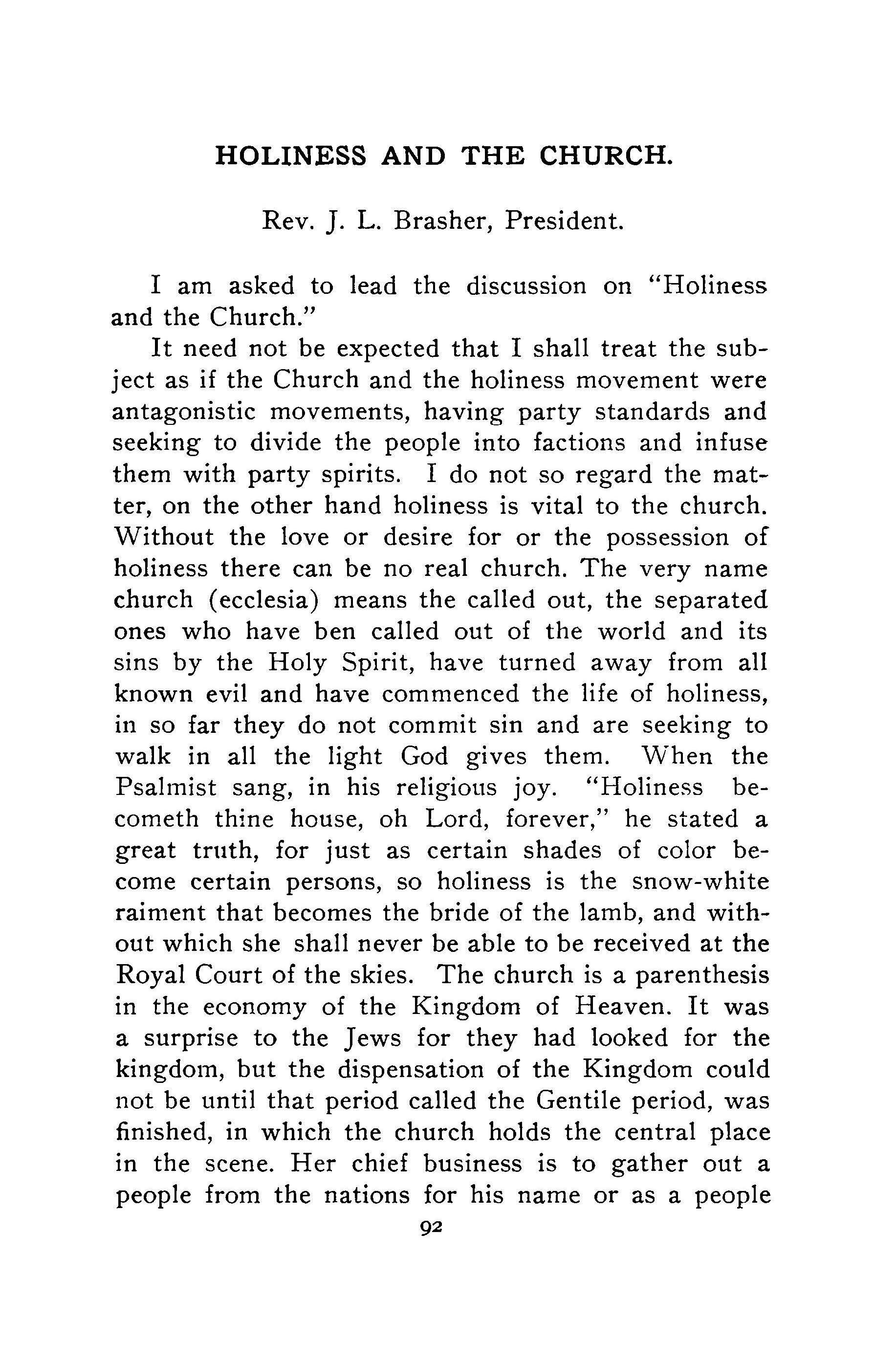
prepared for his coming Kingdom. That people must be a holy people. All through the epistles we find emphasis placed upon the perfection of the saints, and he gave some, apostles and some, prophets and some, evangelists and some, pastors and teachers for the perfecting of the saints for the work of the ministry, for the edifying of the body of Christ: Till we all come in the unity of the faith and of the knowledge of the Son of God unto a perfect man unto the measure of the stature of the fulness of Christ, and the same writer says in Col. I :28 whom we preach, warning every man and teaching every man in all wisdom in order that we may present every man perfect in Christ Jesus. And again in another place-"even as also Christ loved the church and gave himself for it that he might sanctify and cleanse it ... in order that he might present it unto himself a glorious church not having spot or wrinkle or any such thing, but in order that it should be holy and without blemish." From these and many other passages it clearly appears as the purpose of God having given his son to die and his spirit to consummate, to use the ministry in all its offices and orders alone with the church in all its workings, to make men holy or perfect. This is her chief business and the divinely ordained purpose in her founding. In this she is distinct from all human organizations. Masonry, Oddfellowship and secret orders in general, along with clubs and various fraternities, all seek their mutual betterment, socially and :financially, but none of them profess to make men perfect. This the church alone proposes to do through her various ministers-in this she stands mcomparable. As Bishop Candler has said, "The church stands solitary among the organizations of men as

Christ stands solitary among the sons of men." Her crowning glory does not consist in the stateliness of her churches and cathedrals. The number of her colleges and institutions of learning and their financial endowment-nor in her wonderful history flecked with the grandest names of all time-nor in the music of her great organ pipes back in the alcove, thundering out the great hymns and chants which come to us marching down the aisles of a decade of centuries-nor does her glory consist in the learning and eloquence of her clergy nor the number, wealth and culture of her communicants, but in this, rather; that she is able by the indwelling Holy Ghost, to so preach the word, that poor lost sinners, down in the depth of sin, ignorance, poverty and shame, are awakened, convicted, led to repent-are converted, sanctified and prepared by the transformation of their hearts and lives to have a place in the mighty throng which shall constitute the bride of the Lamb, holy, beautiful and divinely fair. The Church, therefore, that is of God, seeks to make men holy, and so far as this is made her chief business, by so far she is fulfilling the divine purpose in her founding.
What a travesty, therefore, is that which though calling itself a church, seeks to hinder men £rem either possessing or professing holiness. This, then, is her mission to make men holy and if she neglects her business or denies her calling what shall be the rebuke she must receive at the bar of her Lord who shed his blood to make her "holy and without blame before him in love!" May God's Spirit awaken the sleeping world about us, and stir up those "at ease in Zion," and give us all a mighty unction from the Holy One with which to arouse the Church to her task. But, in dis-

cussing this question, I am not ignorant of the fact that there exists a distinct, unique and vital spiritual force, called by many "the Holiness Movement," the object of which is the salvation of sinners and the speedy evangelization of the world.
Nor am I ignorant of the further fact that in many professing churches there is sharp antagonism to this movement, arising from badness of heart or misunderstanding of holiness itself doctrinally stated. Further there have been various persecutions, some of them quite painful, some pathetic. On the other hand there have been some mistakes made by excellent people in their zeal to spread the great truth of a second work of grace received now by simple faith in Jesus Christ. Some find their church home very uncongenial and the problem confronts them as to what to do with their membership, their influence and their money. There are two dangers, it seems to me, before such persons. One is a truckling conformity to the whims, wishes or laws of ecclesiastical intolerance, and the other is "come-outism." Both are often fatal. There are times when to please men means to displease God, and to grieve his Spirit. This is fatal to liberty and spiritual development, but on the other hand "comeoutism" is wrong in policy and dangerous if not fatal in practice. To change one's church relationship is not come-outism and may sometimes be wise. Personally, I have doubted the propriety and feared the consequences of multiplying holiness churches, socalled. We have said over and over in our meetings : "The holiness movement is not an ecclesiasticism, but a revival. We do not need another denomination, but we do need a quickening of the whole Christian public. We are not seeking to tear down any connec-

tion, but would enter every open door with the gospel of full salvation. We would help all the churches by kindling a fire on every altar in the land. I must be pardoned for saying that I fear in many places not all of these statements could be truthfully made. I am satisfied that, if the holiness people ever separate themselves into distinct denominations that many doors now open to this movement will soon close, and all holiness people will, by some, be regarded as dangerous to the well being of other religious communions. I have no thought that God wants to crystalize the holiness revival into another church, but to the contrary mightily use it for the spread of the doctrines of entire sanctification, the second coming of Christ and the possible healing of thousands of people according to his will. I am glad that today there is a general looking toward pentecost among all the churches and unless it stops too soon there is just ahead of us a mighty revival of religion. There is a rapidly increasing number of doors opening to these great truths for which this movement stands. Let us hope that the time is not far distant, when the "King in his beauty," will come and take possession of his own inheritance and bring in universal righteousness. May the Church put on her bridal robes and leaning on the arm of her Lord move "forth as the morning, fair as the moon, clear as the sun, and as terrible as an army with banners."

(The names below are those acted upon and received by the Holiness Union at its last Annual Session.
Names sent the Secretary since the Convention will be handed to the Committee on Membership and will be acted upon at the Louisville Convention. If by some oversight the name of any member fails to appear herein, let him please communicate with the Secretary. Sometimes such accidents will occur.)
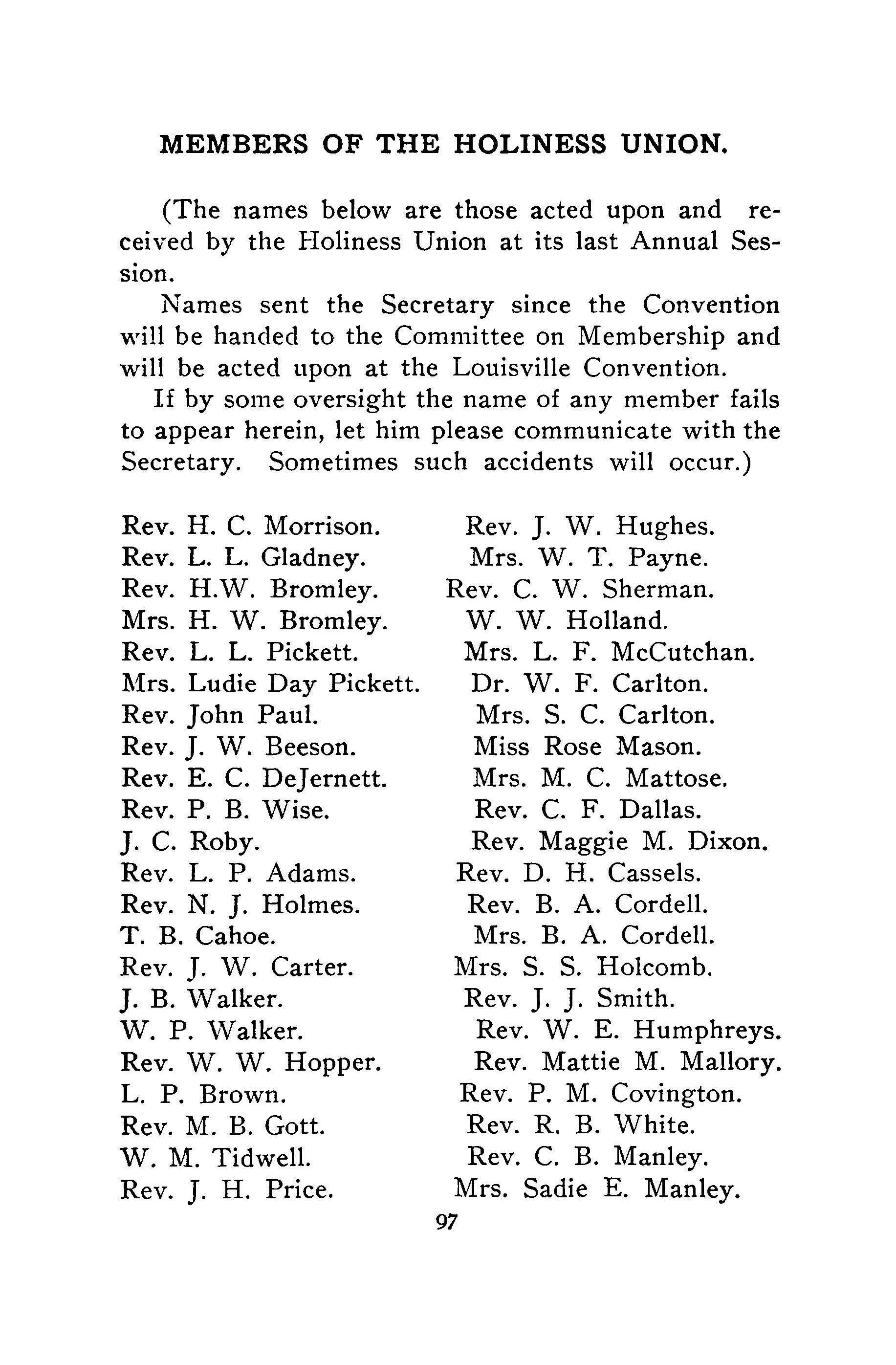
Rev. H. C. Morrison.
Rev. L. L. Gladney.
Rev. H.W. Bromley.
Mrs. H. W. Bromley.
Rev. L. L. Pickett.
Mrs. Ludie Day Pickett.
Rev. John Paul.
Rev. J. W. Beeson.
Rev. E. C. DeJernett.
Rev. P. B. Wise.
J.C. Roby.
Rev. L. P. Adams.
Rev. N. J. Holmes.
T. B. Cahoe.
Rev. J. W. Carter.
J. B. \Valker.
W. P. vValker.
Rev. W. W. Hopper.
L. P. Brown.
Rev. M. B. Gott.
W. M. Tidwell.
Rev. J. H. Price.
Rev. J. W. Hughes.
Mrs. W. T. Payne.
Rev. C. W. Sherman.
W.W. Holland.
Mrs. L. F. McCutchan.
Dr. W. F. Carlton.
Mrs. S. C. Carlton.
Miss Rose Mason.
Mrs. M. C. Mattose.
Rev. C. F. Dallas.
Rev. Maggie M. Dixon.
Rev. D. H. Cassels.
Rev. B. A. Cordell.
Mrs. B. A. Cordell.
Mrs. S. S. Holcomb.
Rev. J. J. Smith.
Rev. W. E. Humphreys.
Rev. Mattie M. Mallory.
Rev. P. M. Covington.
Rev. R. B. White.
Rev. C. B. Manley.
Mrs. Sadie E. Manley.
Rev. W. H. Huff.
Mrs. Mary Prindle.
W. B. Yates.
Mrs. Cora Yates.
Rev. B. L. Sarmast.
Rev. B. W. Huckabee.
Thos. B. Talbot.
Rev. J.M. O'Bryen.
Rev. H. H. McCain.
Rev. C. M. Guess.
Rev. C. B. Jernigan.
Rev. T. E. Webb.
Rev. R. M. Guy.
Rev. Solomon Irick.
Rev. C. M. Keith.
Rev. Archie B. Adams.
Mrs. Archie B. Adams.
Rev. H. D. Kirkpatrick.
Mrs. D. H. Kirkpatrick.
Rev. J. T. Upchurch.
Mrs. J. T. Upchurch.

Rev. Millard Denton.
Rev. A. A. Niles.
Rev. E. N. F. Sullivan
Rev. J. W. Postum.
Rev. J. S. Sanders.
Rev. W. P. B. Kinard.
L.A. Burns.
Mrs. Annie Miller.
Mrs. Mary Oliver.
T. J. Shingler.
Mrs. T. J. Shingler.
Lura Holland.
Miss Conda Goad.
F. M. Williams.
Mrs. Agnes Lindsey.
Mrs. Mary E. Carter.
Mrs. Anna B. Hardy.
Mrs. Ada B. Cooper.
C. W. Reynolds.
H. L. Fly.
T. W. Fly.
Mrs. Dessie McKeeby.
Mrs. Jessie L. Lee.
J. E. Gray.
J. T. Williams.
Mrs. M. Landers.
Miss Nellie Chapman.
A. B. Fountain.
W. D. Simmons.
M. J. Guthrie.
Mrs. R. L. Beevers.
A. J. McKeithen.
J no. S. Hollinger.
Mrs. N. Bradford.
Mrs S. C. Taylor.
R. L. Beevers.
W. C. Vickry.
Mrs. J. W. Hunter.
Mrs. Laura Terry.
J. H. Gilliam.
Vic Rinehardt.
Rev. W. B. Pinson.
Lillie Jenkins.
Lula Jones. Laura Jones.
Lola Williams.
Blanch Williams.
Mary L. Dallas.
C. V. Wilkinson.
N. P. Steves.
J. W. Harris.
John Tatum.
W. B. Riddick.
C. H. M. Freeman.
Rev. P. A. Miller.
M. C. Burns.
E. A. Robertson.
Luke Palmer.
G. A. Pierce.
Mrs. David Leitt.
Mrs. Mattie C. Freeman.
J. G. Savage.
C. V. Spell.
Mrs. John G. Knox.
Dennis Rogers.
J. B. Chapman.
Rev. Allie Irick.
Mrs. Rosa Irick.
F. W. Johnson.
W. G. Wynne.
Mrs. W. G. Wynne.
Dode Pope.
Rev. Allan Webb.
Annie E. McKeithen.
Dr. J. C. Marshall.
P. G. Ragsdale.
J. T. Bailey.
Mrs. M. L. Bailey.
R. E. Smith.
Geo. W. Stewart.
Mrs. Georgia D. Shelley.
Eva Patton.
Maud Alford.
Clara Alford.
Hazel Mitchums.
Hattie Hart.
Mrs. Vic Reinhardt.
Rev. W. L. Selby.
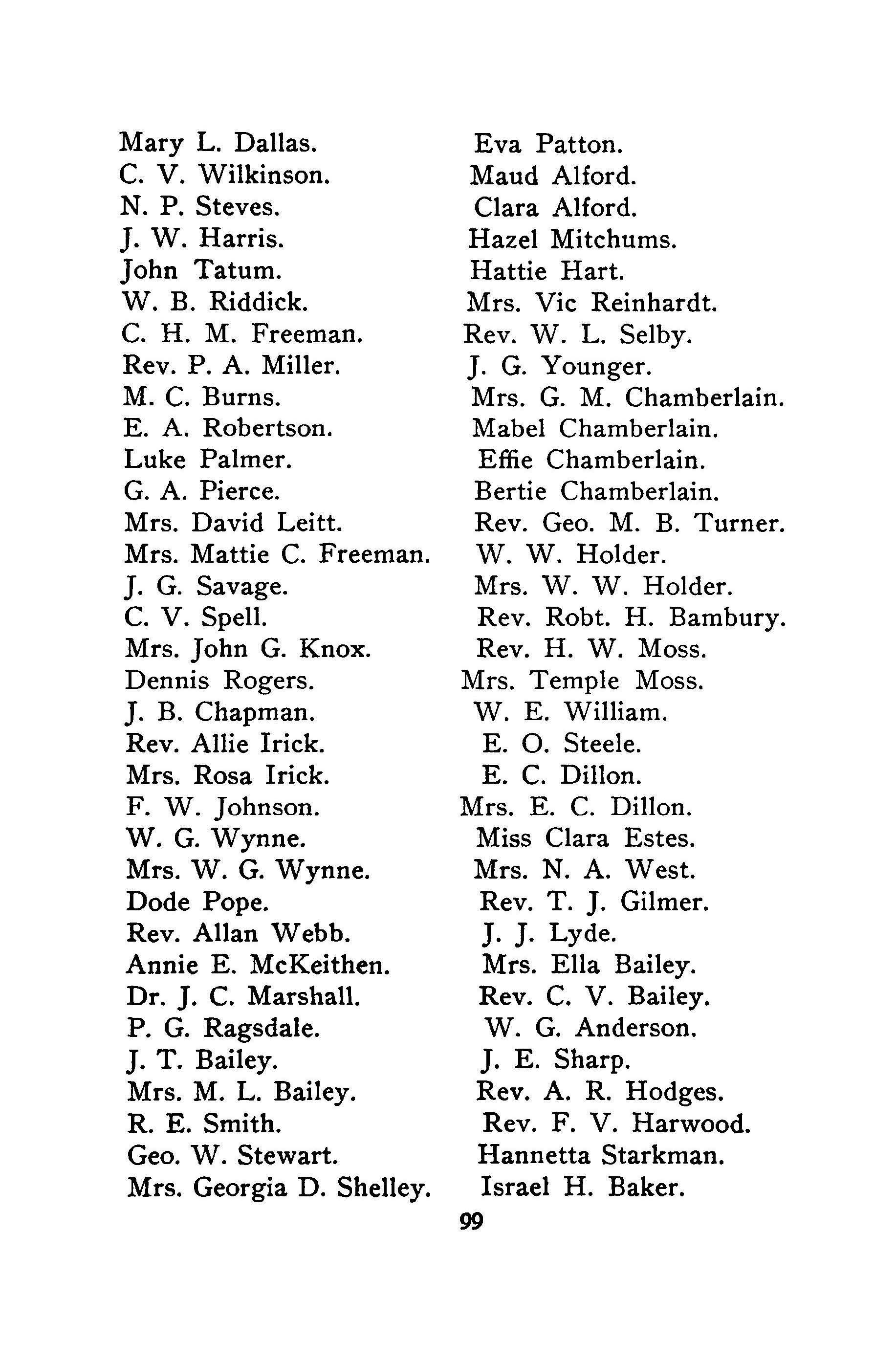
J. G. Younger.
Mrs. G. M. Chamberlain.
Mabel Chamberlain.
Effie Chamberlain.
Bertie Chamberlain.
Rev. Geo. M. B. Turner.
W. W. Holder.
Mrs. W. W. Holder.
Rev. Robt. H. Bambury.
Rev. H. W. Moss.
Mrs. Temple Moss.
W. E. William.
E. 0. Steele.
E. C. Dillon.
Mrs. E. C. Dillon.
Miss Clara Estes.
Mrs. N. A. West.
Rev. T. J. Gilmer.
J. J. Lyde.
Mrs. Ella Bailey.
Rev. C. V. Bailey.
W. G. Anderson.
J. E. Sharp.
Rev. A. R. Hodges.
Rev. F. V. Harwood.
Hannetta Starkman.
Israel H. Baker.
Rev. S. B. Williams.
Mrs. Laura E. Baker.
Mrs. Jennie Lee Williams. J. H. Pritchard.
Rev. J. W. Heckman.
Mrs. Virgil Babbage.
B. P. Wynne.
Mrs. Sallie Pennington.
Allen J. Williams.
V. D. Ransone.
Rev. Claude A. Roane.
Mrs. E. J. Bieber.
Mrs. M. M. Brandon.
John R. Morton.
Mrs. Martha J. Martin.
R. James Greer.
Alice H. Davis. R. L. Fowler.
G. W. Ransom.
Mrs. G. W. Ransom.
J. R. Ransom.
Rev. A. S. Byrd.
Mrs. Annie B. Byrd.
Miss Bertha L. Byrd.
Miss May Byrd.
Miss Martha E. Byrd.
Kirby Smith Nichols.
J. W. Randolph.
Rev. G. B. Sherman.
Dr. J. F. Hendrick.
Mrs. Lucy S. Kurtz.
R. I. Arrington.
Mrs. R. I. Arrington.
Miss Eula Arrington.
Mrs. Abel Russell.
James M. Wood.
Prof. R. H. Humpherey.
Rev. John T. James.
Rev. C. A. Bromley.
Mrs. C. A. Bromley.
J. M. Dodson.
John P. England.
Mrs. Emma England.
Jacob Swans.
Rev. J. C. Johnson.
Mrs. J. C. Johnson.
Rev. Arthur A. Graves.
Mrs. Frank Burin.
Mrs. Rose Grey.
Rev. J no. A. Gardner.
Miss Hallie Mae Stephens.
W. A. Wilson.
Mrs. Clara C. Wilson.
P. W. Guthrie.
Mrs. R. C. Sadler.
Mrs. W. J. Baker.
W. J. Baker.
Albert Baker.
Rev. M. L. Pardo.
Miss M. Stewart.
Dr. M. A. Beeson.
Mrs. Effie H. Beeson.

Luella Shumate.
Louis May.
Rev. T. L. Adams.
G. M. Rider.
A. S. Brisco.
Marvin Beeson.
100
Mrs. N. A. Searcy.
I. G. Younger.
Rev. Jas. N. Speakes.
J. N. Jackson.
Mrs. Hattie Bishop.
H. H. Thompson.
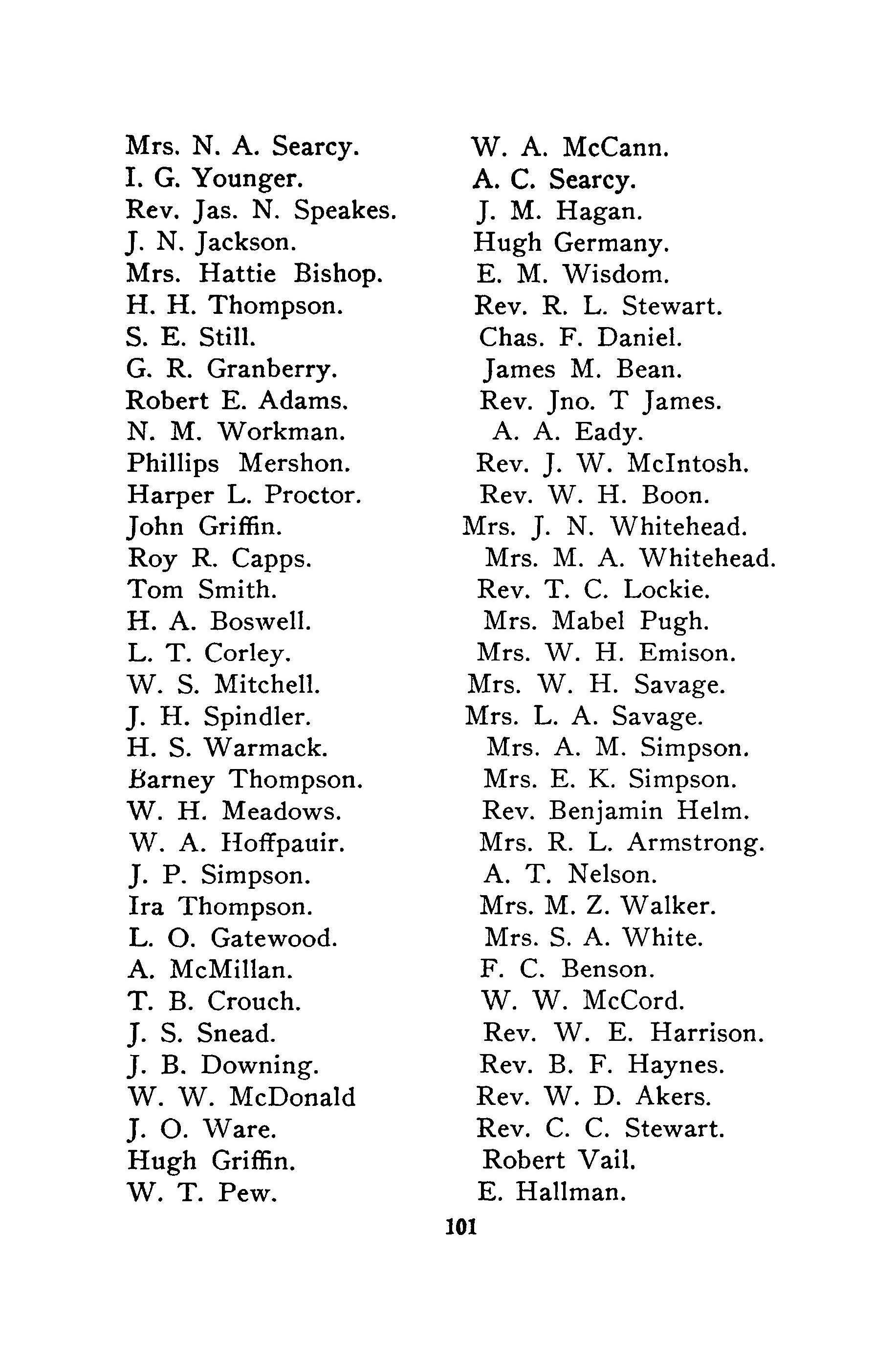
S. E. Still.
G. R. Granberry.
Robert E. Adams.
N. M. Workman.
Phillips Mershon.
Harper L. Proctor.
John Griffin.
Roy R. Capps.
Tom Smith.
H. A. Boswell.
L. T. Corley.
W. S. Mitchell.
J. H. Spindler.
H. S. Warmack.
Barney Thompson.
W. H. Meadows.
W. A. Hoffpauir.
J. P. Simpson.
Ira Thompson.
L. 0. Gatewood.
A. McMillan.
T. B. Crouch.
J. S. Snead.
J. B. Downing.
W. W. McDonald
J. 0. \Vare.
Hugh Griffin.
W. T. Pew.
W. A. McCann.
A. C. Searcy.
J.M. Hagan.
Hugh Germany.
E. M. Wisdom.
Rev. R. L. Stewart.
Chas. F. Daniel.
James M. Bean.
Rev. Jno. T James.
A. A. Eady.
Rev. J. W. McIntosh.
Rev. W. H. Boon.
Mrs. J. N. Whitehead.
Mrs. M. A. Whitehead.
Rev. T. C. Lockie.
Mrs. Mabel Pugh.
Mrs. W. H. Emison.
Mrs. W. H. Savage.
Mrs. L. A. Savage.
Mrs. A. M. Simpson.
Mrs. E. K. Simpson.
Rev. Benjamin Helm.
Mrs. R. L. Armstrong.
A. T. Nelson.
Mrs. M. Z. Walker.
Mrs. S. A. White.
F. C. Benson.
W. W. McCord.
Rev. W. E. Harrison.
Rev. B. F. Haynes.
Rev. W. D. Akers.
Rev. C. C. Stewart.
Robert Vail.
E. Hallman.
C. G. Spindler
A. B. Calk.
S. T. James.
Rev. I. M. Hargett.
Israel H. Baker.
Laurie E. Baker.
Miss Lucie E. Clarkson.
B. H. Scott.
S. G. Porter.
Rev. R. Z. Germany.
Mrs. R. Z. Germany.
Rev. D. G. Vv. Ellis.
D. S. Harmon.
Rev. J. N. Tucker.
Mrs. D. 0. Tucker.
Mrs. N. 0. Gibbs.
Mrs. F. J. Jeffers.
Mrs. J. H. McNelly.
A. J. Overstreet.
Rev. W. W. Voigt.
Rev. W. H. Voigt.
Rev. A. P. Williams.
Rev. W. L. Hamrich.
Rev. W. N. Laymance.
Rev. T. P. Roberts.
Rev. W. H. Arnold.
Rev. S. W. Grant.
T. H. Gillette.
Rev. C. M. Dunaway.
Rev. R. A. Allums.
Rev. H. N. Hill.
Rev. W. W. Brookshire.
Rev. C. W. Beaumont.
Rev. Jas. A. Brownlee.
W. B. Hallman.
S. L. Eady.
D. C. Farmer.
W. J. Micker.
J. N. Flynn.
Rev. C. M. Humphrey.
S. 0. Anderson.
Rev. T. F. Maitland.
J. H. Yeaman.
Mrs. J. H. Yeaman.
Miss Mary Euna Yeaman.
H. A. Wood.
Wm. H. Hughes.
J. H. McKnight.
W. P. R. Talley.
R. M. Fore.
Rev. A. S. Brisco.
W. R. Bowling.
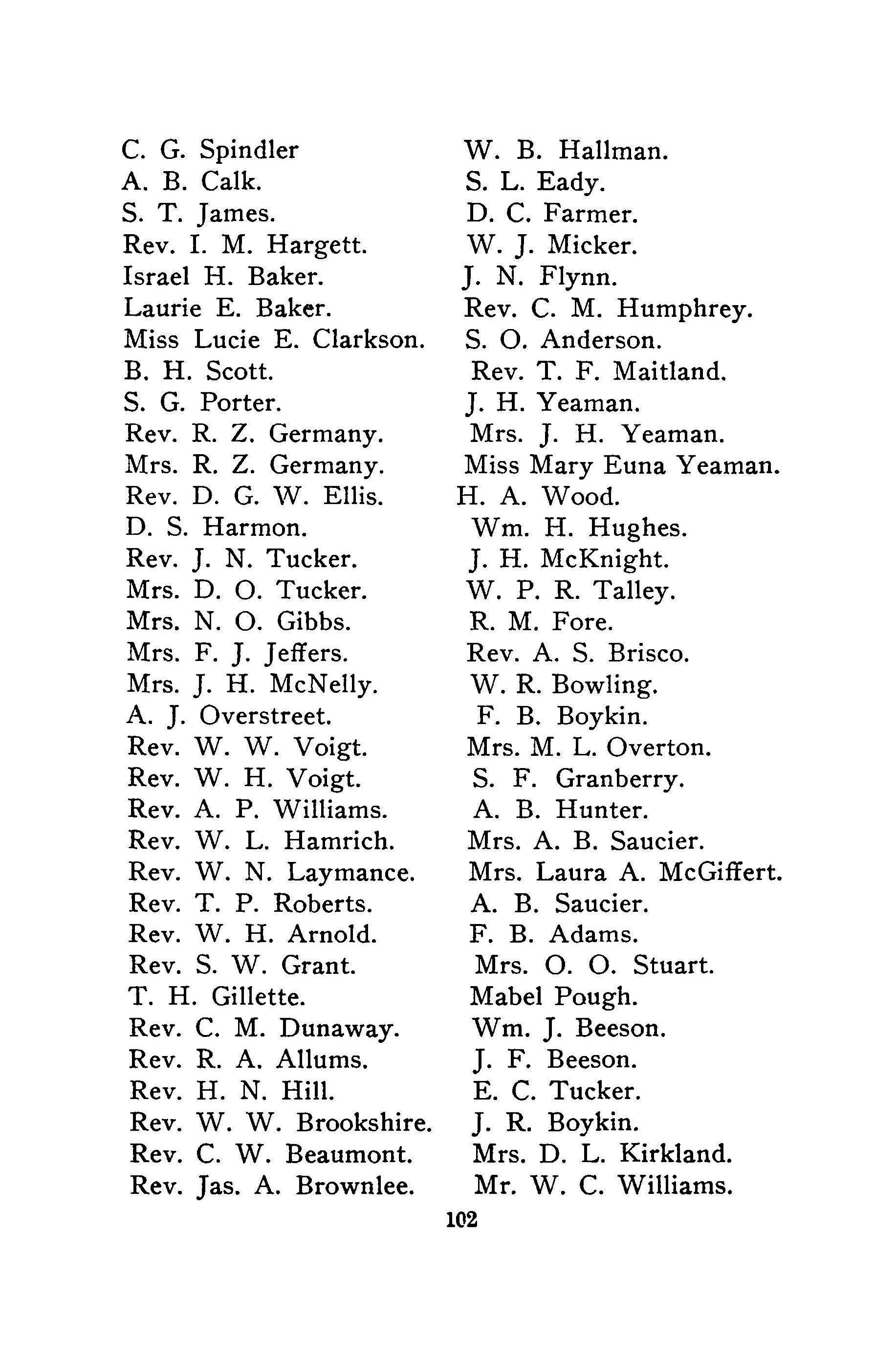
F. B. Boykin.
Mrs. M. L. Overton.
S. F. Granberry.
A. B. Hunter.
Mrs. A. B. Saucier.
Mrs. Laura A. McGiffert.
A. B. Saucier.
F. B. Adams.
Mrs. 0. 0. Stuart.
Mabel Pough.
Wm. J. Beeson.
J. F. Beeson.
E. C. Tucker.
J. R. Boykin.
Mrs. D. L. Kirkland.
Mr. W. C. Williams.
Rev. E. Stanley Jones.
Rev. L. D. Lewis.
W. Dessaw.
Rev. W. P. Gillis.
Rev. J. E. L. Moore.
Rev. John E. Roberts.
D. M. Shelton.
J. F. Bowling
D. P. Boykin.
Mrs. E. A. Decell.
W. P. Decell.
L. N. Brisco.
Rev. Henry Cook.
Miss Lillian Fulcher.
Miss Una Kelley.
Miss Alice Byrd.
Miss Katharine Smith.
C. D. Wimberly.
Mrs. J. D. Brown.
Mrs. D. L. Davis.
Mrs.Mary Maines.
Miss Willie McCaslin.
Mr. C. W. Kinsman.
Mrs. J. W. Outhouse.
Miss Nellie McFadden.
Miss Laura J. Hays.
Mrs. J. W. Haynie.
Mrs. C. H. Bachus.
P. E. Coleman.
Mrs. David Anderson.
Rev. Jas. Hundler.
J. H. Mitchell.
C. J. Sipple.
W. H. Huffstettler.
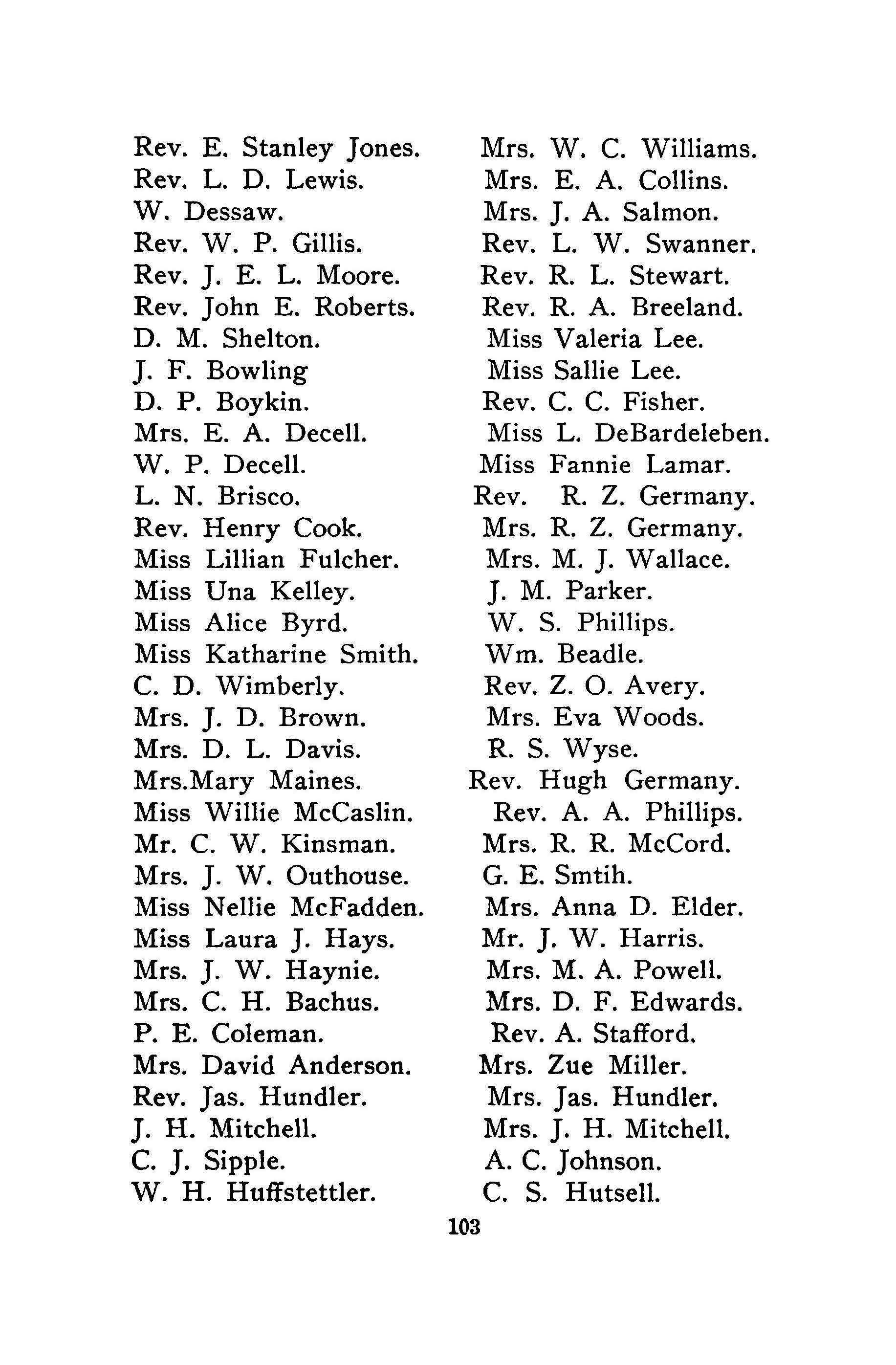
Mrs. W. C. Williams.
Mrs. E. A. Collins.
Mrs. J. A. Salmon.
Rev. L. W. Swanner.
Rev. R. L. Stewart.
Rev. R. A. Breeland.
Miss Valeria Lee.
Miss Sallie Lee.
Rev. C. C. Fisher.
Miss L. DeBardeleben.
Miss Fannie Lamar.
Rev. R. Z. Germany.
Mrs. R. Z. Germany.
Mrs. M. J. Wallace.
J. M. Parker.
W. S. Phillips.
Wm. Beadle.
Rev. Z. 0. Avery.
Mrs. Eva Woods.
R. S. Wyse.
Rev. Hugh Germany.
Rev. A. A. Phillips.
Mrs. R. R. McCord.
G. E. Smtih.
Mrs. Anna D. Elder.
Mr. J. W. Harris.
Mrs. M. A. Powell.
Mrs. D. F. Edwards.
Rev. A. Stafford.
Mrs. Z ue Miller.
Mrs. Jas. Hundler.
Mrs. J. H. Mitchell.
A. C. Johnson.
C. S. Hutsell.
H. C. Maitland.
B. F. Haynes, Jr.
Albert Haynes.
Rev. Cyena H. Ellis.
A. L. Roberts.
Victoria Miller.
Tommie Worthington.
W. A. W erthington.
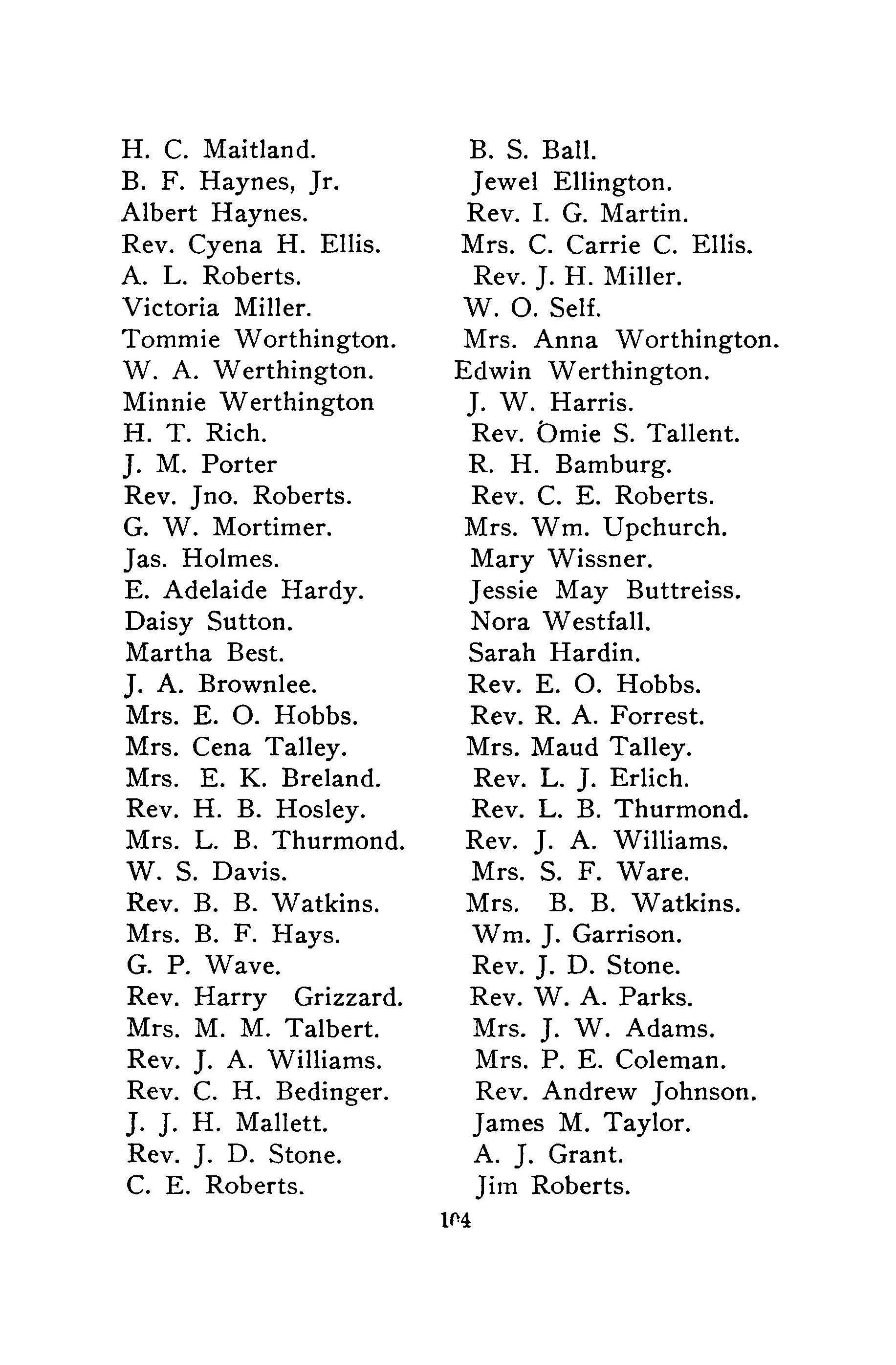
Minnie W erthington
H. T. Rich.
J. M. Porter
Rev. J no. Roberts.
G. W. Mortimer.
J as. Holmes.
E. Adelaide Hardy.
Daisy Sutton.
Martha Best.
J. A. Brownlee.
Mrs. E. 0. Hobbs.
Mrs. Cena Talley.
Mrs. E. K. Breland.
Rev. H. B. Hosley.
Mrs. L. B. Thurmond.
W. S. Davis.
Rev. B. B. Watkins.
Mrs. B. F. Hays.
G. P. Wave.
Rev. Harry Grizzard.
Mrs. M. M. Talbert.
Rev. J. A. Williams.
Rev. C. H. Bedinger.
J. J. H. Mallett.
Rev. J. D. Stone.
C. E. Roberts.
B. S. Ball.
J ewe! Ellington.
Rev. I. G. Martin.
Mrs. C. Carrie C. Ellis.
Rev. J. H. Miller.
W. 0. Self.
Mrs. Anna Worthington.
Edwin W erthington.
J. W. Harris.
Rev. bmie S. Tallent.
R. H. Bamburg.
Rev. C. E. Roberts.
Mrs. Wm. Upchurch.
Mary Wissner.
Jessie May Buttreiss.
Nora Westfall.
Sarah Hardin.
Rev. E. 0. Hobbs.
Rev. R. A. Forrest.
Mrs. Maud Talley.
Rev. L. J. Erlich.
Rev. L. B. Thurmond.
Rev. J. A. Williams.
Mrs. S. F. Ware.
Mrs. B. B. Watkins.
Wm. J. Garrison.
Rev. J. D. Stone.
Rev. W. A. Parks.
Mrs. J. W. Adams.
Mrs. P. E. Coleman.
Rev. Andrew Johnson.
James M. Taylor.
A. J. Grant.
Jim Roberts.
lP-4
Mrs. H. V. Perry.
G. H. Bailey.
Harvey Briggs.
Jno. F. Lesley.
Mrs. S. E. Cooper.
]. T. Butler.
Rev. S. C. Perry.
Mrs. P. E. Coleman.
J. C. Brewington.
Mrs. D. V. Dunningham.
L. M. Perry.
Mrs. M. A. Stafford.
Miss- J. B. Martin.
Mrs. Flora Phillips.
Rev. S. J. Burkey.
Mrs.H. E. Clark.
Mrs. R. M. Cason.
Mrs. M. VanWyck.
Mrs. M. R. M. Clay.
Mrs. H. B. Hosley.
M. S. Shrader.
E. T. Kauffman.
Roy B. Jones.
Mrs. A. R. Amos.
Robt. Waldron.
H. P. Peale.
Miss C. C. Pendleton.
Mrs. Martha Coburn.
Mrs. Jane Stevens.
Mrs. J. B. Rohrer.
Mrs. Mary Rocket.
Mrs. Maggie Jones.
Mrs. L. Cramer.
Rev. D. W. Sweeney.
Rev. J. C. Nelson.
L. J. Baker.
]. H. Jackson.
Mrs. Grace Lesley.
Rev. C. C. Stewart.
Mrs. C. C. Townley.
P. E. Coleman.
Rev. D. E. Bedinger.
Rev. W. M. Hunter.
Rev. D. S. Campbell.
Miss Alice H ugen.
Miss Laura Robertson.
Mrs. J. B. Martin.
Mrs. Jas. M. Taylor.
Rev. H. E. Clark.
Rev. H. P. Meyers.
W. W. Hooten.
J. P. Rooks.
Rev. S. C. Perry.
Miss A. A. Hosley.
J. H. Shrader.
Mrs. E. T. Kauffman.
Mrs. Mary Jones.
F. M. Buckingham.
C. V. Beale.
Frank Bennett.
J. T. Jones.
Mrs. Clara Bennett.
Mrs. Jane Coker.
Mrs. J. E. McEwen.
E. C. Croft.
Miss Etta Trigg.
Joseph H. Penn.
Rev. W. C. Mullen. 105
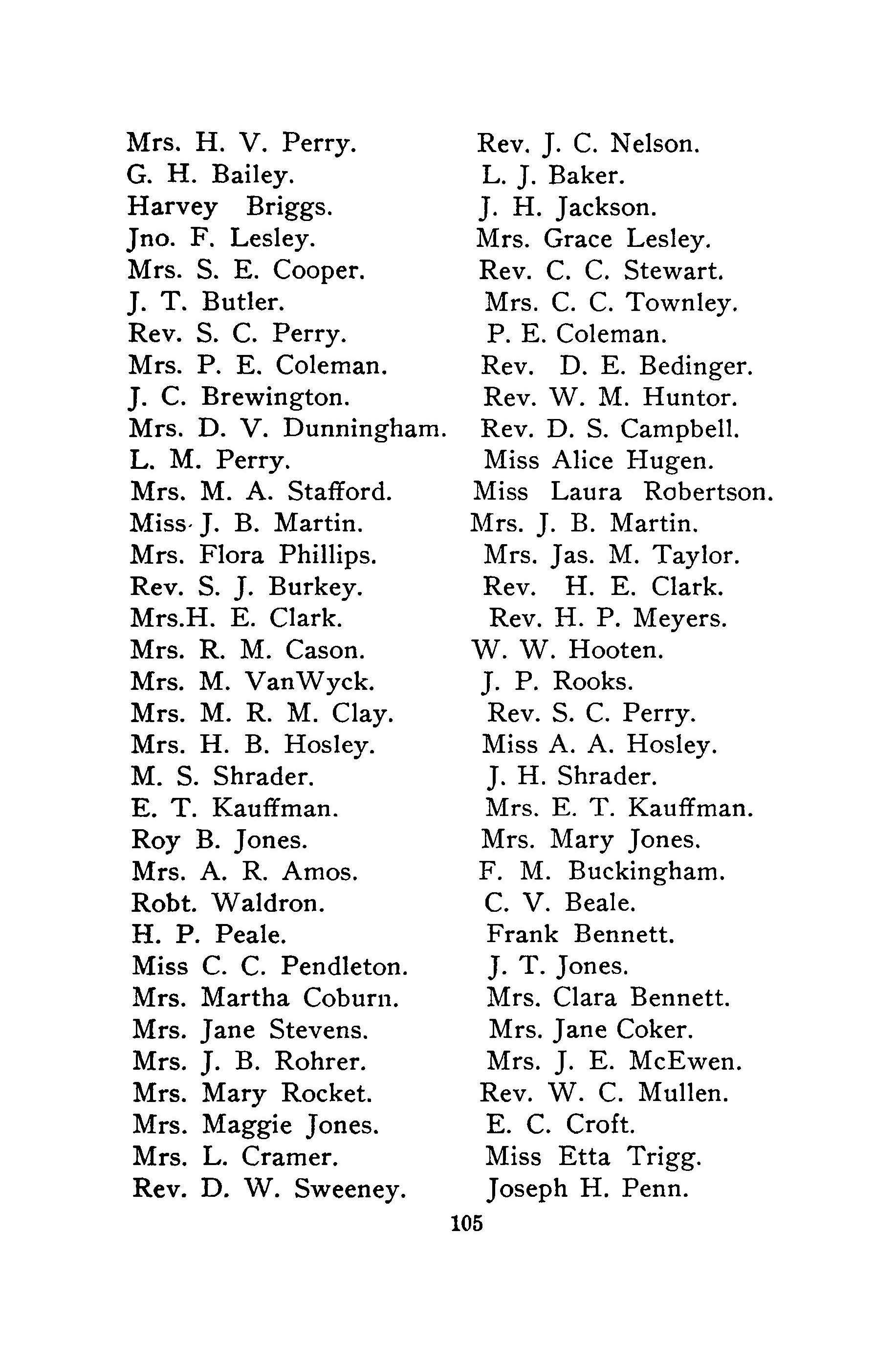
Rev. Wm. L. Stokes.
L. R. Robertson.
Mary Lena Garrett.
Effie Nelson.
Mary Salmon.
Hattie Hart.
Mabel Guess.
Nilah Aust.
D. S. Harmon.
Miss Bertie Goodwin.
Roy H. Kleiser.
Mrs. H. H. Eastland.
C. A. Robinson.
G. W. Adolphus.
Rev. J. B. Kendall.
0. C. Garvey.
Rev. J. C. Nelson.
Rev. Clyde E. Weems.
Rev. S. W. Edwards.
Mrs. W. S. McMannen.
0. B. Dugan.
Fannie McCleskey.
Mrs. S. S. Chandler.
N. B. Spalding.
R. Owen McClure.
Allie Walker.
Miss Julia G. Edwards.
Miss Lulu Kell.
J. W. Hutchins.
Mrs. Mattie Pomeroy.
Miss Annie Manley.
E. M. Roberts.
L. C. Hutton.
Rev. B. B. Watkins.
Alice L. Byrd.
Garrett W. O'N eal.
Bertha Whitley.
Ida Morris.
I vah Deriees.
Rosalie Edwards.
Beulah Heaton.
Nadine McClendon.
Miss Alice M. Payne.
W. I. Davis.
J. 0. VanMeter.
J.C. Lee.
A. W. \V elch.
Lloyd Marlin.
D. M. Williams.
Andrew Johnson, Jr.
Rev. J. H. Mathews.
T. U. Dooley.
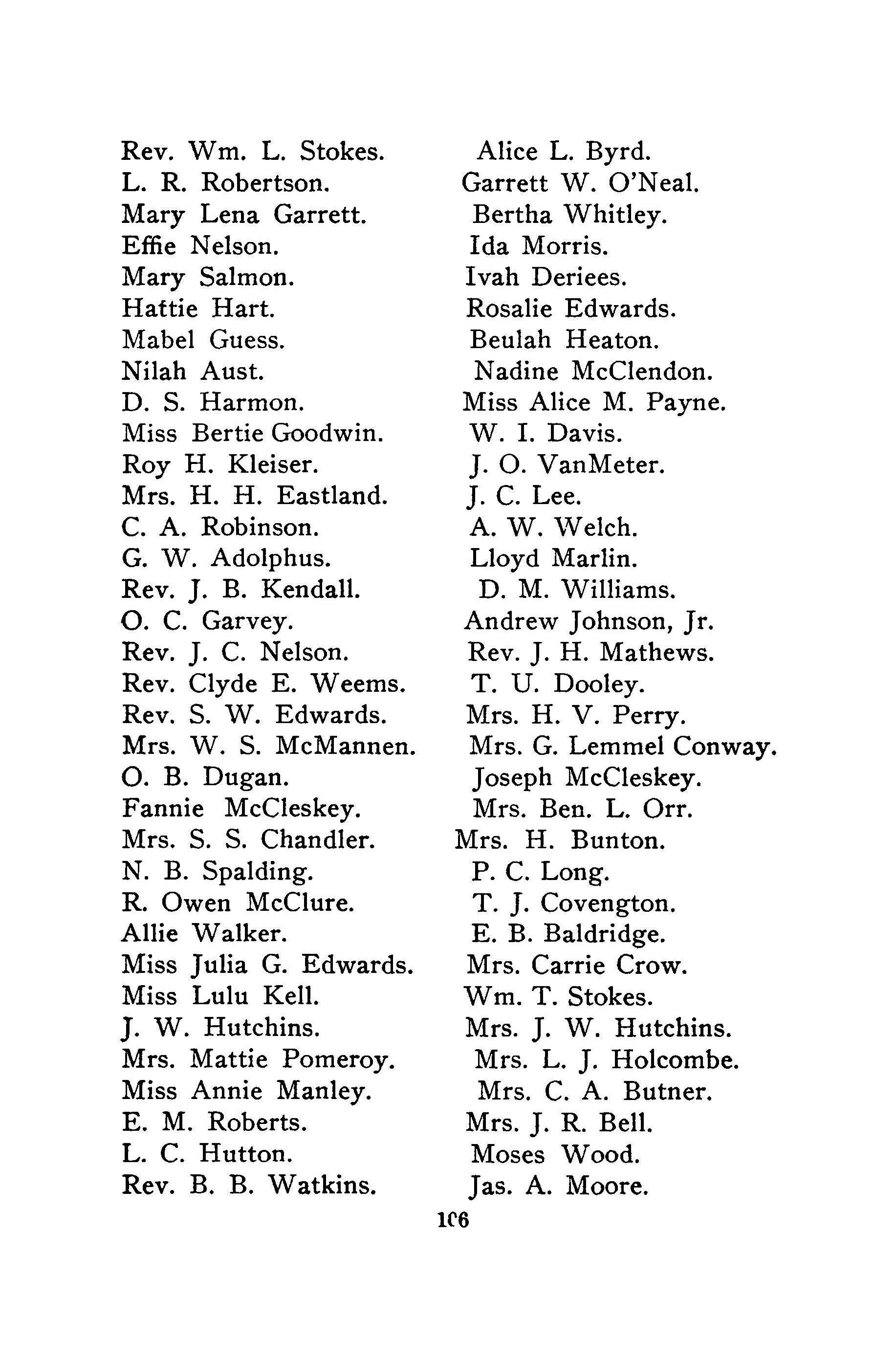
Mrs. H. V. Perry.
Mrs. G. Lemmel Conway.
Joseph McCleskey.
Mrs. Ben. L. Orr.
Mrs. H. Bunton.
P. C. Long.
T. J. Covengton.
E. B. Baldridge.
Mrs. Carrie Crow.
Wm. T. Stokes.
Mrs. J. W. Hutchins.
Mrs. L. J. Holcombe.
Mrs. C. A. Butner.
Mrs. J. R. Bell.
Moses Wood.
Jas. A. Moore.
Rev. G. W. Lewis.
Rev. J. E. Sampley.
J. R. McCord.
Frank McDade.
Mrs. Chauncey L. Foote.
J no. L. Loftis.
Mrs. J. B. Chastain.
Mrs. Florence Bishop.
J. R. Jordan.
A. G. Grant.
E. B. Hycock.
Mrs. T. W. Hardy.
Rev. vV. F. Carlisle.
Rev. \V m. E. Clark.
Miss Edith M. Smith.
Miss Sally Jones.
Geo. M. Mownett.
Mrs. Susie Bettis.
Mrs. J as. House.
A. C. Brooks.
B. W. Oliver.
Mrs. E. E. Cammack.
Mrs. Z ue Miller.
.k.. L. Arnold.
Mrs. T. A. Linville.
Ralph P. Kistler.
Thos. D. Dunn.
J. M. Moncrief.
Miss Olga Spikes.
]. M. Thompson.
T. F. Miller.
M. R. Gimby.
Mrs. J. R. McCord.
Mrs. Nannie Phillips.
Chauncey L. Foote.
Geo. Post Foote.
W. W. Kennington.
W. H. Holcombe.
Miss Ruby Warren.
W. H. Ketchum, Jr.
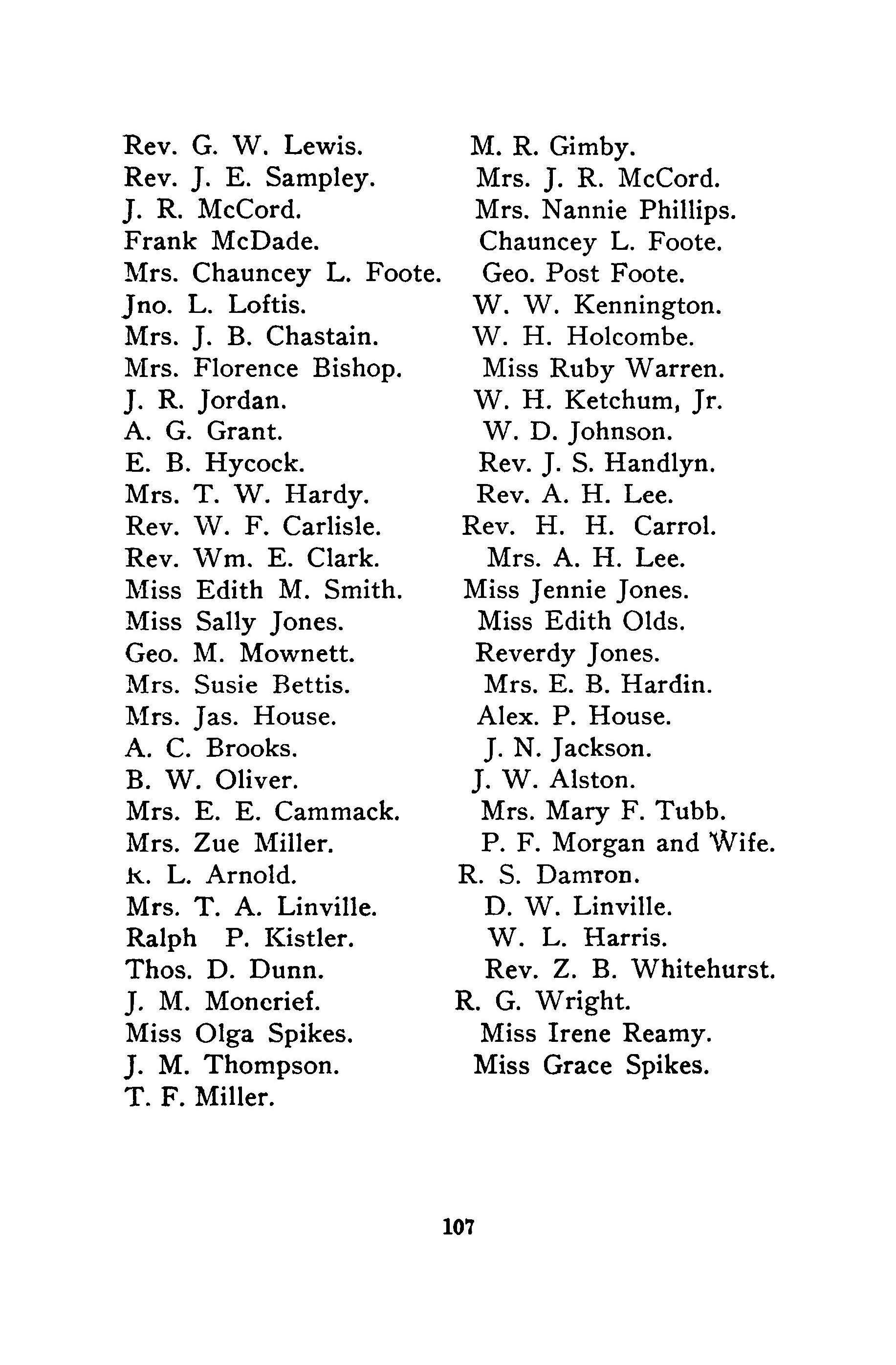
W. D. Johnson.
Rev. J. S. Handlyn.
Rev. A. H. Lee.
Rev. H. H. Carrol.
Mrs. A. H. Lee.
Miss Jennie Jones.
Miss Edith Olds.
Reverdy Jones.
Mrs. E. B. Hardin.
Alex. P. House.
J. N. Jackson.
J. W. Alston.
Mrs. Mary F. Tubb.
P. F. Morgan and Wife.
R. S. Damron .
D. W. Linville.
W. L. Harris.
Rev. Z. B. Whitehurst.
R. G. Wright.
Miss Irene Reamy.
Miss Grace Spikes.
The North Mississippi Holiness Association.
Dr. J. M. Smith, P. & S.
Mrs. Lula Brewer.
Rev. R. I. Collins.
J.M. Shaw.
Mrs. J. M. Shaw.
V. S. McCullar.
Mrs. V. S. McCullar,
J. B. Walker.
Mrs. J. B. Walker.
Mrs. F. M. Harris.
W. L. Walker
Mrs. W. L. Walker.
W. R. Walker.
Mrs. W. R. Walker.
Mrs. W. C. Vicry.
Miss Lee Hight.
Miss Mattie Hight.
W. E. Walker.
Jessie Adams.
Mrs. Jessie Adams.
Miss Ida Perkins.
Mrs. Emma Perkins.
Mrs. H. E. Fly.
Mrs. T. W. Fly.
Mrs. H. 0. Leonard.
Mrs. W. P. Walker.
J. S. Hight.
I. A. Fly.
Miss May McCullar.
OKLl1.HOMA & INDIAN TERRITORY HOLINES ASSOCIATION.
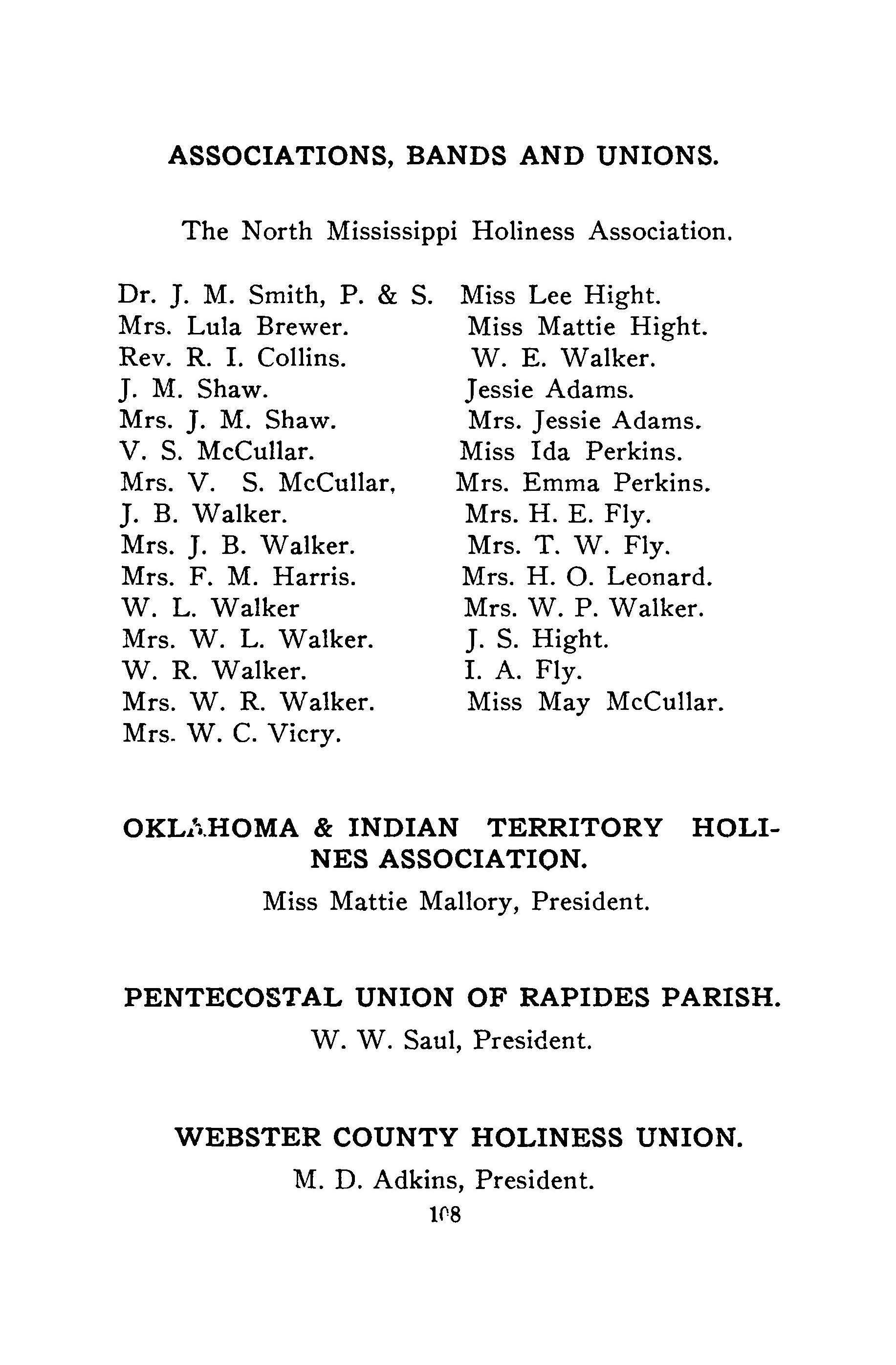
Miss Mattie Mallory, President.
PENTECOSTAL UNION OF RAPIDES PARISH.
W.W. Saul, President.
WEBSTER COUNTY HOLINESS UNION.
M. D. Adkins, President.
tr-8
W. J. Willingham, Treas. and Sec. pro tern.
Will Linder.
W. J. Powell.
J. S. Brookbank. Mrs. Buckner Neeley.
J. B. Bennett. Miss Mattie Hardin.
S. C. Hecks. John Marks.
Reuben Walker. W. R. Mobley.
Mr. Berryhill. Mrs. Mattie Hecks.
Mrs. Kate Linder. Mrs. Will Mobley.
Mrs. Josey Wright. Mrs. Cassie Gregory.
G. vV. Dodson. W. S. Wilkins.

Mrs. H. E. Wilkins. W. A. Midyette.
Mrs. M. C. Taylor. Mrs. E. F. Walker.
Mrs. Annie. Jackson. D. B. Horne.
Mrs. M. A. McDowell. Mrs. L. N. Gorgin.
J. J. Morgain Archie Murrell.
John W. Dearmond. J. A. Hicks.
W. T. Humphrey. J. B. Martin.
Mrs. J. B. Martin. Mrs. Mary Burge.
Mrs. T. L. Smith. W. Bradley.
Mrs. R. Copeland. Mrs. M. Copland.
Mrs. Cally Bradley. Henry Holland.
J ap Elliotte Mat. Plumllee.
Mrs. Harriet Watson. Mrs. Ader Horne.
Rev. Claude A. Roane ................... President.
Janie M. Green .................... Vice-President.
J edidah C. Kines ........................ Secretarv.
Amanda Bywaters ....................... Treasttrt-t'.
James H. Bywaters.
Addie M. Edwards.
James E. Green.
James L. Green.
Odessa L. Green.
Jack Heflin.
Emma Kines.
Bula Kines.
John Morris.
Florence L. Payne.
Lillie Scott.
William A. Edwards.
Mamie Edwards.
Jessie M. Green.
J. Marguerite Green.
Lilian Green.
Bettie Heflin.
Mary Lou Kines.
Frank Luttrell. Mollie Morris. Rev. E. A. Roads, Jr.
Let every reader of these lines make arrangements to attend the Convention at Louisville, Ky., October 23-27, 1907. It promises to be greater than the Atlanta Convention.
Let every Holiness Association, Church, Union, or Band send at least one representative. Pray for the Holiness Union. Remember the place and date: Louisville, Ky., October 23-27, 1907.

J. W. BEBSON, A, M,, PRBBIDBNT, LargestandBest EquippedFallSalvationCollegeIn the World, Said by those who know it best, to be the SAFESTCOLLEGEroaGllll.5 IN THE LAND.
A genuine religious atmosphere a.nd the best of home ID• fiuence. Non-sectarian, open to all denominations. Commodious brick buildings, hot and cold baths, steam heat, electric lights, forty acre campus, mild, delightful climate, healthful location.
VIBW OJI' MAIN BUILDING,
Its patrons have said it ls the lat Cellqe for Yeua• I.Hlulaall tile Soatla.and the Cheapest fer the Aclvantagu Offered:' OVER 500 STUDENTS.
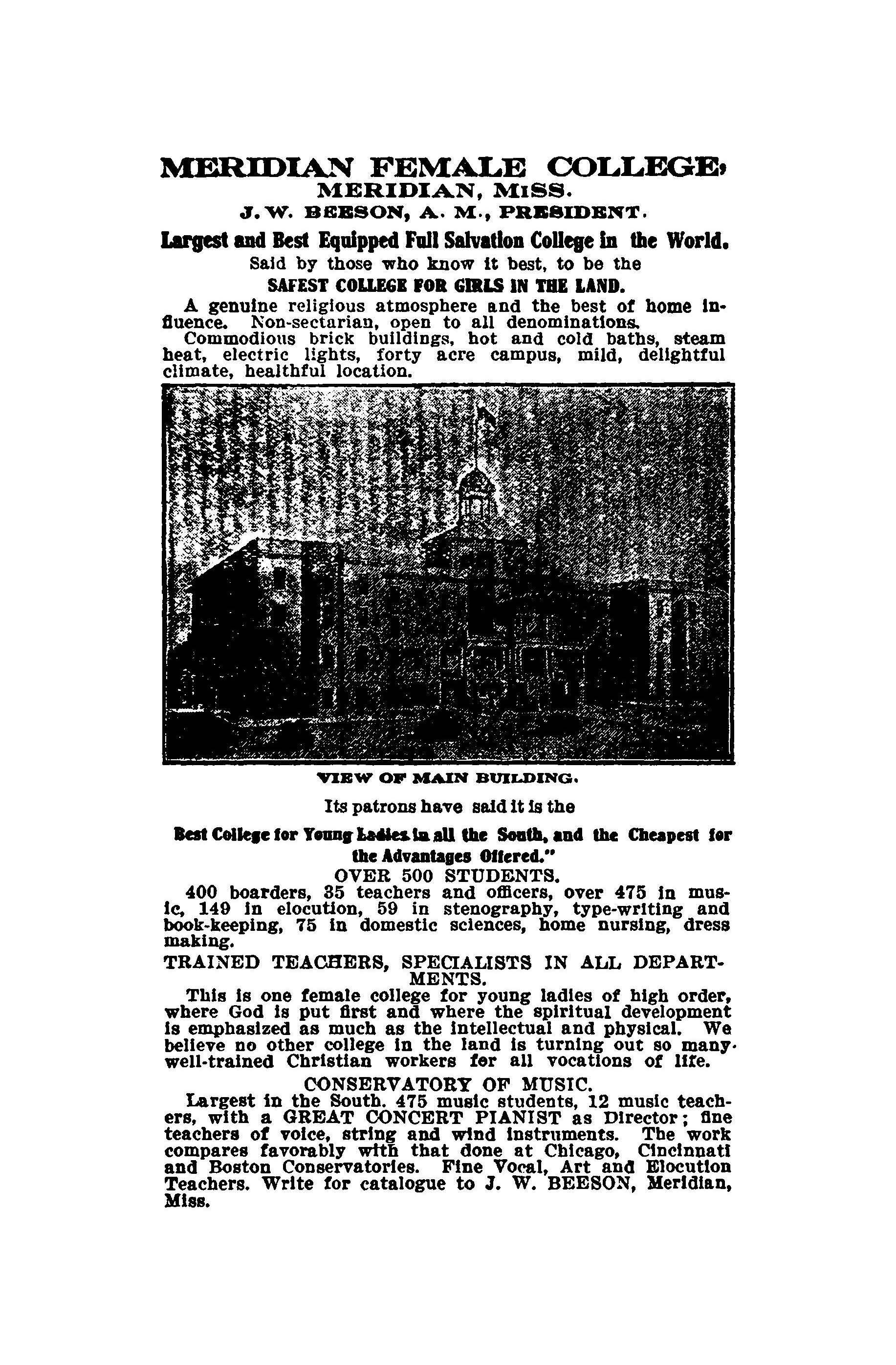
400 boarders, 35 teachers and officers, over 475 In music. 149 Jn elocution, 59 in stenography, type-writing and book-keeping, 75 in domestic sciences, home nursing, dress making, TRAINED TEACHERS, SPECIALISTS IN ALL DEPARTMENTS.
This Js one female college for young ladles of high order, where God is put first and where the spiritual development ls emphasized as much as the intellectual and physical. We believe no other college In the land ls turning out so many, well-trained Christian workers fer all vocations of Ure. CONSERVATORY OF MUSIC.
Largest in the South. 475 music students, 12 music teachers, with a GREAT CONCERT PIANIST as Director; fine teachers of voice, string and wtnd Instruments. The work compares favorably wttli that done at Chicago, Cincinnati and Boston Conservatories. Fine Vo<'8.l, Art an('l Elocution Teachers. Write for catalogue to J. W. BEESON, Meridian, Miss.
IS a volume CtJf1taining a doztn fresh sermons, powerful, fascinating and thriilhlg. E,iclz preacher did kis best, and produced a st:rmon which God had ble3std in times past. 1\hey were prepared especially for this book, none of them ever having been printed before.
Rev. John Paul: Wrestling Jacob.
Rev. C. C. Cary.- A Christian Home.
Rev. A. M. Hills: Resisting the Holy Ghost.
Rev. J. L. Morrill :I Have Played the Fool.
Rev. W. H. Huff: Soul Rest.
Rev. E. A. Fergerson: God's Temple Cleansed and Filled.
Rev. H. W. Bromley: Sampson .
Rev. C. W. Winchester: Christian Perfection.
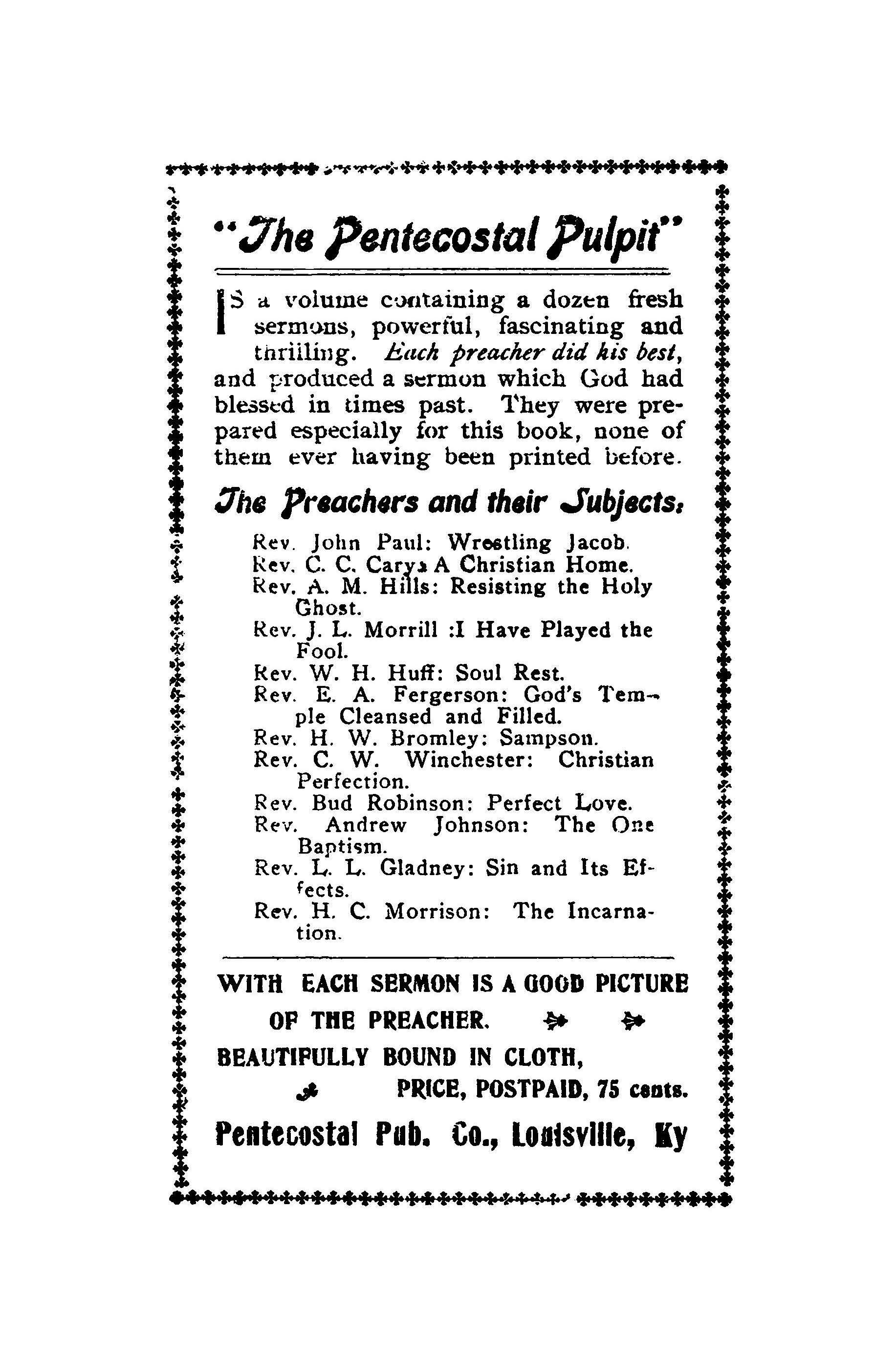
Rev. Bud Robinson: Perfect Love.
Rev-. Andrew Johnson: The One Bapti'>m.
Rev. L. L. Gladney: Sin and Its Effects.
IRev. H. C. Morrison: The Incarnation.
WITH EACH seRMON 1s A ooon PICTURe + OP THE PREACHER. -tt- -tt-
BEAUTIPULLVBOUNDIN CLOTH, PRICE,POSTPAID,75 cents. .

Under the auspices of B. L. Fisher Library, First Fruits Press is an online publishing arm of Asbury eological Seminary. e goal is to make academic material freely available to scholars worldwide, and to share rare and valuable resources that would not otherwise be available for research. First Fruits publishes in ve distinct areas: heritage materials, academic books, papers, books, and journals.
In the Journals section, back issues of The Asbury Journal will be digitized and so made available to a global audience. At the same time, we are excited to be working with several facultymembersondevelopingprofessional,peer-reviewed,onlinejournalsthatwouldbe made freely available.


Much of this endeavor is made possible by the recent gift of the Kabis III scanner, one of the best available. The scanner can produce more than 2,900 pages an hour and features a special book cradle that is speci cally designed to protect rare and fragile materials. The materials it produces will be available in ebook format, easy to download and search.
First Fruits Press will enable the library to share scholarly resources throughout the world, provide faculty with a platform to share their own work and engage scholars without the di culties often encountered by print publishing. All the material will be freely available for online users, while those who wish to purchase a print copy for their libraries will be able to do so. First Fruits Press is just one way the B. L. Fisher Library is ful lling the global vision of Asbury Theological Seminary to spread scriptural holiness throughout the world.
asbury.to/ rstfruits
